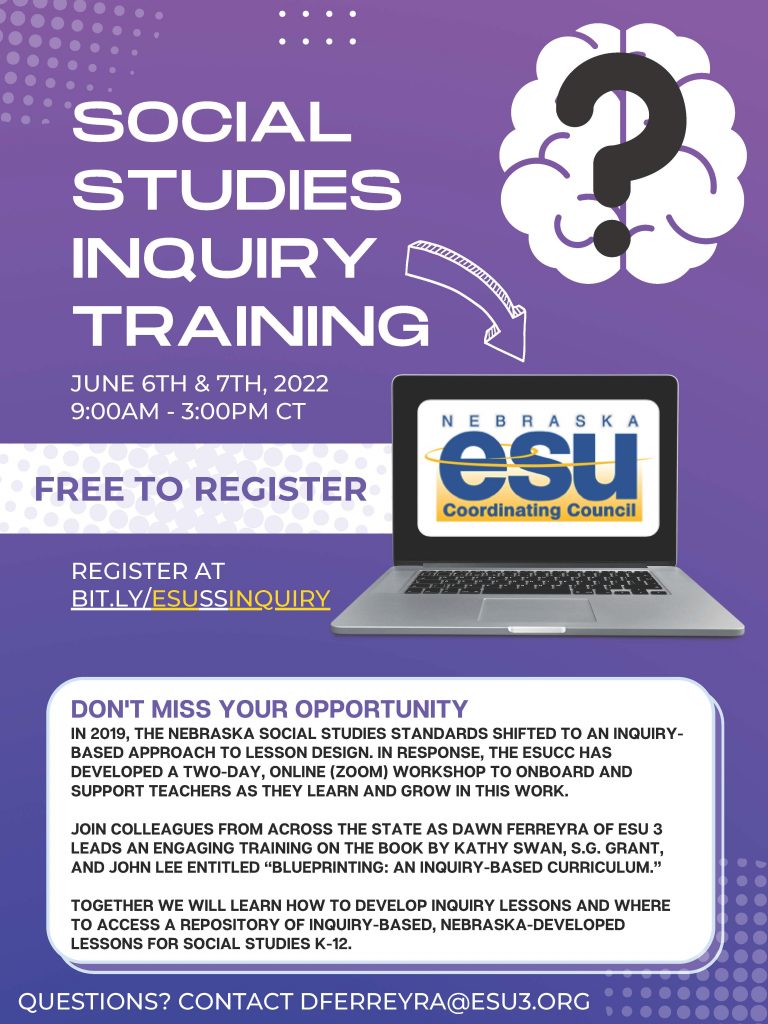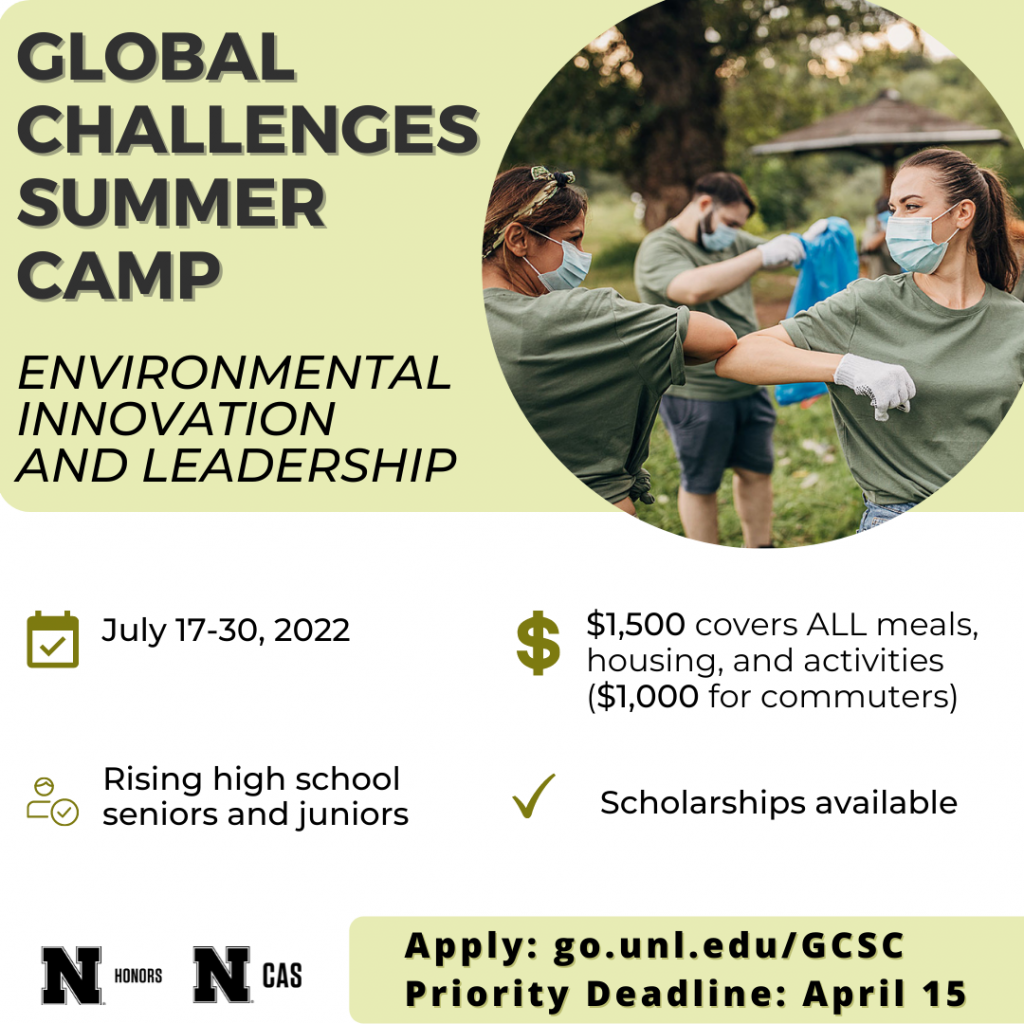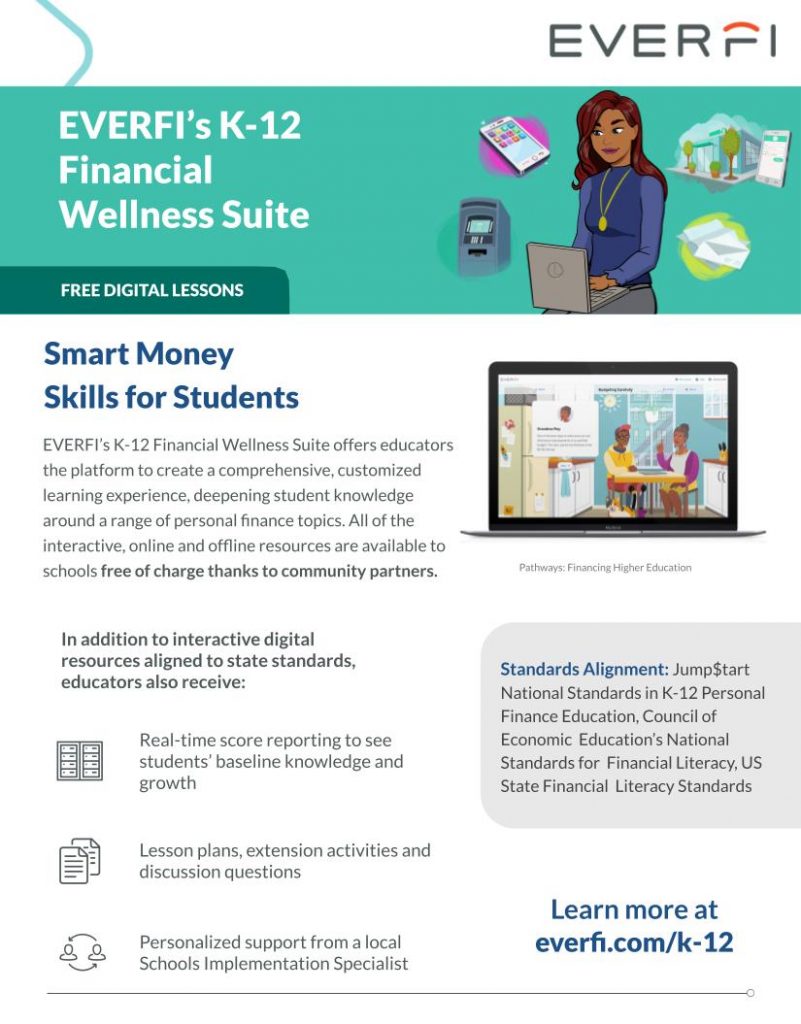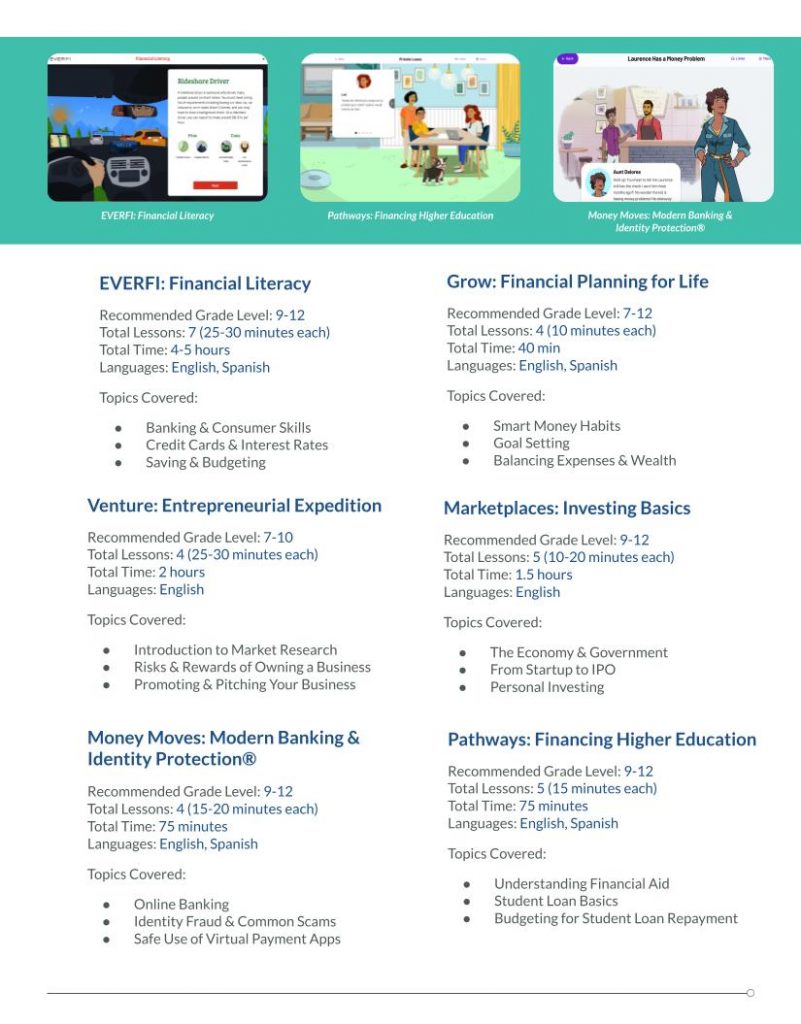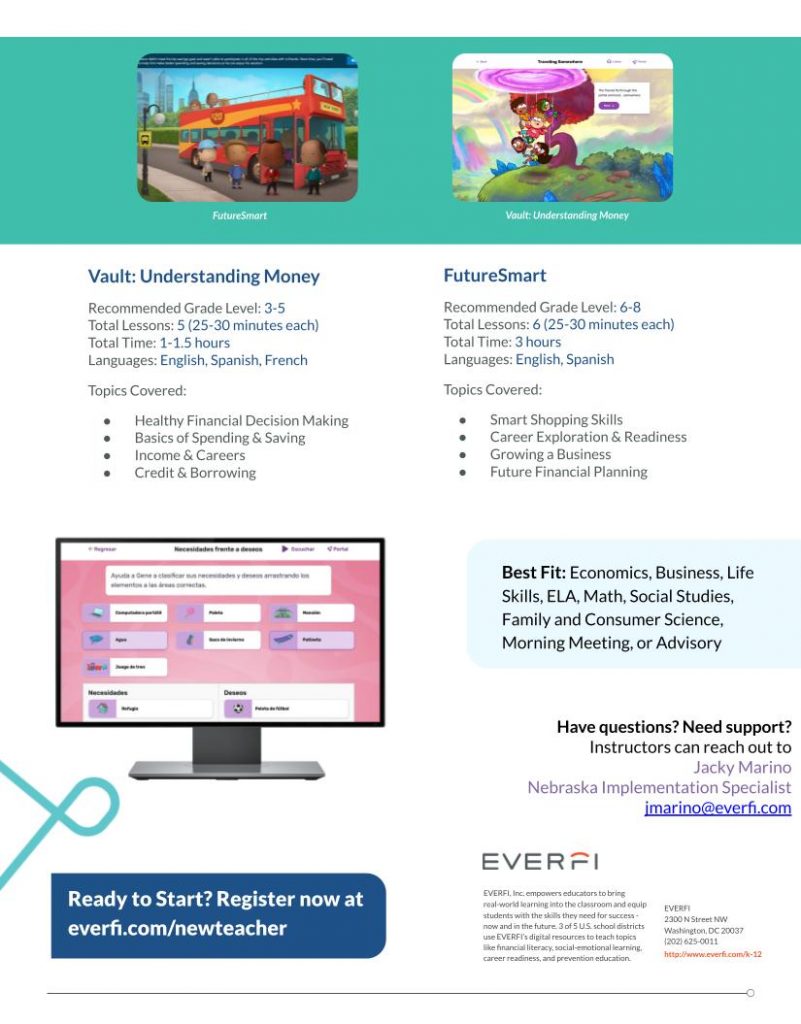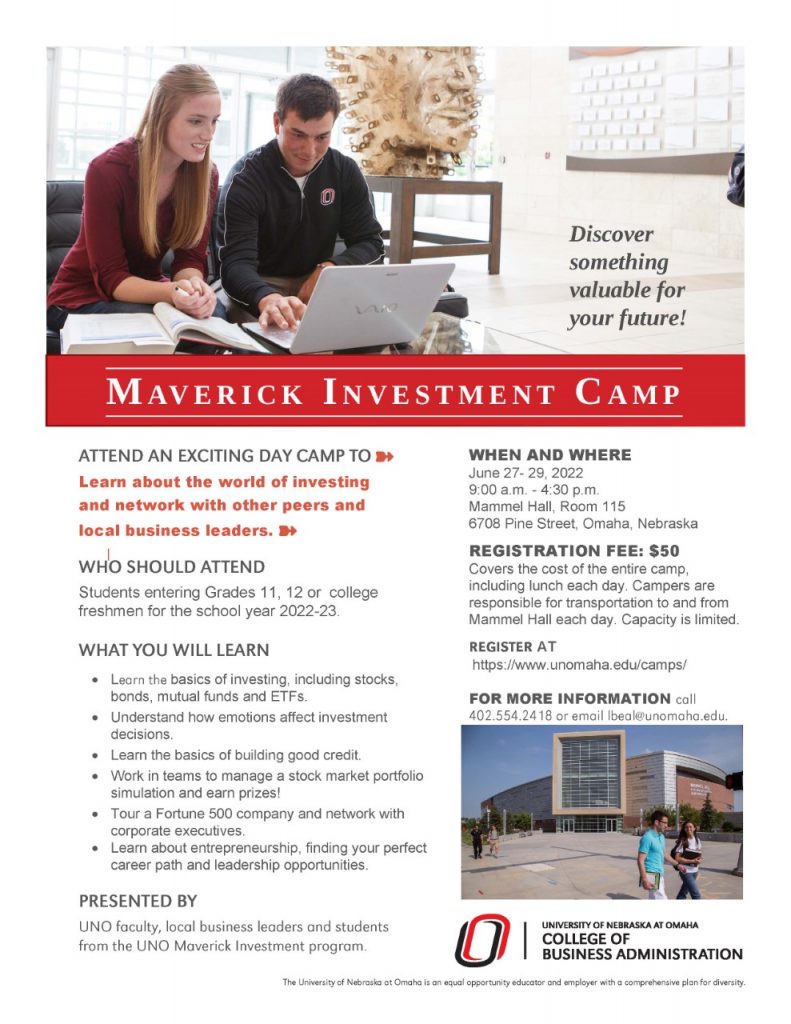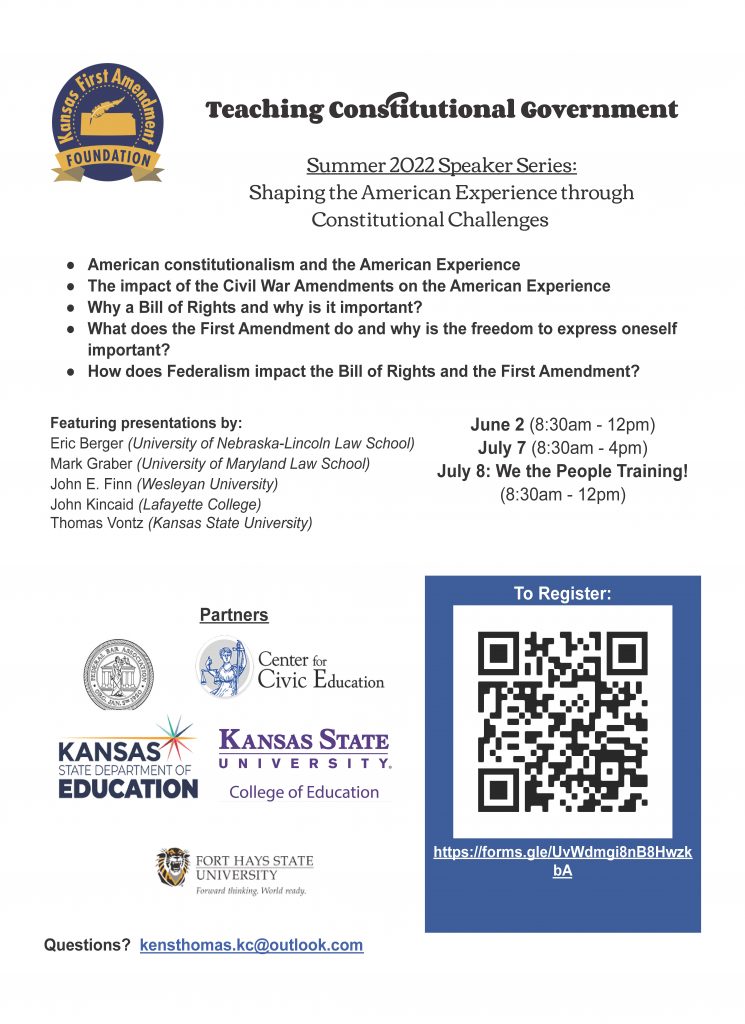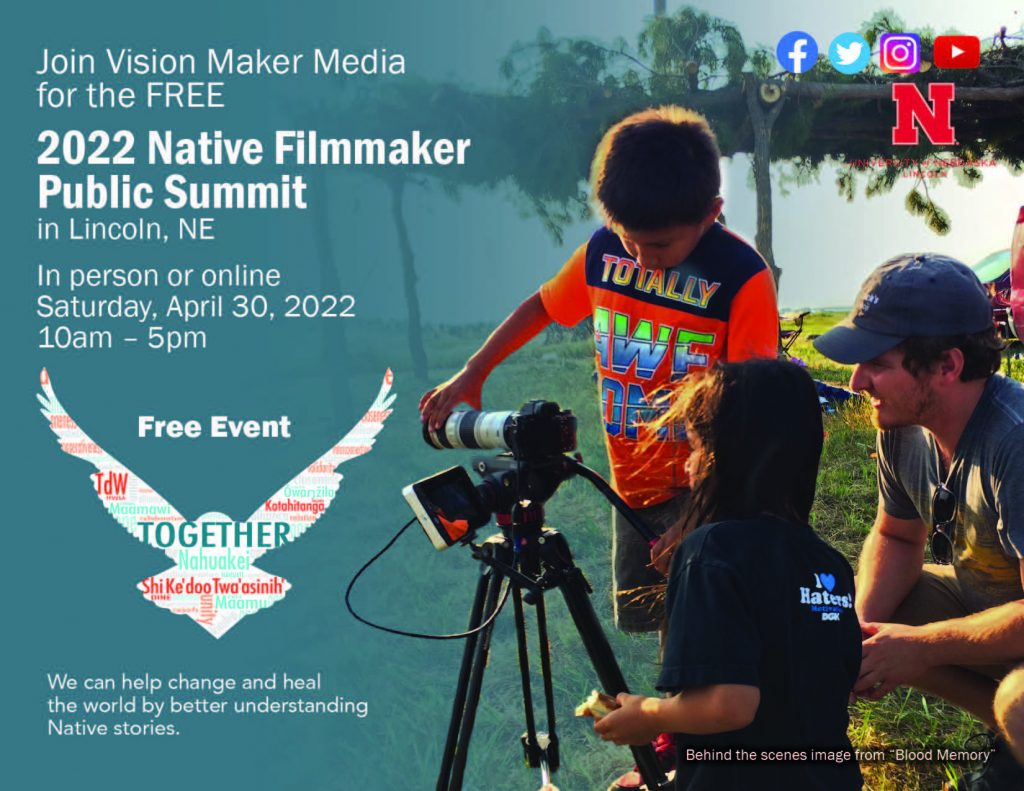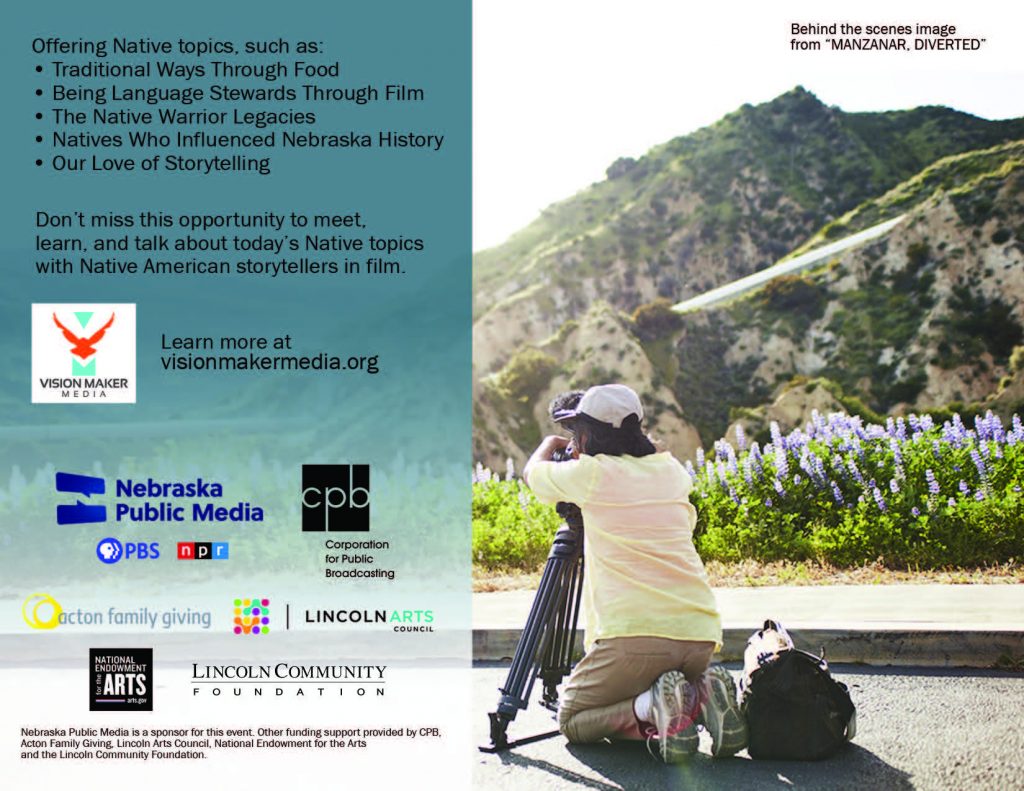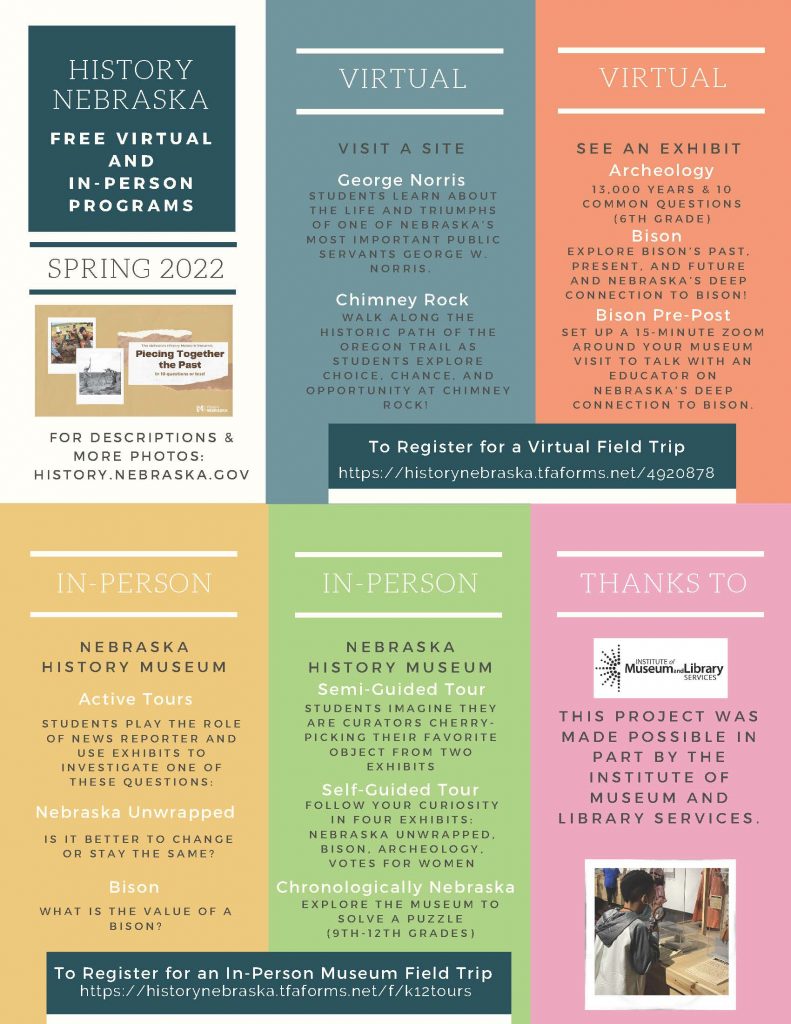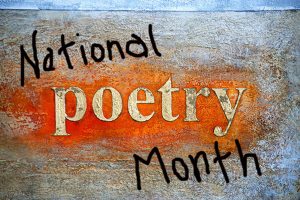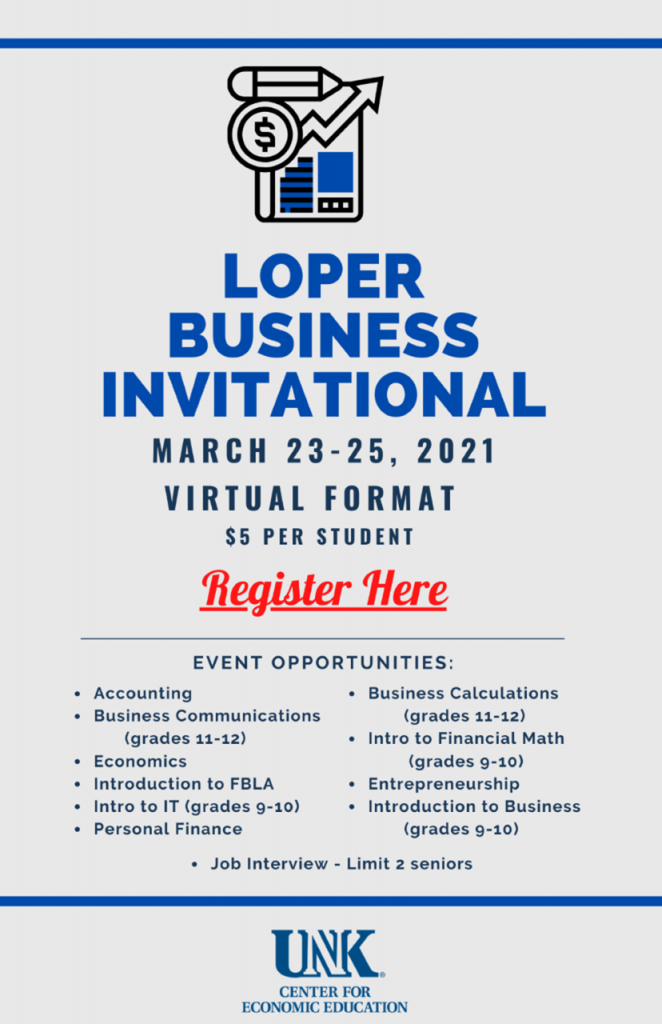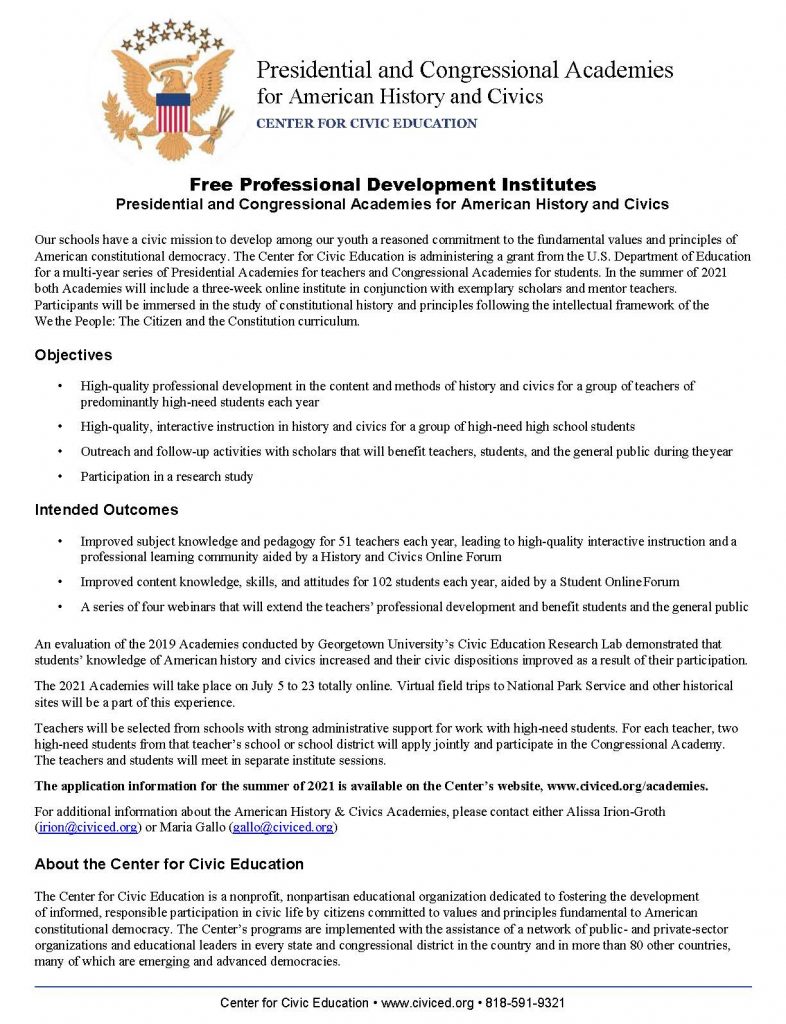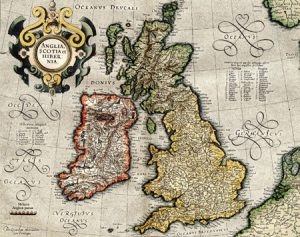May 2022 Newsletter
Another One Bites the Dust! Closing Out the 2021-2022 School Year
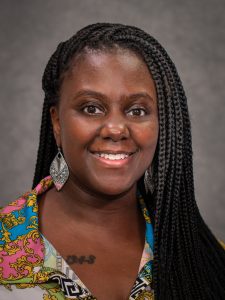 I cannot believe it! Here we are closing out another school year. Each and everyone of you May’ed it! Nebraska social studies educators, you all are a special bunch who keep rising to the occasion. In the past year you all have done some pretty amazing things! You are embracing inquiry, selecting high-quality instructional materials for students, figuring out how to effectively teach multicultural education, and centering civics regardless of the social studies discipline. I have had the pleasure of sharing in this work with educators from across the state of
I cannot believe it! Here we are closing out another school year. Each and everyone of you May’ed it! Nebraska social studies educators, you all are a special bunch who keep rising to the occasion. In the past year you all have done some pretty amazing things! You are embracing inquiry, selecting high-quality instructional materials for students, figuring out how to effectively teach multicultural education, and centering civics regardless of the social studies discipline. I have had the pleasure of sharing in this work with educators from across the state of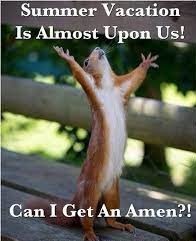 Nebraska, including Oshkosh, Ainsworth, Shickley, Wakefield, and all of the places in between. You all have reached out to me with your questions, concerns, and hopes for the future. This year has not been without its own challenges and I am just so stinkin’ proud of how social studies educators have handled them all! In the coming school years, I look forward to all that you all will continue to do for Nebraska students.
Nebraska, including Oshkosh, Ainsworth, Shickley, Wakefield, and all of the places in between. You all have reached out to me with your questions, concerns, and hopes for the future. This year has not been without its own challenges and I am just so stinkin’ proud of how social studies educators have handled them all! In the coming school years, I look forward to all that you all will continue to do for Nebraska students.
Just as last year, the newsletter will pause during the summer months. This should be a time of rest, relaxation, and time spent with loved ones. You do not need me bombarding you with more information. Because the monthly newsletter will pause in June and July, I have jam packed this month’s outreach with as much as I could! I hope you find the resources helpful. Enjoy your summer break and we will chat again!
All my best, wishing you and yours the best summer vacation ever!
-Ebony
New Social Studies Vision and Mission Statements
Did you know that it has been almost thirty years since the vision and mission statements for social studies in Nebraska have been updated? According to opengrowth.com, “A vision and mission is important for strategic direction. It helps everyone within an organization know the purpose of its existence and core values on which it is governed. It is an integral part that helps to set priorities and ensure that everyone is working towards common goals and objectives, thus providing a road-map to the future.”
The new vision and mission for Nebraska have been developed through a collaborative effort with educators and ESU personnel throughout the state. So, without any further delay, I now present to you our NEW Nebraska Social Studies Vision and Mission Statements!
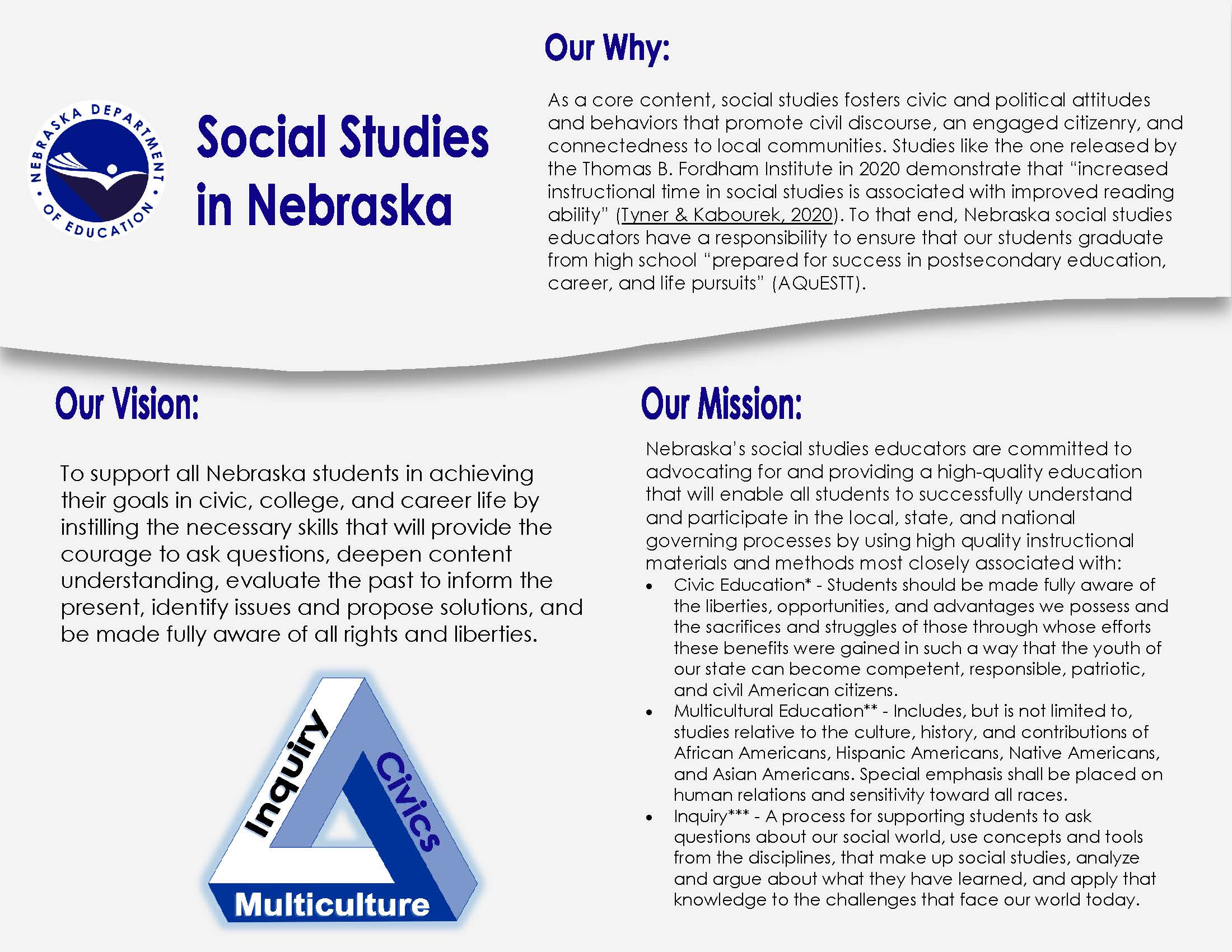
Nebraska Social Studies Podcast!
Guess what?! Nebraska social studies has its own podcast! The name of the podcast is “Social Responsibilities” and features two Nebraska social studies educators. “Social Responsibilities” highlights the work around inquiry-based learning as a lever for using high-quality instructional materials.
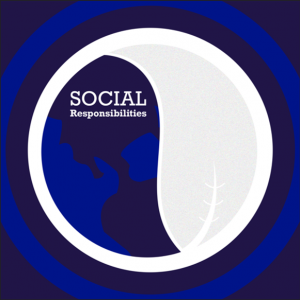 There are a couple of things that many of us have come to expect from social studies education. The first is promoting the rights, ideals, liberties, and principles that our country has come to value. The second is the high importance that we place on text and other instructional materials. This podcast seeks to serve as an opportunity for social studies educators to rediscover the importance of high-quality instructional materials (HQIM’s). We seek to help teachers envision a world in which they can properly identify and choose HQIMs rather than always making their own materials from scratch. We offer a look into how to curate and teach documents that embrace multicultural education and multiple perspectives. We hope that through this process, educators can start believing that HQIMs can be a lever for equity, and as inquiry gains popularity as an instructional method (as it should), our goal is to reiterate the framing and rationale for using high-quality instructional materials to deepen both students’ use of inquiry and use those skills closely associated with social studies like contextualization, corroboration, and understanding multiple perspectives.
There are a couple of things that many of us have come to expect from social studies education. The first is promoting the rights, ideals, liberties, and principles that our country has come to value. The second is the high importance that we place on text and other instructional materials. This podcast seeks to serve as an opportunity for social studies educators to rediscover the importance of high-quality instructional materials (HQIM’s). We seek to help teachers envision a world in which they can properly identify and choose HQIMs rather than always making their own materials from scratch. We offer a look into how to curate and teach documents that embrace multicultural education and multiple perspectives. We hope that through this process, educators can start believing that HQIMs can be a lever for equity, and as inquiry gains popularity as an instructional method (as it should), our goal is to reiterate the framing and rationale for using high-quality instructional materials to deepen both students’ use of inquiry and use those skills closely associated with social studies like contextualization, corroboration, and understanding multiple perspectives.
Yes, the podcast is about instructional methods and materials, but we aimed to create an engaging experience with a couple of laughs and some lighthearted conversation throughout. Stream from all of the major platforms and please download, listen and share! And if you have any questions, send us an email or visit the Social Responsibilities Podcast webpage!
2022 Summer Professional Development Opportunities in Social Studies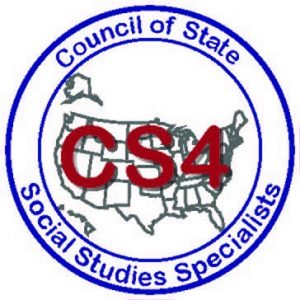
This document was compiled by the Council of State Social Studies Supervisors as a way to communicate the wealth of professional development opportunities available to social studies educators. A special thanks to all of the organizations who helped contribute to this work and to the many organizations who are offering high quality social studies professional development for social studies teachers across the country. Many of the opportunities below are offered free or low cost, but some opportunities do have a cost. When opportunities are highlighted in yellow, it means there are not yet 2022 updates for that particular program. The document will be updated through the spring of 2022. Please email Stefanie Wager at stefanie.rosenbergwager@gmail.com with any questions, comments, or to add programs to this list.
Nebraska Social Studies Inquiry Training
UNL Global Challenges Summer Camp: Environmental Innovation and Leadership (Student Opportunity)
Catherine G. Jurgemeyer Memorial Scholarship (Student Opportunity)
Since 1958, the American Lawyers Alliance has been recognizing excellence in Law-Related Education by presenting our annual Law-Related Education Teacher of the Year Awards to the nation’s top civics teachers, our Judicial Civic Education Award to a dedicated jurist for his or her work in promoting Law-Related Education, and individual awards to those whose excellent work has fostered the furtherance of Law-Related Education.
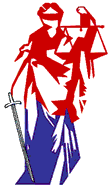 Now we are most excited to announce our newest award:
Now we are most excited to announce our newest award:
The $10,000 Catherine G. Jurgemeyer Memorial Scholarship
The purpose of this scholarship is to reward one deserving high school senior whose body of work, both inside and outside the classroom, has demonstrated a special dedication to Law-Related Education with academic excellence.
The requirements of this reward are quite rigorous, and we are looking for that outstanding student who meets or exceeds the criteria and deserves to be recognized. We would like your help in getting the word out about this new scholarship, so please forward this information to your students, peers, colleagues, college counselors, or whomever you feel may know of such a deserving student.
The application deadline is May 31, 2022, the winner will be announced no later than July 1, 2022, and the presentation will be made at our ALA Annual Meeting in Chicago in early August, so time is of the essence!
Please contact me if you have any questions. Thank you for all you do for law-related education. I look forward to seeing many excellent applications!
Most sincerely,
Noel Roberts
Capitol Forum on America’s Future

Join the statewide program that engages students in key global issues and current events.
Capitol Forum on America’s Future
Presented by Humanities Nebraska and the Office of Nebraska Secretary of State Bob Evnen.
Using the Choices Curriculum from Brown University, made available to Nebraska teachers at no cost by Humanities Nebraska, you can empower your students to become engaged, informed citizens.
As your students learn about international trade, terrorism, immigration, nuclear proliferation, and climate change, this program can instill in them the power to hold thoughtful conversations and make education decisions.
Benefits to students:
- Develop critical thinking skills
- Understand foreign policy and current events
- Cultivate deliberative techniques and skills in civil discourse
- Discuss important issues with peers from throughout the state as well as with Nebraska’s elected officials
Benefits to Teachers/Schools:
- High-quality Choices curriculum units, including two of the teacher’s choice, for semester or year-long study
- Professional development through workshops with an expert in one of the five Capitol Forum themes
- Outstanding professional learning community with other social studies teachers from across Nebraska
- Travel costs (including lodging, if applicable) for teachers and a delegation of up to five students
- Substitute teacher pay reimbursement to school
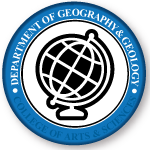 opportunity open to present and perspective secondary social studies teachers. Participants will meet with experienced staff and colleagues from around Nebraska to learn about how to implement Dual-Enrollment Geography or AP® Human Geography into their own schools. This opportunity will take place either Tuesday July 12th, or Tuesday July 19th at the UNO campus. Participants will receive lesson ideas, information on how to be certified for AP® and Dual Enrollment, and a $100 stipend for participating.
opportunity open to present and perspective secondary social studies teachers. Participants will meet with experienced staff and colleagues from around Nebraska to learn about how to implement Dual-Enrollment Geography or AP® Human Geography into their own schools. This opportunity will take place either Tuesday July 12th, or Tuesday July 19th at the UNO campus. Participants will receive lesson ideas, information on how to be certified for AP® and Dual Enrollment, and a $100 stipend for participating.
Please contact Kyle Tredinnick (ktredinnick@unomaha.edu) with any questions!
Econ Book Club
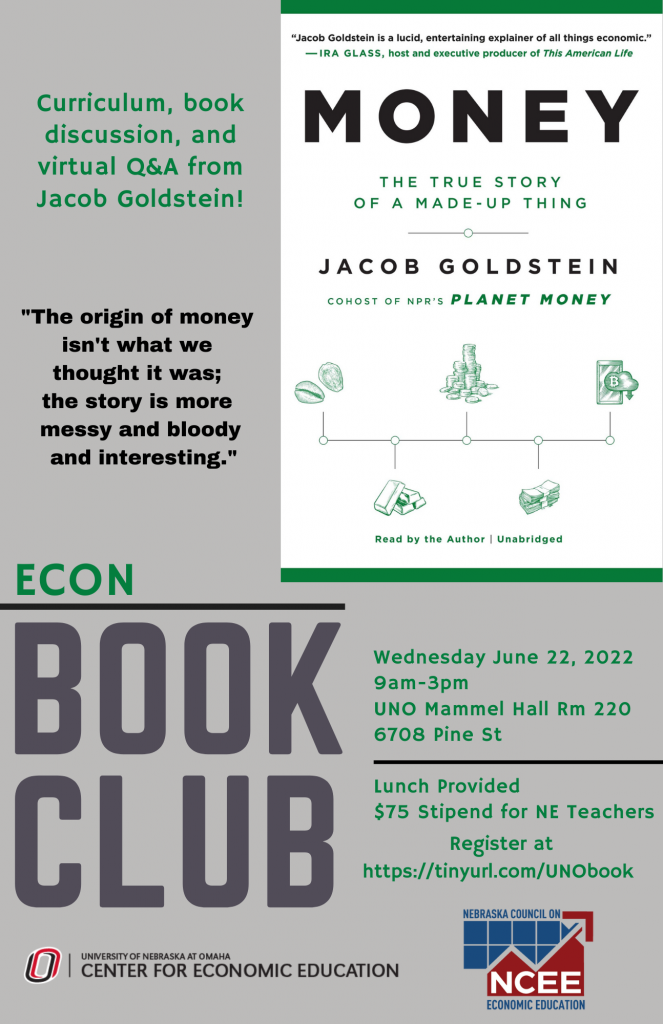
Asian American, Native Hawaiian, and Pacific Islander Heritage Month Teacher Resources
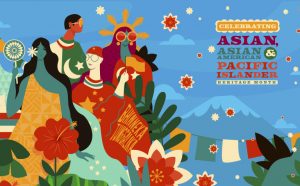 May is Asian American, Native Hawaiian, and Pacific Islander Heritage Month and we are celebrating the histories of Americans from the Pacific Islands and the continent of Asia! “As of 2019, there were about 22.9 million people of Asian or Pacific Islander descent in the United States. According to the Pew Research Center, AAPI people are a diverse and growing population that make up about 7 percent of the total U.S. population. The effort to officially recognize Asian American and Pacific Islander contributions to the United States began in the late 1970s, and took over 10 years to make it a permanent month-long celebration.”
May is Asian American, Native Hawaiian, and Pacific Islander Heritage Month and we are celebrating the histories of Americans from the Pacific Islands and the continent of Asia! “As of 2019, there were about 22.9 million people of Asian or Pacific Islander descent in the United States. According to the Pew Research Center, AAPI people are a diverse and growing population that make up about 7 percent of the total U.S. population. The effort to officially recognize Asian American and Pacific Islander contributions to the United States began in the late 1970s, and took over 10 years to make it a permanent month-long celebration.”
Below are resources for educators wanting to incorporate AANPI instructional materials in their classrooms.
Teaching Resources:
- Asian American and Pacific Islander Heritage Month (Library of Congress)
- Celebrate Asian American Pacific Islander Heritage Month (PBS)
- Asian American and Native Hawaiian, Pacific Islander Heritage Month (NPS)
- >31 Ways to Celebrate AAPI Heritage Month in 2022 (Asia Society)
- Asian Pacific American History (Smithsonian Learning Lab)
- Asian Pacific American Booklist (Colorin’ Colorado)
- AANHPI Resources (Federal Asian Pacific American Council)
- Resources for Asian American and Pacific Islander Heritage Month (Pear Deck)
Journals, Publications, and Articles:
- Social Education: Teaching and Learning about Asian American History (March/April 2022). Social Studies and the Young Learner: Asian American Narratives in U.S. History and Contemporary Society (January/February 2022).
- Social Studies and the Young Learner: The Voices of Children: Re-imagining the Internment of Japanese Americans through Poetry.
Exhibits:
- Smithsonian Asian Pacific American Center: Smithsonian APA Center Homepage.
- Smithsonian Institute: Righting a Wrong: Japanese Americans and World War II.
Videos:
- Library of Congress: Asian Pacific American Heritage Month: Featured Videos; Selected Audio and Video.
- National Museum of American History: Stories of Racism, Resilience, and Resistance in Asian American Communities.
- Smithsonian Institute: Featured Videos for Asian Pacific American Heritage Month.
Podcasts
- Visions of Education: Episode 160: An AsianCrit Perspective on U.S. History with Sohyun An.
- Visions of Education: Episode 76: Teaching Asian-American Histories with Noreen Naseem Rodriguez.
NCSS Introduces the Seal of Civic Readiness Toolkit and Celebrates #Civics4CommUNITY Week
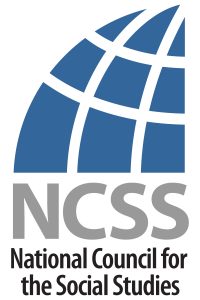 To help ensure the longevity of our democracy, National Council for the Social Studies (NCSS) encourages the creation of a civics diploma seals program in your state, district, or school. We have created a modular Seal of Civic Readiness Toolkit with timelines, frequently asked questions, creation steps, and advocacy tips. The toolkit will help your school create, implement, and adopt the seal for usage.
To help ensure the longevity of our democracy, National Council for the Social Studies (NCSS) encourages the creation of a civics diploma seals program in your state, district, or school. We have created a modular Seal of Civic Readiness Toolkit with timelines, frequently asked questions, creation steps, and advocacy tips. The toolkit will help your school create, implement, and adopt the seal for usage.
Why Should We Teach Civics? Why Should I Adopt a Civics Diploma Seals Program?
Democracy by nature requires an informed and engaged electorate. Research tells us that it is critical that students participate in civic learning that includes:
- the 21st-century skills of collaboration, cooperation, and consensus-building;
- an understanding of the rights and responsibilities of citizenship; and
- knowledge on the roots of our democracy.
Civics diploma seals are tangible symbols of the value of comprehensive and research-based civic education practices in schools. A diploma seal is an endorsement that indicates exemplary performance in a specific area of study, and a civics diploma seal can signify a student’s competency in civic knowledge, responsibility, values, and engagement. Seals send a signal to colleges and employers that a student has excelled in an area of study.
Local education agencies can also take great pride in the number of diploma seals that are awarded to students, and diploma seals can serve as an accountability measure for school effectiveness, and a way to encourage parents and the public to support civic education.
EVERFI’s Financial Wellness Suite
Maverick Investment Camp (Student Opportunity)
The OER Conference for Social Studies
Mark your calendar, the third annual OER Conference for the Social Studies (OC for SS) arrives August 3–4, 2022! Since 2020, the OC for SS has become one of the biggest professional development events for social studies teachers in America, bringing thousands of teachers from across the country together to learn and grow. 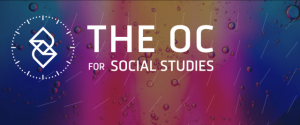
A free, virtual experience for K–12 educators, OC for SS is the best place to connect with leaders in the field and equip yourself for the challenges of today’s classrooms.
Past keynotes have included author John Green; social justice activist Bryan Stevenson; and journalist and historian Jill Lepore. We’ll be announcing this year’s lineup of influential speakers over the next few months, plus details about clock hours, our pre-conference book club, and our slate of Track Talk videos.
The OER Conference will also feature Track Talks. Track Talks are short TED-style videos recorded by leading educators on the topics you need to know about as an educator. We will be gradually releasing these videos in the weeks leading up to the conference to give you time to check them all out, and discuss them in the conference discussion forum ahead of the event.
We’d love to go on, but there’s plenty more work on our end to get this year’s OC for SS ready for you! We can’t wait to see you in August—reserve your spot now!
Onsite Professional Development in Jackson Hole, WY: Using Project Citizen to Promote Civic Engagement
 For any Nebraska educator interested, here are a few opportunities from K-State’s Center for Social Studies Education in collaboration with Wyoming Project Citizen, the Center for Civic Education, and the Center for the Study of Federalism have designed specifically for social studies teachers.
For any Nebraska educator interested, here are a few opportunities from K-State’s Center for Social Studies Education in collaboration with Wyoming Project Citizen, the Center for Civic Education, and the Center for the Study of Federalism have designed specifically for social studies teachers.
What: Participate in Project Citizen Professional Development and Research Project. Teachers will be selected randomly for both the training and control groups.
Who: Middle and high school teachers from Colorado, Kansas, Montana, Nebraska, New Mexico, North Dakota, Oklahoma, South Dakota, Texas, and Wyoming.
Where: Teton Science Center outside of Jackson Hole, WY. Double-room occupancy.
When: July 24 – 30, 2022 from 9:00 am – 3:00 pm daily
Why: All expenses paid workshop in Jackson Hole, WY; First-Rate Professional Development; Free Classroom Resources; $750 Stipend OR THREE hours of graduate political science or education credit ($1,500.00 value); active, hands on, civic learning.
How: Download the application! Applications due June 15, 2022. Questions? Contact Dr. Vontz tvontz@ksu.edu
Teaching Constitutional Government
Nebraska Stories of Humanity
New Nebraska law requires that the Holocaust and genocide education be adopted into the social studies state standards (state statute 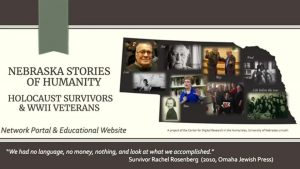 79.760.01). Here is a wonderful resource that secondary educators can use to help tell the story of Holocaust survivors.
79.760.01). Here is a wonderful resource that secondary educators can use to help tell the story of Holocaust survivors.
The Nebraska Stories of Humanity: Holocaust Survivors & WWII Veterans, Network Portal & Educational Website aims to centralize access to the history of Nebraska Holocaust survivors and WWII liberators of Nazi camps in a collection of searchable stories in aggregate. The site includes testimony, geographical and primary historical resources, documentation, and photos collected or harvested from local and disparate sources. Various tools enhance these stories through technologies such as digital story maps, access to testimonies, and network analysis of these individuals who were connected to and involved in their Nebraska communities. The project engages individual contributors, local stakeholder organizations, and national and international repositories.
April 2022 Newsletter
NSCSS Annual Conference is Back (In-Person)!
Gilder Lehrman National History Teacher of the Year – Now Accepting Nominations!
Any full-time educator of grades K–12 who teaches American history (including state and local history) is eligible for consideration. American history may be taught as an individual subject or as part of other subjects, such as social studies, reading, or language arts.
- The nominated teacher must have at least three years of classroom teaching experience.
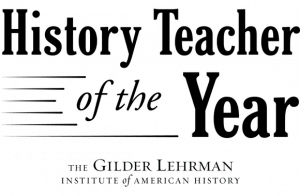
- Nominees must be planning to teach for at least one year following the award year.
- Past state and national winners are not eligible.
- Self-nominations are not accepted.
The 2022 award will honor exceptional elementary and secondary school teachers. Eligible generalist and specialist teachers in each of the 50 states, the District of Columbia, Department of Defense schools, and US Territories are encouraged to apply.
IMPORTANT CALENDAR DATES:
- Deadline for 2022 nominations: April 30, 2022
- Deadline for 2022 nominees to submit supporting materials: May 30, 2022
MyImpact Challenge – Bill of Rights Institute
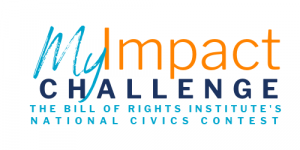 MyImpact Challenge is a civic engagement contest hosted by the Bill of Rights Institute. Our goal is simple: foster a robust understanding of citizenship and get students active in their communities now!
MyImpact Challenge is a civic engagement contest hosted by the Bill of Rights Institute. Our goal is simple: foster a robust understanding of citizenship and get students active in their communities now!
Submission is open to US citizens and US based young people between the ages of 13 and 19 years old on January 1, 2021. Submission must be received by 11:59 pm PT on Sunday, May 1, 2022. Only submissions entered through MyImpact Challenge’s online portal will be accepted for the contest. The contest is designed for one student per entry, but groups of up to five students may submit as a single group entry. Prizes awarded to group entries will be split evenly between entrants.
Each submission must include the following:
- An essay of up to 1,200 words expressing the student’s a) understanding of the ideal of “E Pluribus Unum” and how their project furthers that ideal in their community b) How their project furthers at least one Civic Virtue and one of Founding Principle as defined in the Bill of Rights Institutes “Principles and Virtues.”
- A report of up to 2,000 words detailing a student’s completed or in-progress civic engagement project. Report must include the following components.
- The inspiration for the project.
- The project plan.
- Details of the project’s execution
- At least two examples of the project’s demonstrated impact on the community.
- How the student(s) grew in understanding of the role of Civic virtue, knowledge of their communities, and their ability to support or impact them.
- Visual documentation of the student’s project and its results in one of the following formats:
- Photographic Only: No fewer than ten and no more than twenty high-resolution still photographs, submitted in either JPEG or PNG format.
- Video Only: One video of no more than five minutes, submitted in MP4 format
- Mixed Photographic and Video: No fewer than five and no more than seven high-resolution still photographs as well as one video of no more than two minutes. Photographs must be in either JPEG or PNG format, and video must be in MP4 format.
2022 Summer Professional Development Opportunities in Social Studies
This document was compiled by the Council of State Social Studies Supervisors as a way to communicate the wealth of professional development opportunities available to social studies educators. A special thanks to all of the organizations who helped contribute to this work and to the many organizations who are offering high quality social studies professional development for social studies teachers across the country. Many of the opportunities below are offered free or low cost, but some opportunities do have a cost. When opportunities are highlighted in yellow, it means there are not yet 2022 updates for that particular program. The document will be updated through the spring of 2022. Please email Stefanie Wager at stefanie.rosenbergwager@gmail.com with any questions, comments, or to add programs to this list.
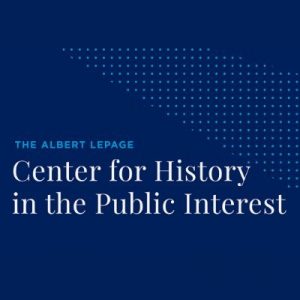 Historical scholarship and perspective to help make a better world.
Historical scholarship and perspective to help make a better world.
The Lepage Center brings historical scholarship and historical perspective to bear on contemporary global issues and has created different activities and funding opportunities to promote the importance of historical scholarship, methods, and inquiry for the public interest.
Our 2021-22 essay competition invites students to reflect upon the following question:
How can the study of history help us understand contemporary challenges we face in the world today, such as COVID-19, migration, and climate change?
What are the essay requirements?
- The essay should be a maximum of 500 words.
- The essay should be framed by an argument and supported by evidence.
- All sources (including internet-based sources) must be cited appropriately
How to submit an essay?
Participating teachers will collect essays from their students and submit them to lepage@villanova.edu by May 1st, 2022. The best essays will receive an award.
TeachingAmericanHistory.Org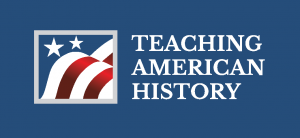
We support teachers of American history, government and civics, believing they do the most important work in America. We help them bring the documents and debates of America’s past into the present through free document-based seminars, document collections both online and in print, and other resources. We are dedicated to making every American history, government, and civics class in America its best.
Teaching American History is a free resource that brings together primary documents, continuing education, and community for American history teachers.
Native American Filmmakers Summit
The 2022 Vision Maker Media Producers Summit is open with free registration to filmmakers who want to learn about Vision Maker Media and other opportunities in public media. The summit will be held in Lincoln, Nebraska, April 28-30.
The three-day summit will kick off with a welcome reception, a one-day producer training, and a day of filmmaker presentations FREE and AVAILABLE to the PUBLIC on Saturday, April 30th.
The training day focuses on topics such as the PBS Red Book, financial management, public media broadcast licensing, and more. A variety of the training sessions will be available online for those registered for virtual participation.
Also, the Corporation for Public Broadcasting’s National Multicultural Alliance (NMCA) will present a workshop that will help producers discover what each NMCA organization’s mission is and the opportunities that exist within each that may further assist filmmakers in their work.
Descendants of DeWitty, Nebraska Present: The Ultimate Digital Black History Experience
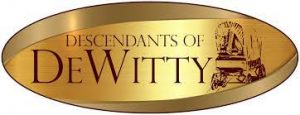 Prepare to undergo a journey, with its inception beginning deep in the historic and pre-colonial heart of Africa, crossing the great Atlantic, passing through the American Underground, and ending with triumphant freedom at the longest lasting Black Homestead in Nebraska History, DeWitty (Audacious), Nebraska.
Prepare to undergo a journey, with its inception beginning deep in the historic and pre-colonial heart of Africa, crossing the great Atlantic, passing through the American Underground, and ending with triumphant freedom at the longest lasting Black Homestead in Nebraska History, DeWitty (Audacious), Nebraska.
“From Lake Erie to the Seventh Concession, from Dillon Road to Drake Road to the west, the Buxton Settlement (formerly Elgin) fields are dotted with churches and houses built at the time, heroic of the way of the Underground. In 1849, Reverend William King settled there with the refugees in a territory of 9,000 acres of swamp and forest. Other refugees followed, acquiring and clearing acres, building churches, schools and industries. The settlers constructed the network of roads and drainage ditches that still exist today, transforming the place into an establishment of well-kept houses, reflecting the industrious nature of the inhabitants and the children who received a classical education. Today, the spirit of these determined settlers that claimed a free life in these plains lives on in their descendants.”
— Bishop Forrest C. Stith
Ken Burns in the Classroom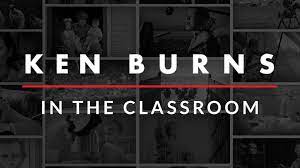
Ken Burns and his collaborators have been creating historical documentary films for more than forty years. Known for a signature style that brings primary source documents, images, and archival video footage to life on screen, these films present the opportunity to pose thought-provoking questions for students, and introduce new ideas, perspectives, and primary sources.
CitizenU.Org
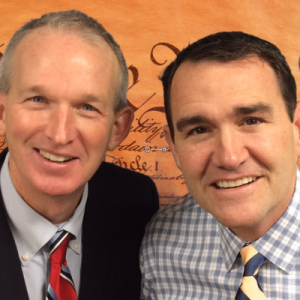 “No fancy words, no fancy suits, plain talk about issues you need to know . . . just in time.”
“No fancy words, no fancy suits, plain talk about issues you need to know . . . just in time.”
CitizenU is a political club dedicated to mentoring, tutoring and welcoming those who may be new to “inside the Beltway” stories and talk. Join the 2 Teachers as they help train a new platoon of young citizens. Learning about the government and politics is, after all, not a class but a lifestyle. Here at CitizenU our mission is to “train political animals.” It is never 2 late. There is always room 2B an educated citizen.
CivXNow Proposed State Bills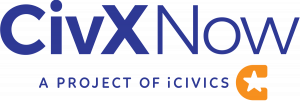
Click on your state to learn about the civic education legislation that’s been proposed. This map represents a scan of all state bills related to civic education. Inclusion of a bill on the map does not connote support or endorsement by CivXNow, iCivics, CivXNow Coalition members, or CivXNow state affiliated coalition.
April is Financial Literacy Month!
Personal Finance Institute Opportunity for Teachers (2 Locations)
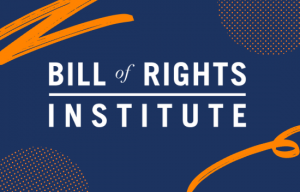 Building on the popularity of the Bill of Rights Institute’s Being an American resource, this updated version will provide scaffolded support for ESL students.
Building on the popularity of the Bill of Rights Institute’s Being an American resource, this updated version will provide scaffolded support for ESL students.
The lessons will include modifications for ESL classrooms and learners. This resource will take students through the Founding documents including the Declaration of Independence, the Constitution, and the Bill of Rights, and provide tools for primary source analysis, individual writing assignments, and classroom discussion. Students can “connect the dots” by applying what they learn through studying these documents to civic values, American heroes, and exploring the meaning of citizenship.
Lesson plan features will include warm-ups, classroom activities, background essays, homework assignments, extensions, handouts, suggested modifications, vocabulary glossaries, and Founding principle connections.
*Please note that this resource is not available as of right now. You will need to sign up to receive a notification for when it is released.
National Council for Geographic Education – Call for Proposals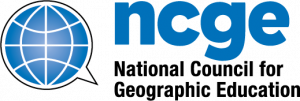
This year’s conference has been designed with busy educators’ schedules in mind. The 3-day (long weekend) conference will provide you with the most engaging conference yet where you will be able to:
- Connect with geography teachers, professionals, and colleagues
- Attend engaging geographic education-focused sessions to increase your professional learning
- Get the newest geographic tools and ideas to incorporate into the classroom and share with colleagues
Submission Deadline: 11:59p.m. (EST) April 30, 2022
Making History Matter: Toolkit for Communicators
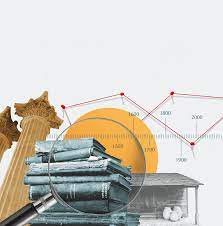 Welcome to “Reframing History,” a communications toolkit for historians, museum professionals, educators, and other advocates. It’s designed to facilitate more effective communication with the public about history: why it matters, how it can be interpreted, and why it is important to incorporate critical thinking and a multitude of diverse perspectives in the ways we understand it.
Welcome to “Reframing History,” a communications toolkit for historians, museum professionals, educators, and other advocates. It’s designed to facilitate more effective communication with the public about history: why it matters, how it can be interpreted, and why it is important to incorporate critical thinking and a multitude of diverse perspectives in the ways we understand it.
The “tools” in this toolkit are evidence-based strategies for reframing history, developed and tested by the FrameWorks Institute in partnership with the American Association for State and Local History, the National Council on Public History, and the Organization of American Historians. These strategies are based on a two-year deep-dive research project undertaken by our organizations to develop specific recommendations for communicators. This research was funded by the Andrew W. Mellon Foundation.
Untold: Stories You Won’t Learn About In a Textbook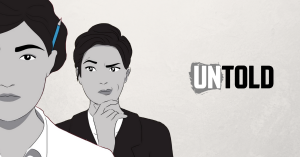
History Isn’t Dead. Perhaps now, more than ever, our history is a vital and very present part of the world around us. So it’s hugely important that young people feel a part of that conversation and can see themselves reflected in our shared past. Untold is a free collection of short, compelling, history videos and animations designed to engage new audiences in a new conversation and
- shine a light on the stories that don’t always make it into the classroom
- and question what we think we know about those that do.
Not everything worth knowing exists inside the cover of our history textbooks. Untold is here to fill in the gaps and bring new stories to life.
The Great Debates
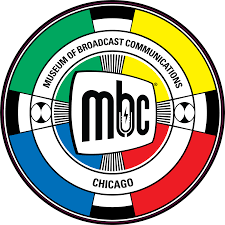 The Museum of Broadcast Communications is committed to helping parents, teachers and anyone who wants to be a more informed voter. Within this site, we offer curriculum that develops critical thinking and media literacy in students, links to performance highlights, commentary and debate analysis that can help you understand how today’s debates are shaped by 60 years of broadcast history.
The Museum of Broadcast Communications is committed to helping parents, teachers and anyone who wants to be a more informed voter. Within this site, we offer curriculum that develops critical thinking and media literacy in students, links to performance highlights, commentary and debate analysis that can help you understand how today’s debates are shaped by 60 years of broadcast history.
These guides are designed for high school classes. They can be adapted for middle school work as well. Each guide provides support materials, including worksheets and links to content, to help students understand the lesson.
NebTOPSS Annual Conference
Nebraska Teachers of Psychology in Secondary Schools, associated with the American Psychological Association, is offering a great professional development opportunity for any high school psychology teacher (or teachers who are interested in the science of psychology)!
NebTOPSS’s mission is to provide professional development opportunities for high school social studies teachers. Participating in these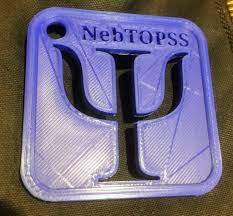 professional development opportunities allows you the opportunity to network with other high school psychology teachers, learn from collegiate psychology professors and other psychology professionals, as well as obtain new resources for your psychology classroom. With that mission in mind our fourth annual NebTOPSS conference will be on June 2, 2022 from 9:00-3:00. Our focus this year is mental health and adolescent brain development. The conference will be held at the UNO’s Community Engagement Center. During the conference, you will have the opportunity to listen to Dr. Stuart White and Dr.Brittany Taylor discuss the various neuroimaging tools they utilize at the Institute for Human Neuroscience, as well as their research investigating the role of adolescent brain structures and function on behavioral disorders. You will also participate in demonstrations and lessons that you could then take back to your classroom. Plus breakfast and lunch will be provided.
professional development opportunities allows you the opportunity to network with other high school psychology teachers, learn from collegiate psychology professors and other psychology professionals, as well as obtain new resources for your psychology classroom. With that mission in mind our fourth annual NebTOPSS conference will be on June 2, 2022 from 9:00-3:00. Our focus this year is mental health and adolescent brain development. The conference will be held at the UNO’s Community Engagement Center. During the conference, you will have the opportunity to listen to Dr. Stuart White and Dr.Brittany Taylor discuss the various neuroimaging tools they utilize at the Institute for Human Neuroscience, as well as their research investigating the role of adolescent brain structures and function on behavioral disorders. You will also participate in demonstrations and lessons that you could then take back to your classroom. Plus breakfast and lunch will be provided.
*Please note that this year NebTOPSS is partnering with the Nebraska State Council for the Social Studies conference. While it is not required, we encourage you to consider registering for the NSCSS conference on June 3rd. If you register to attend the NSCSS conference, you will receive a discounted registration fee for the 2022 NebTOPSS conference. Visit the NSCSS website for more information or to register for this year’s NSCSS conference.
If you are ready register now for NebTOPSS!
If you have any questions, feel free to contact Rob McEntarffer at rmcenta@lps.org. Thank you for your consideration!
March 2022 Newsletter
Crisis in Ukraine Teaching Resources
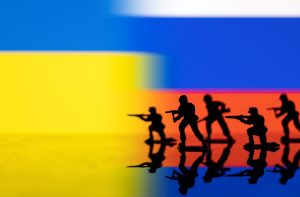 “On February 24, Russia deployed its military into Ukraine. Bombs and shelling have continued to escalate as people flee their homes and desperately seek safety.
“On February 24, Russia deployed its military into Ukraine. Bombs and shelling have continued to escalate as people flee their homes and desperately seek safety.
War has been steadily waging over the last eight years in Ukraine, leaving more than 850,000 people internally displaced and almost 3 million people in need of humanitarian aid. The current escalation in conflict will have devastating consequences for the civilian population and humanitarian needs are expected to rise.
Ukraine officially declared itself an independent country in 1991 as the Soviet Union collapsed and the Cold War ended. Since then, the country has been forming closer ties with the European Union and with NATO. Russia, however, sees these ties as an economic and strategic threat to its own security. In 2014, Russia invaded and subsequently annexed the Crimean Peninsula and began backing pro-Russian separatists in parts of eastern Ukraine that want to separate from the country.”
The following are resources for teachers interested in teaching the conflict in Ukraine.
- Russian Aggression Towards and Invasion of Ukraine (Resources curated by Taylor Hamblin of UNL)
- Student Discussion Guide: Crisis in Ukraine (Education World)
- War Breaks Out. How Will Students Get News? (MiddleWeb)
- Resources for Educators, Families to Discuss the Events in Ukraine with Students (San Diego County Office of Education)
- Ukraine (AllSides)
- Russia Invade Ukraine (The FlipSide)
- How To Talk with Students About the Russia-Ukraine War: 5 Tips (Education Week)
- Students are on TikTok Talking About Ukraine–How Can Teachers Answer Their Questions (We Are Teachers)
Women’s History Month

It’s March and that also means that it is Women’s History Month. Women’s History Month has its origins as a national celebration in 1981 when Congress passed an act which authorized and requested the President to proclaim the week beginning March 7, 1982 as “Women’s History Week.” Throughout the next five years, Congress continued to pass joint resolutions designating a week in March as “Women’s History Week.” In 1987 after being petitioned by the National Women’s History Project, Congress passed another additional legislation which designated the month of March 1987 as “Women’s History Month.”
Below is a list of resources for Nebraska Educators to access and use lessons relating to Women’s History Month.
- Women’s History Month Choice Board
- Women’s History Month (Library of Congress)
- 18 of Our Favorite Women’s History Month Activities (We Are Teachers)
- Women’s History Month Lesson Plans and Activities (Education World)
- Women’s History Month (Anti-Defamation League)
- Digital Classroom Resources (National Women’s History Museum)
- Women’s History Month (Center for Civic Education)
- Women’s History in the United States (EDSITEment)
NSCSS Annual Conference is Back (In-Person)!
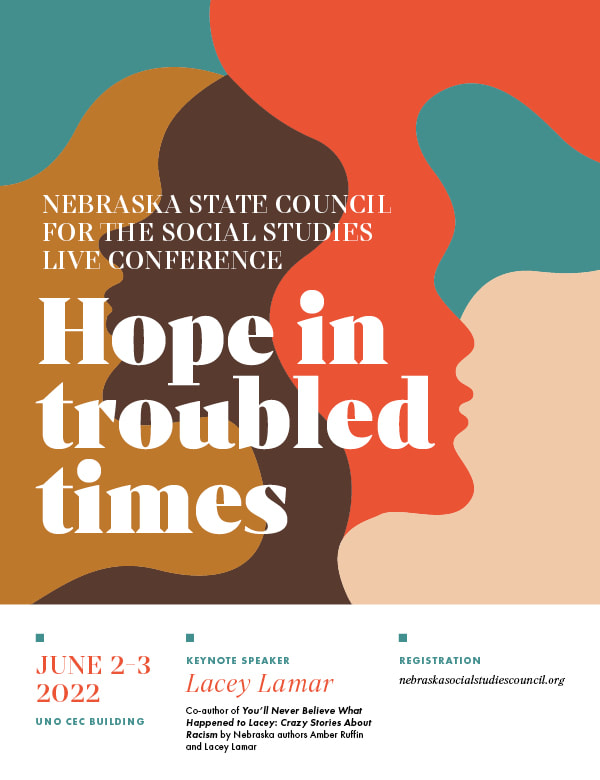
The Executive Board of the Nebraska State Council for the Social Studies is seeking nominations for the 2022 Social Studies Teacher of the Year awards for Congressional Districts 1, 2 and 3 as well as the Carter service-learning award and the prestigious Paul Beck award. There is also an award for an outstanding clinical practice teacher. All public and private school teachers who teach social studies at the elementary or secondary levels are eligible.
We hope that you can assist us in soliciting nominations of deserving teachers. Each year we encourage administrators and teaching colleagues to nominate teachers for these awards. If you would be so kind as to spread the word and/or make an online nomination.
The posted deadline is March 11. We appreciate your help with this endeavor. Social studies teachers are encouraged to attend the annual conference at the UNO Center for Community Engagement (pre-conference workshops June 2, conference June 3).
Worldle
Teachers, are you interested in a way to incorporate more geography into your classroom? This app, inspired by Wordle, presents a new and entertaining way to introduce students to different countries around the world!
Worldle was inspired by Wordle, according to its creator, Antoine Teuf, a 31-year-old Web and video game developer who lives in Montpellier, France — but it is not the same game.
Wordle and Worldle are, of course, similarly named, which has some social media users confused. But Teuf, in an interview with The Washington Post, said he doesn’t want Worldle to be seen as “a copy of the original Wordle game” but rather a “tribute” to it.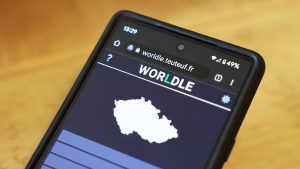
Where Wordle gives players six chances to guess a daily word, Worldle users have six tries in which to guess one country or territory based on an outline of its shape alone.
When Worldle players guess a country that is not correct, they are told how far and in which direction it is from the correct country on a map.
Worldle users can make the game more challenging by choosing to either hide the image of the country or territory, or to rotate the image in a random direction.
Like Wordle, Worldle can be played once a day, and users can share their results on social media in little green, yellow and black square emoji that symbolize how quickly they got the correct answer.
Players from around the world have shared their Worldle results on Twitter under the hashtag #worldle, showing the game’s global reach, along with jokes and memes comparing the two games.
The Flip Side
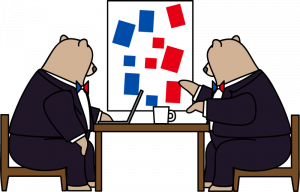 The Flip Side is on a mission to help bridge the gap between liberals and conservatives.
The Flip Side is on a mission to help bridge the gap between liberals and conservatives.
We’re a one-stop shop for smart, concise summaries of political analysis from both conservative and liberal media. Our goal is to become a news source for liberals, moderates, independents, conservatives, and even the apolitical.
It’s hard to convince liberals to watch Fox or conservatives to watch MSNBC. But if everyone takes 5 minutes a day to read The Flip Side, we’ll have a starting point when talking to our friends and neighbors.
Exciting Opportunity for Elementary Educators
I know this newsletter is sent to secondary social studies teachers, but if you know an excellent educator in grades K-3, please share this amazing opportunity with them! Application deadline is March 15, 2022.
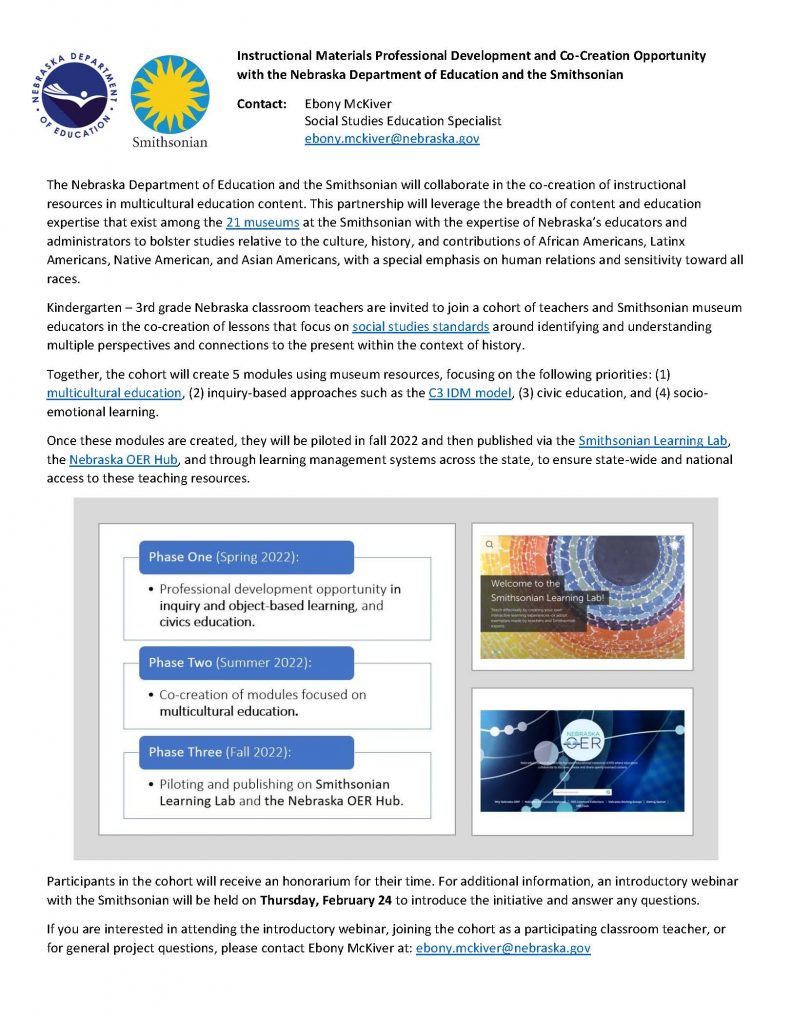
Personal Finance Institute Opportunity for Teachers (2 Locations)
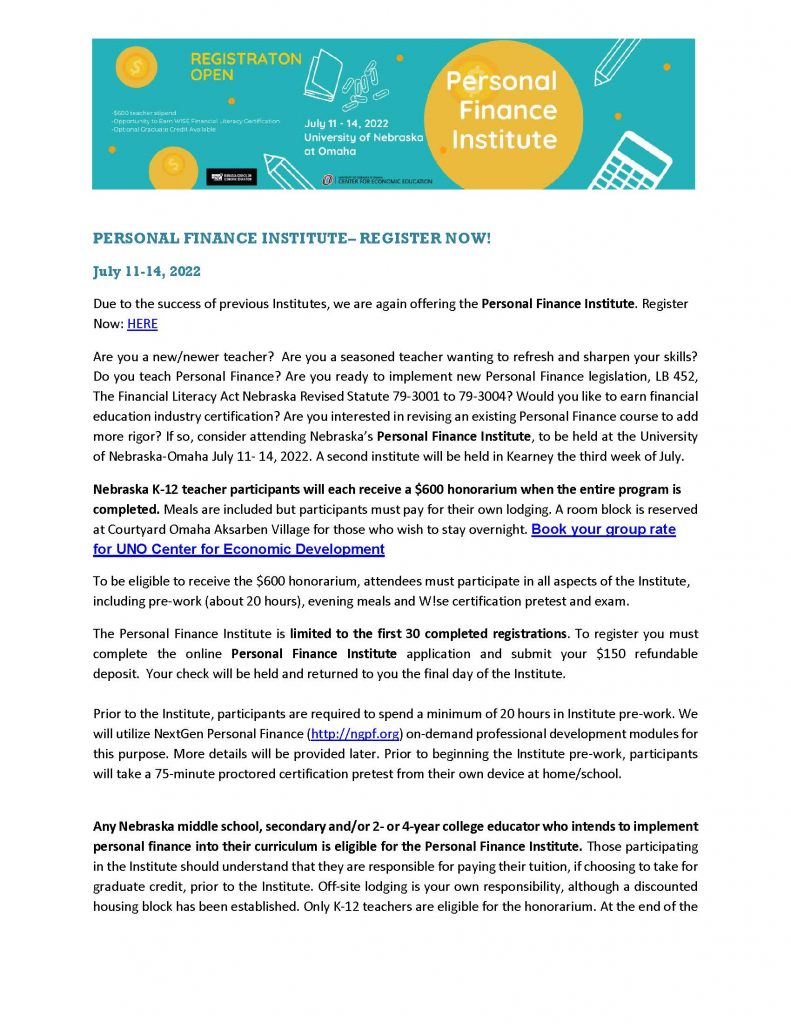
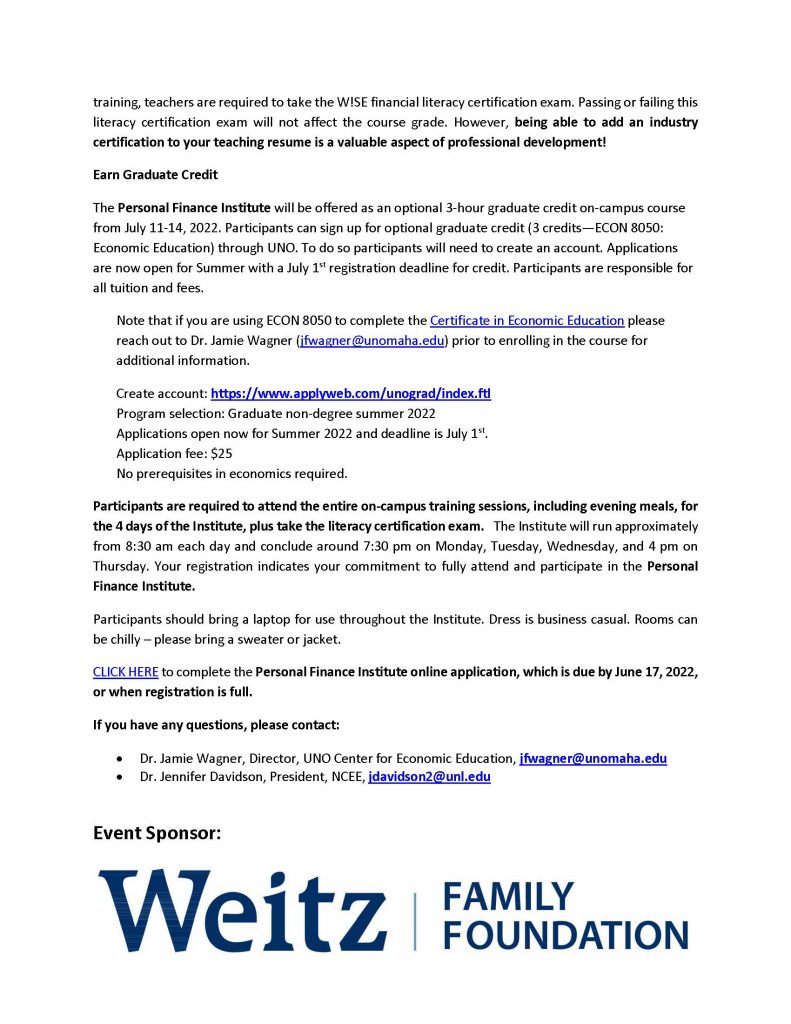
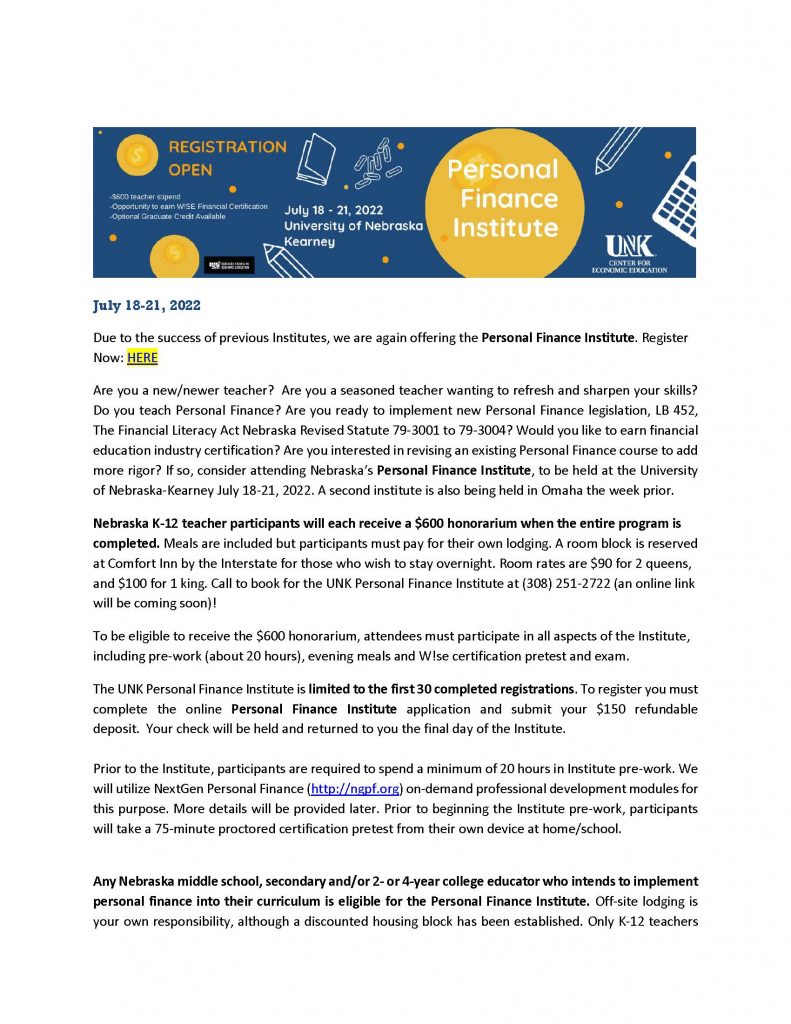
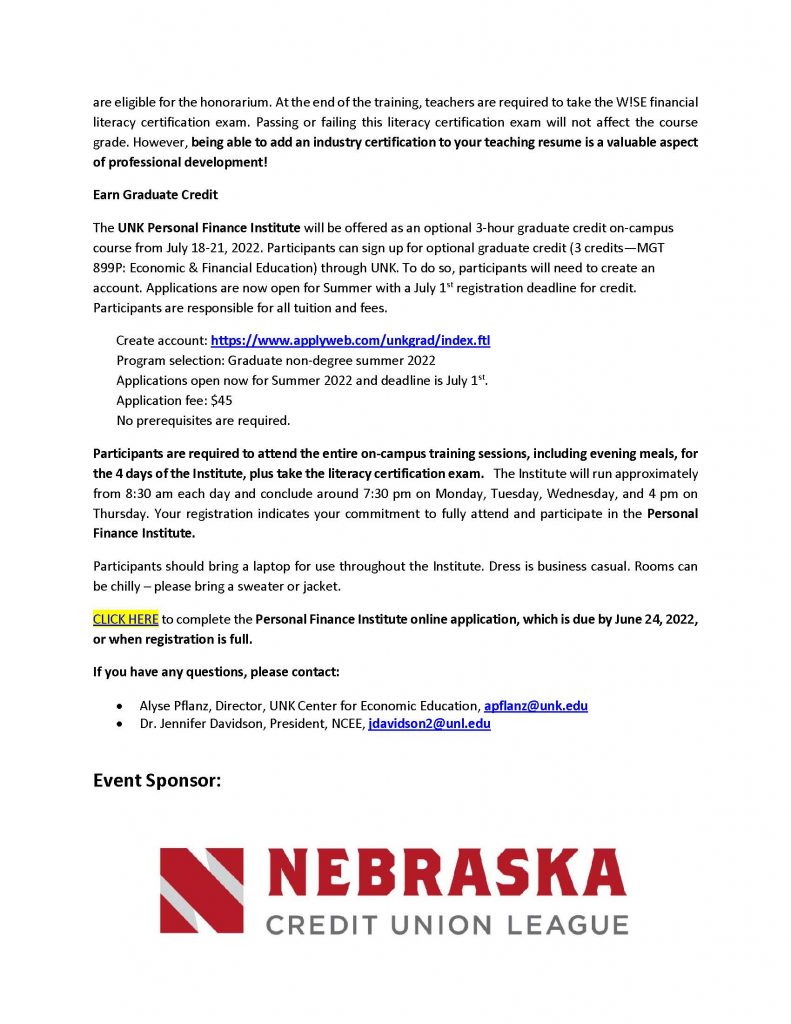
History Nebraska Free Virtual and In-Person Programs
Gilder Lehrman National History Teacher of the Year – Now Accepting Nominations!
Any full-time educator of grades K–12 who teaches American history (including state and local history) is eligible for consideration. American history may be taught as an individual subject or as part of other subjects, such as social studies, reading, or language arts.
- The nominated teacher must have at least three years of classroom teaching experience.

- Nominees must be planning to teach for at least one year following the award year.
- Past state and national winners are not eligible.
- Self-nominations are not accepted.
The 2022 award will honor exceptional elementary and secondary school teachers. Eligible generalist and specialist teachers in each of the 50 states, the District of Columbia, Department of Defense schools, and US Territories are encouraged to apply.
IMPORTANT CALENDAR DATES:
- Deadline for 2022 nominations: April 30, 2022
- Deadline for 2022 nominees to submit supporting materials: May 30, 2022
Nebraska Personal Finance Challenge
Foreign Policy Association – Great Decisions Teacher Training Institute
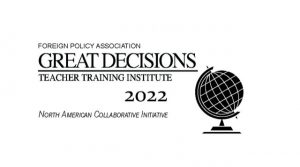 Admissions are Now Open!
Admissions are Now Open!
The FPA is proud to announce that the 14th annual Great Decisions Teacher Training Institute is now accepting applications from teachers across North America.
If you apply today, you will have the opportunity to join a top-tier group of fellow educators for one week of intensive international affairs workshops with policy makers and experts in New York City.
Participants will receive travel stipends and free hotel accommodation during the institute, as well as visits such as the Metropolitan Museum of Art, The Federal Reserve, and the United Nations.
If you or educators you know are looking for a way to integrate new techniques, materials, and perspectives into the classroom, do not pass up this opportunity to join the Great Decisions Teacher Training Institute!
Register by emailing teachers@fpa.org and requesting an application form.
Applications are due Friday, March 11th, 2022.
American Lawyers Alliance – Teacher of the Year Award
LAW-RELATED EDUCATION TEACHER OF THE YEAR $3,000 AWARD
For the past sixty years, the American Lawyers Alliance has been active in its support of public education, citizenship awareness and various service programs. Recognizing the vital role that teachers play in law-related education, the ALA began in 1985 to sponsor Law-Related Education Teacher of the Year Awards. 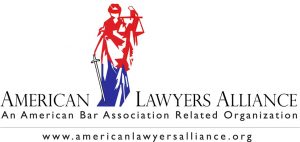
PURPOSE:
The purpose of these four awards is to honor public and private High School teachers who have made significant contributions in law-related education and have developed programs that meet the following criteria.
- Furthered the understanding of the role of the courts, law enforcement agencies and the legal profession
- Helped students recognize their responsibilities as well as their rights
- Encouraged effective law-related education programs in their schools and communities
- Increased communication among students, educators and those involved professionally in the legal system
NOMINATIONS:
Nominations for the 2022 Law-Related Education Teacher of the Year Awards may be submitted by the applicant, school administrators, other teachers, students, lawyers, judges, professional members of the community, or any other interested parties by March 15, 2022.
The American Lawyers Alliance is a charitable, educational and nonprofit organization whose mission is to promote understanding and appreciation of the law and the American legal system.
Visit the ALA website for an application and information about this award, including information about previous winners.
MyImpact Challenge – Bill of Rights Institute
 MyImpact Challenge is a civic engagement contest hosted by the Bill of Rights Institute. Our goal is simple: foster a robust understanding of citizenship and get students active in their communities now!
MyImpact Challenge is a civic engagement contest hosted by the Bill of Rights Institute. Our goal is simple: foster a robust understanding of citizenship and get students active in their communities now!
Submission is open to US citizens and US based young people between the ages of 13 and 19 years old on January 1, 2021. Submission must be received by 11:59 pm PT on Sunday, May 1, 2022. Only submissions entered through MyImpact Challenge’s online portal will be accepted for the contest. The contest is designed for one student per entry, but groups of up to five students may submit as a single group entry. Prizes awarded to group entries will be split evenly between entrants.
Each submission must include the following:
- An essay of up to 1,200 words expressing the student’s a) understanding of the ideal of “E Pluribus Unum” and how their project furthers that ideal in their community b) How their project furthers at least one Civic Virtue and one of Founding Principle as defined in the Bill of Rights Institutes “Principles and Virtues.”
- A report of up to 2,000 words detailing a student’s completed or in-progress civic engagement project. Report must include the following components.
- The inspiration for the project.
- The project plan.
- Details of the project’s execution
- At least two examples of the project’s demonstrated impact on the community.
- How the student(s) grew in understanding of the role of Civic virtue, knowledge of their communities, and their ability to support or impact them.
- Visual documentation of the student’s project and its results in one of the following formats:
- Photographic Only: No fewer than ten and no more than twenty high-resolution still photographs, submitted in either JPEG or PNG format.
- Video Only: One video of no more than five minutes, submitted in MP4 format
- Mixed Photographic and Video: No fewer than five and no more than seven high-resolution still photographs as well as one video of no more than two minutes. Photographs must be in either JPEG or PNG format, and video must be in MP4 format.
2022 Summer Professional Development Opportunities in Social Studies
This document was compiled by the Council of State Social Studies Supervisors as a way to communicate the wealth of professional development opportunities available to social studies educators. A special thanks to all of the organizations who helped contribute to this work and to the many organizations who are offering high quality social studies professional development for social studies teachers across the country. Many of the opportunities below are offered free or low cost, but some opportunities do have a cost. When opportunities are highlighted in yellow, it means there are not yet 2022 updates for that particular program. The document will be updated through the spring of 2022. Please email Stefanie Wager at stefanie.rosenbergwager@gmail.com with any questions, comments, or to add programs to this list.
February 2022 Newsletter
Black History Month
Happy Black History Month!
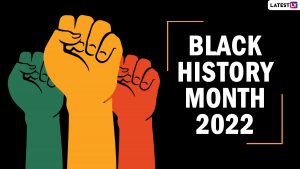 Black History Month is an annual celebration of achievements by African Americans and a time for recognizing their central role in U.S. history. Many of these significant figures were a part of the Civil Rights Movement in the 1950s and 1960s. Also known as African American History Month, the event grew out of “Negro History Week,” the brainchild of noted historian Carter G. Woodson. Since 1976, every U.S. president has officially designated the month of February as Black History Month. Other countries around the world, including Canada and the United Kingdom, also devote a month to celebrating Black history. Because of its international appeal, Black History Month has become so much more than the Civil Rights Movement. It offers an opportunity for students to learn about the diaspora of African peoples. Black History includes the reign of Mansa Musa in Timbuktu, writers Olaudah Equiano, Phillis Wheatley and Rudolph Fisher, poet Paul Laurence Dunbar, and the many other ancestors of the past who have transitioned to the next life.
Black History Month is an annual celebration of achievements by African Americans and a time for recognizing their central role in U.S. history. Many of these significant figures were a part of the Civil Rights Movement in the 1950s and 1960s. Also known as African American History Month, the event grew out of “Negro History Week,” the brainchild of noted historian Carter G. Woodson. Since 1976, every U.S. president has officially designated the month of February as Black History Month. Other countries around the world, including Canada and the United Kingdom, also devote a month to celebrating Black history. Because of its international appeal, Black History Month has become so much more than the Civil Rights Movement. It offers an opportunity for students to learn about the diaspora of African peoples. Black History includes the reign of Mansa Musa in Timbuktu, writers Olaudah Equiano, Phillis Wheatley and Rudolph Fisher, poet Paul Laurence Dunbar, and the many other ancestors of the past who have transitioned to the next life.
If you are looking for resources and lesson plans to commemorate Black history in your classroom, check out the links below!
- Black History Month – blackhistorymonth.gov
- Celebrate Black History Month – National Museum of African American History and Culture
- 60 Second Podcasts for Black History Month
- African American History and Culture in the United States – EDSITEment
- Black History Classroom Materials – Facing History and Ourselves
- How Are You Teaching Black History? – Learning for Justice
- Exploring the Vastness of Black History – Edutopia
- Black History – PBS Learning Media
- BlackPast
- Black History Month Resource Guide for Educators and Families – Center for Racial Justice in Education
- Civil Rights Movement Archive
- Civil Rights Digital Library
- Teaching Resources for Black History Month – National Archives
- Black History Month – iCivics
Showing Movies and Videos in Class
As I have said before, this school year has been a trying one for teachers. I am not in the classroom and will not pretend to understand the difficulties that many educators face and have faced. You all are handling yourselves with grace and professionalism and I can only tip my hat at the amazing job that is happening. To that end I have fielded several questions this school year about showing movies in the classroom, which is an uptick than in previous years. I recently came across this article and thought I would share excerpts from it with you. Please reach out to your building administrators or district leads for specific questions concerning policies surrounding showing movies and videos in your classroom.
Showing Movies & Videos in Class (for access to the full article)
By: Erik Ofgang
Most of us remember at some point in our education a teacher who would wheel a TV into class, pop a video in the VCR, press play, and then take a literal or proverbial nap for the remainder of class time.
That’s exactly how not to utilize film, documentaries, or other video presentations in class, says Britton Barnes, a 7th and 8th grade social studies teacher at Clement Middle School of the Redlands USD in California. However, when used correctly – in short clips with educator-provided context – videos, films, and documentaries can be a way to enhance lessons while giving students a deeper understanding of topics ranging from science to history to media literacy.
Use Video To Support Not Replace The Lesson
Videos are best used to build on already existing lessons by providing another way to understand or connect with the material for students. “It’s one thing to see the photosynthesis process or worksheet, or on paper, it’s another thing to visually see it,” Beerer says. Barnes uses video to help his students form a deeper connection with history through historic clips and recreations that can help them connect with the material.
Keep Videos Short and Model Good Viewing Habits 
While extended screenings may work once in a while, you generally want to keep it short, 15 minutes or under, and almost never want to devote an entire class session to a screening. Beerer says research shows shorter clips are better, and it is easier to align a shorter clip both to your existing lesson plans and to students’ attention spans.
Some of the clips Barnes uses in his class can be as short as a minute or two, and rarely exceed a quarter-hour on a video or a single activity of any kind. “I don’t like to go over 15 minutes on anything. I like to keep moving,” he says.
Examine the Source and Accuracy of Films and Videos
When screening documentaries, Barnes has his students source the video by asking questions such as:
- Who made this?
- Why did they make it?
- Is it relevant?
- Can I corroborate this information with maybe something I’ve read?
“Then I always tell my students, we’re going to learn to be historians rather than learn history, right? Because those are skills you carry across all disciplines,” he says.
He has a similar approach when showing historical films.
“When we are using a Hollywood film, we’ll even play games like, ‘Is it history? Or is it Hollywood?’” Barnes says.
After guessing which film segments are real and which are created by screenwriters, students then research and confirm the changes Hollywood made. “The way you present can create a lot of excitement, and a lot of tension or drama, and interest,” he says.
Make Sure The Video Screens on Your Class System and Licensing is In Order
Many educational services provide videos to teachers specifically for the purpose of screening in class. In general, showing a film at school for students is permitted under U.S. copyright law, but holding a public viewing with parents or other community members is not allowed. Check with a school librarian or with your technology or AV teams for best practices and institution policies.
Empower Students to Share Their Reactions to the Video and Film
Educators can all too often influence how students react to a film screened in class, says Arnold Blumberg, an adjunct professor at the University of Maryland, Baltimore County, who regularly incorporates film into his classes. “It’s an easy pitfall, particularly as someone who’s probably far more steeped in the material than the students are, or has seen a given movie many more times than they’re likely to have seen it, to start imposing your perceptions on them,” he says. “And it’s important even as the teacher to not dominate the immediate reactions, and to allow these things to happen organically.”
That means establishing an environment in which all students feel comfortable reacting to the film in the way that they experienced it.
Create Your Own Wordle
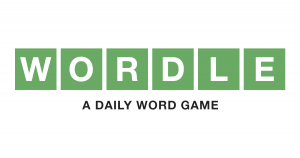 Are you obsessed with the daily Wordle as much as I am? Now educators (and everyone else for that matter) has the opportunity to create your own Wordle. Use this platform to strengthen student vocabulary, help students prepare for a summative assessment, or a myriad of other ways to engage young people with words! Wordle is a fun and great way to engage students with critical thinking skills. Send me an email with all of the fantastic ways you were able to incorporate Wordle into your classroom!
Are you obsessed with the daily Wordle as much as I am? Now educators (and everyone else for that matter) has the opportunity to create your own Wordle. Use this platform to strengthen student vocabulary, help students prepare for a summative assessment, or a myriad of other ways to engage young people with words! Wordle is a fun and great way to engage students with critical thinking skills. Send me an email with all of the fantastic ways you were able to incorporate Wordle into your classroom!
Explore Geo-Inquiry With Us!
Jump into our Tennessee C3 Hub featuring four new elementary geography inquiries designed by our team of terrific Tennessee teachers!
Tennessee teachers, led by Hamilton County School District and supported by National Geographic, are using the Inquiry Design Model (IDM) to help students develop an explorer’s mindset! By weaving together geographic thinking, inquiry, literacy, and civic action, these elementary teachers are showing us how you can do it all. Check out some of the inquiries Hamilton teachers have created!
A Great Moral and Social Force: A History of Black Banks
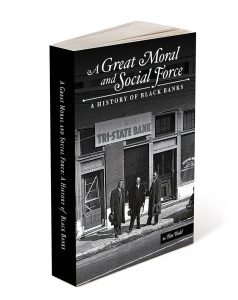 KC Fed publishes a new historic book on Black banks, communities and impact.
KC Fed publishes a new historic book on Black banks, communities and impact.
The Kansas City Fed has published its latest book, A Great Moral and Social Force: America’s First Black Banks. This book explores the growth of Black banks in the cities of Richmond, Virgina; Boley, Oklahoma; Chicago; Memphis, Tennessee; and Detroit.
These cities each have a rich history of Black wealth and economic success that may not be familiar to many Americans. The book moves across eras to examine some of the communities where these banks played a dual role in establishing both economic opportunity and social equality.
Printed books will be shipped as soon as they are available. Please direct questions to historicalbooks@kc.frb.org.
TO DOWNLOAD A DIGITAL COPY, OR FOR MORE INFORMATION, VISIT THE BOOK WEBSITE.
Next Gen Personal Finance Taxes Curriculum
NGPF’s Taxes curriculum is now updated for the 2021 filing year! Bring these current and relevant resources to your students so they can learn the basics of why we file taxes, the various tax forms they’ll need, and how they can file a tax return. Keep reading to learn more about these updates!
What’s Been Updated?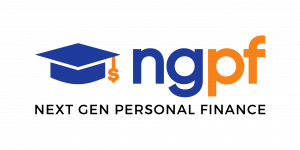
- Figures for the 2021 Filing Year: All of NGPF’s curriculum is updated to include the 2021 standard deduction, minimum income requirements to file a return, tax brackets, and more.
- Lessons: NGPF lessons in the Full-Year, Semester, 9-Week, and Middle School courses are all up to date.
- Nearpod Lessons: Any updates made in Semester, 9-Week, and Middle School Course lessons have also been made in their corresponding Nearpod lessons.
- Supplemental Resources & Answer Keys: All activities, case studies, data crunches, and more have been updated to reflect the latest figures and information for the 2021 tax filing year.
- Tax Forms: All resources now include the latest tax forms such as the W-2, 1040, and more for the 2021 filing year.
- Spanish Resources: All updates made in English resources are now reflected in the Spanish versions.
What Has Not Been Updated?
These updates are not a complete revamp of NGPF’s tax resources. We did not rewrite entire lessons or activities. We updated the existing content to reflect the latest figures and information relevant to the 2021 filing year.
Nebraska Personal Finance Challenge
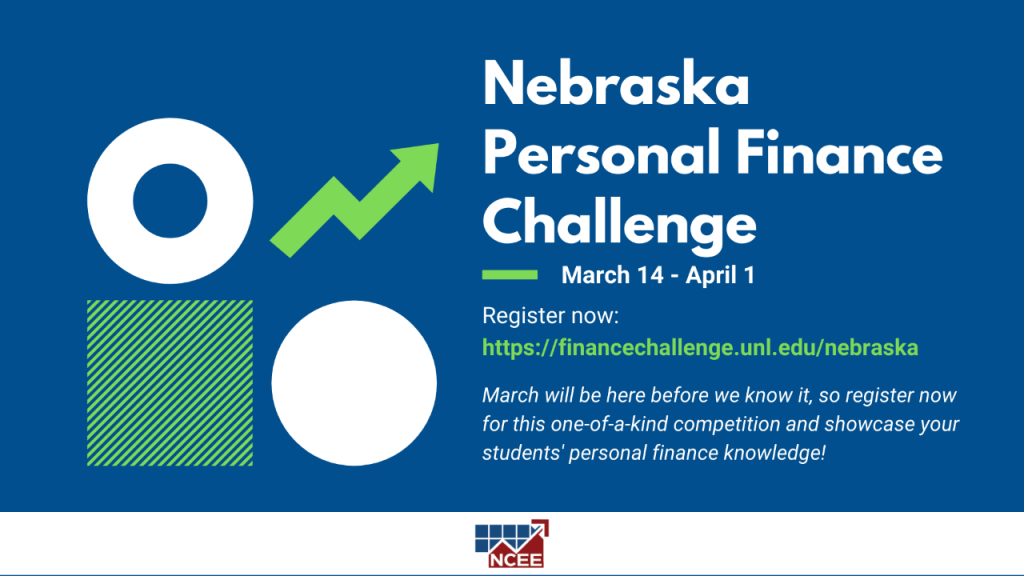
Books of the Month
February “Books of the Month”
You’ll Never Believe What Happened to Lacey
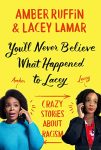 By: Amber Ruffin and Lacey Lamar
By: Amber Ruffin and Lacey Lamar
Now a writer and performer on Late Night with Seth Meyers and host of The Amber Ruffin Show, Amber Ruffin lives in New York, where she is no one’s First Black Friend and everyone is, as she puts it, “stark raving normal.” But Amber’s sister Lacey? She’s still living in their home state of Nebraska, and trust us, you’ll never believe what happened to Lacey.
The Sioux Chef’s Indigenous Kitchen
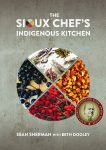 By: Beth Dooley and Sean Sherman
By: Beth Dooley and Sean Sherman
Here is real food—our indigenous American fruits and vegetables, the wild and foraged ingredients, game and fish. Locally sourced, seasonal, “clean” ingredients and nose-to-tail cooking are nothing new to Sean Sherman, the Oglala Lakota chef and founder of The Sioux Chef. In his breakout book, The Sioux Chef’s Indigenous Kitchen, Sherman shares his approach to creating boldly seasoned foods that are vibrant, healthful, at once elegant and easy.
Sherman dispels outdated notions of Native American fare—no fry bread or Indian tacos here—and no European staples such as wheat flour, dairy products, sugar, and domestic pork and beef.
Leadership in Turbulent Times
 By: Doris Kearns Goodwin
By: Doris Kearns Goodwin
In Leadership, Goodwin draws upon the four presidents she has studied most closely—Abraham Lincoln, Theodore Roosevelt, Franklin D. Roosevelt, and Lyndon B. Johnson (in civil rights)—to show how they recognized leadership qualities within themselves and were recognized as leaders by others. By looking back to their first entries into public life, we encounter them at a time when their paths were filled with confusion, fear, and hope.
The Soul of America
 By: Jon Meacham
By: Jon Meacham
Our current climate of partisan fury is not new, and in The Soul of America Meacham shows us how what Abraham Lincoln called the “better angels of our nature” have repeatedly won the day. Each of these dramatic hours in our national life have been shaped by the contest to lead the country to look forward rather than back, to assert hope over fear—a struggle that continues even now. While the American story has not always—or even often—been heroic, we have been sustained by a belief in progress even in the gloomiest of times. In this inspiring book, Meacham reassures us, “The good news is that we have come through such darkness before”—as, time and again, Lincoln’s better angels have found a way to prevail.
National Council for History Education – The Rural Experience
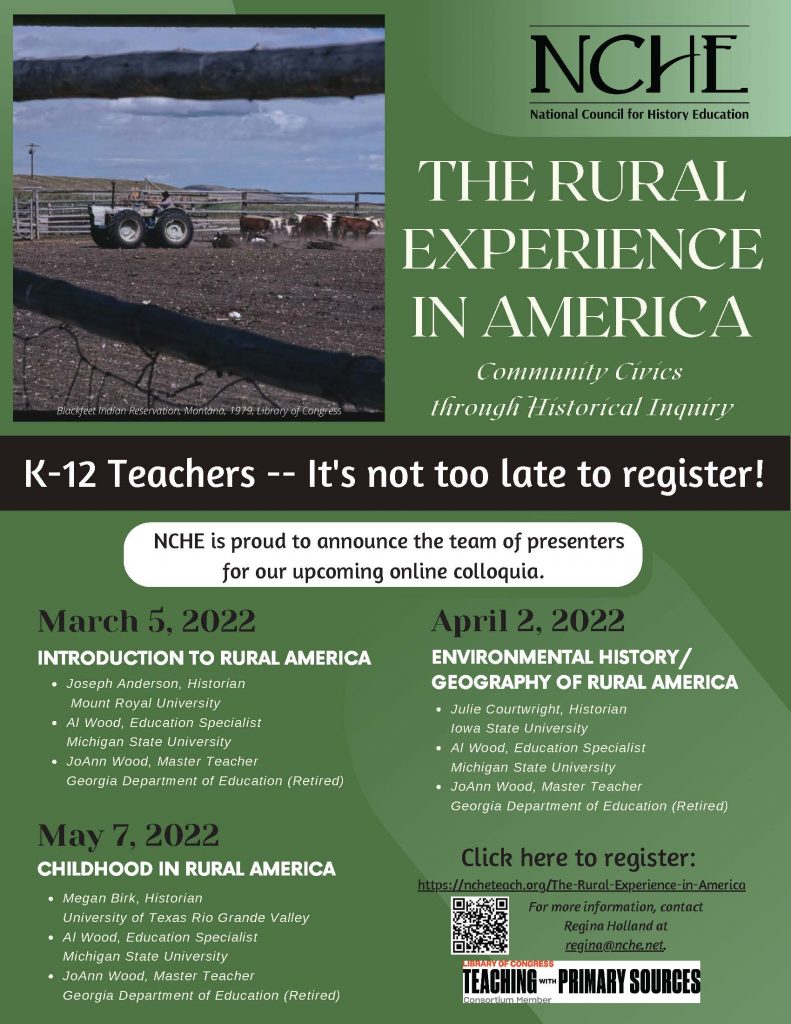
Foreign Policy Association – Great Decisions Teacher Training Institute
Admissions are Now Open!
 The FPA is proud to announce that the 14th annual Great Decisions Teacher Training Institute is now accepting applications from teachers across North America.
The FPA is proud to announce that the 14th annual Great Decisions Teacher Training Institute is now accepting applications from teachers across North America.
If you apply today, you will have the opportunity to join a top-tier group of fellow educators for one week of intensive international affairs workshops with policy makers and experts in New York City.
Participants will receive travel stipends and free hotel accommodation during the institute, as well as visits such as the Metropolitan Museum of Art, The Federal Reserve, and the United Nations.
If you or educators you know are looking for a way to integrate new techniques, materials, and perspectives into the classroom, do not pass up this opportunity to join the Great Decisions Teacher Training Institute!
Email teachers@fpa.org and request an application form.
Applications are due Friday, March 11th, 2022
American Lawyers Alliance – Teacher of the Year Award
LAW-RELATED EDUCATION TEACHER OF THE YEAR $3,000 AWARD
For the past sixty years, the American Lawyers Alliance has been active in its support of public education, citizenship awareness and various service programs. Recognizing the vital role that teachers play in law-related education, the ALA began in 1985 to sponsor Law-Related Education Teacher of the Year Awards. 
PURPOSE:
The purpose of these four awards is to honor public and private High School teachers who have made significant contributions in law-related education and have developed programs that meet the following criteria.
- Furthered the understanding of the role of the courts, law enforcement agencies and the legal profession
- Helped students recognize their responsibilities as well as their rights
- Encouraged effective law-related education programs in their schools and communities
- Increased communication among students, educators and those involved professionally in the legal system
NOMINATIONS:
Nominations for the 2022 Law-Related Education Teacher of the Year Awards may be submitted by the applicant, school administrators, other teachers, students, lawyers, judges, professional members of the community, or any other interested parties by March 15, 2022.
Keeping the Spirit of Democracy Alive Across the Nation
The American Lawyers Alliance is a charitable, educational and nonprofit organization whose mission is to promote understanding and appreciation of the law and the American legal system.
Visit the ALA website www.americanlawyersalliance.org for an application and information about this award, including information about previous winners.
Hamilton and the First Bank of the U.S.
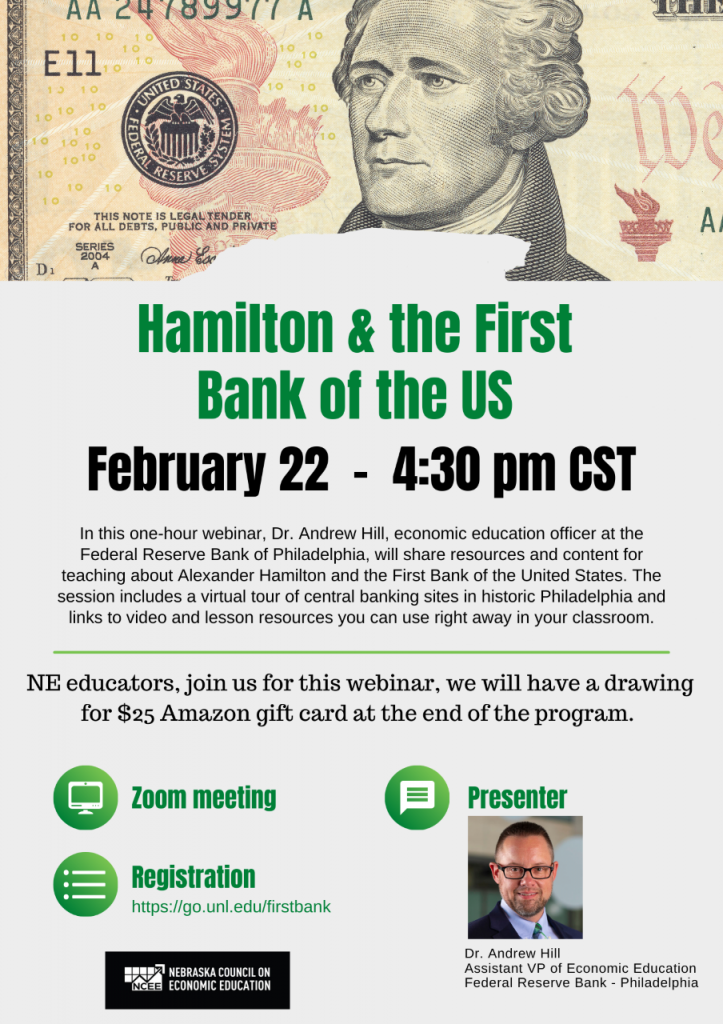
MyImpact Challenge – Bill of Rights Institute
MyImpact Challenge is a civic engagement contest hosted by the Bill of Rights Institute. Our goal is simple: foster a robust understanding of citizenship and get students active in their communities now!
 Submission is open to US citizens and US based young people between the ages of 13 and 19 years old on January 1, 2021. Submission must be received by 11:59 pm PT on Sunday, May 1, 2022. Only submissions entered through MyImpact Challenge’s online portal will be accepted for the contest. The contest is designed for one student per entry, but groups of up to five students may submit as a single group entry. Prizes awarded to group entries will be split evenly between entrants.
Submission is open to US citizens and US based young people between the ages of 13 and 19 years old on January 1, 2021. Submission must be received by 11:59 pm PT on Sunday, May 1, 2022. Only submissions entered through MyImpact Challenge’s online portal will be accepted for the contest. The contest is designed for one student per entry, but groups of up to five students may submit as a single group entry. Prizes awarded to group entries will be split evenly between entrants.
Each submission must include the following:
- An essay of up to 1,200 words expressing the student’s a) understanding of the ideal of “E Pluribus Unum” and how their project furthers that ideal in their community b) How their project furthers at least one Civic Virtue and one of Founding Principle as defined in the Bill of Rights Institutes “Principles and Virtues.”
- A report of up to 2,000 words detailing a student’s completed or in-progress civic engagement project. Report must include the following components.
- The inspiration for the project.
- The project plan.
- Details of the project’s execution
- At least two examples of the project’s demonstrated impact on the community.
- How the student(s) grew in understanding of the role of Civic virtue, knowledge of their communities, and their ability to support or impact them.
- Visual documentation of the student’s project and its results in one of the following formats:
- Photographic Only: No fewer than ten and no more than twenty high-resolution still photographs, submitted in either JPEG or PNG format.
- Video Only: One video of no more than five minutes, submitted in MP4 format
- Mixed Photographic and Video: No fewer than five and no more than seven high-resolution still photographs as well as one video of no more than two minutes. Photographs must be in either JPEG or PNG format, and video must be in MP4 format.
Nebraska Story Map Competition 2022
The Nebraska Story Map Competition encourages students to use a powerful mapping application called geographic information systems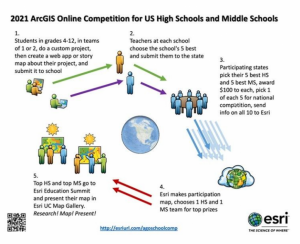 (GIS) to research and analyze some aspects of Nebraska. Students will showcase their results in a story map. This online competition is open to students in high school grades 9-12 or middle school grades 4-8. Students can complete a map project in a team of 1 or 2 students.
(GIS) to research and analyze some aspects of Nebraska. Students will showcase their results in a story map. This online competition is open to students in high school grades 9-12 or middle school grades 4-8. Students can complete a map project in a team of 1 or 2 students.
The 5 best HS + 5 best MS map entries will be awarded $100 each. Two-member student teams will divide the cash award. FYI- we have had no middle school student map entries since 2018. Let’s change this!
This URL Nebraska Story Map Competition 2022 (arcgis.com) provides a description of the competition, showcases last year’s top 5 HS student maps, and tutorials on how to use the GIS mapping software called ArcGIS Online. Contact Dr. Lesli Rawlings at lerawli1@wsc.edu if you have any questions about the competition or want more information.
Registration closes on February 11, 2022.
2022 Summer Professional Development Opportunities in Social Studies
 This document was compiled by the Council of State Social Studies Supervisors as a way to communicate the wealth of professional development opportunities available to social studies educators. A special thanks to all of the organizations who helped contribute to this work and to the many organizations who are offering high quality social studies professional development for social studies teachers across the country. Many of the opportunities below are offered free or low cost, but some opportunities do have a cost. When opportunities are highlighted in yellow, it means there are not yet 2022 updates for that particular program. The document will be updated through the spring of 2022. Please email Stefanie Wager at stefanie.rosenbergwager@gmail.com with any questions, comments, or to add programs to this list.
This document was compiled by the Council of State Social Studies Supervisors as a way to communicate the wealth of professional development opportunities available to social studies educators. A special thanks to all of the organizations who helped contribute to this work and to the many organizations who are offering high quality social studies professional development for social studies teachers across the country. Many of the opportunities below are offered free or low cost, but some opportunities do have a cost. When opportunities are highlighted in yellow, it means there are not yet 2022 updates for that particular program. The document will be updated through the spring of 2022. Please email Stefanie Wager at stefanie.rosenbergwager@gmail.com with any questions, comments, or to add programs to this list.
Journal of Economics Teaching
A Resource for the Economic Education Community!
JET is a peer-reviewed, economics pedagogy journal devoted exclusively to transmitting innovative teaching ideas to educators of economics at ALL levels. Production resources provided by the University of Nebraska – Omaha’s College of Business Administration.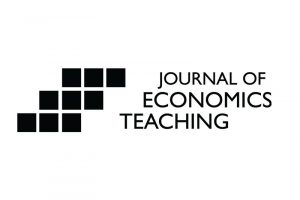
The Journal of Economics Teaching (JET) was the brainchild of Dirk Mateer and became a reality in 2015 through a generous start-up grant from the Thomas R. Brown Foundation.
JET was created to connect educators looking for a community to share their ideas on ways to teach economics as a whole or specific economic concepts. We encourage educators at all levels to submit, read, and connect with others in the community. The Journal will be publishing ideas from the elementary level through graduate level economics.
JET offers a new kind of journal for those educators interested in making their classroom more engaging and more innovative while not losing the rigor expected in an economics course. Along with journal articles, JET will provide supplemental materials like websites, computer programs, and lesson plans that help keep the lecture an environment conducive to learning economic materials.
Presidential Primary Sources Project
January 2022 through March 2022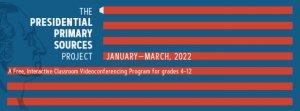
History Comes Alive in Your Classroom!
With the Presidential Primary Sources Project (PPSP), your class can engage in live, interactive discussions and use primary source documents to understand our nation’s presidents. Transport your students to places that helped shape past presidents’ lives. It’s easy to sign up for the PPSP, a free service, which is a partnership between Internet2, the National Park Service, and the National Archives.
ESRI Academy – Cartography
 Learn from experts and make beautiful maps using ArcGIS Pro.
Learn from experts and make beautiful maps using ArcGIS Pro.
Once, only cartographers made maps. Today, anyone can. Still, cartographers can teach people to make better maps, just as chefs can show people how to prepare better meals. With coaching from accomplished cartographers and practical, hands-on exercises, you’ll become a smarter mapmaker, ready to go beyond the defaults and produce engaging maps that communicate with impact.
President’s Day Teacher Resources
Presidents’ Day is a federal holiday celebrated on the third Monday in February; Presidents’ Day 2022 will occur on Monday, February 21. Originally established in 1885 in recognition of President George Washington, the holiday became popularly known as Presidents’ Day after it was moved as part of 1971’s Uniform Monday Holiday Act, an attempt to create more three-day weekends for the nation’s workers. While several states still have individual holidays honoring the birthdays of Washington, Abraham Lincoln and other figures, Presidents’ Day is now popularly viewed as a day to celebrate all U.S. presidents, past and present.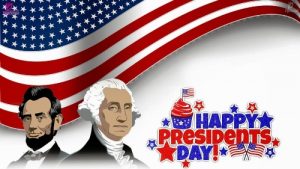
Below are resources to help you teach about President’s Day. It is an important holiday and it is also state law to commemorate the day.
Nebraska State Statute 79-794
(6) Appropriate patriotic exercises suitable to the occasion shall be held under the direction of the superintendent in every public, private, denominational, and parochial school on George Washington’s birthday, Abraham Lincoln’s birthday, Dr. Martin Luther King, Jr.’s birthday, Native American Heritage Day, Constitution Day, Memorial Day, Veterans Day, and Thanksgiving Day, or on the day or week preceding or following such holiday, if the school is in session.
- President’s Day Lessons – Center for Civic Education
- George Washington, Abraham Lincoln, and the President’s Day Holiday – EDSITEment
- George Washington’s Birthday – National Archives
- The President’s – WhiteHouse.gov
- President’s Day – GovInfo.gov
- Washington, Jefferson, and Lincoln: Three Great Presidents – Library of Congress
- President’s Day Activities – Education World
January 2022 Newsletter
Cheers to the New Year!
Dear Nebraska Social Studies Educators,
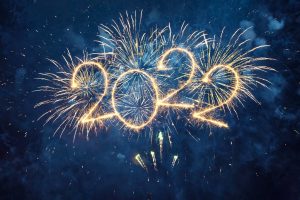
Now that the New Year is here, I want to take this opportunity to not only extend a heartfelt greeting for a safe, happy, and prosperous year ahead, but to also thank you for all of your hard work, patience, diligence, and determination to provide Nebraska students with the best social studies education possible. If you believe in numerology, the number 2 represents bringing peace and balance back into a situation. I only hope that with three 2’s in the current year some of the balance and peace within our local communities, state, and country will be restored. With the current school year half of the way over, I have seen so many successes with teachers implementing the instructional shifts, like inquiry, despite the many challenges that you all face. And since January is National Thank You Month, I want to thank all of you again for the extra hours worked, pushing through when you felt overwhelmed, and for providing a safe space for our students. Your efforts are not in vain and they are not overlooked. Many of you inspire me and I am blessed to be able to do and be in this work with you.
Here’s to you in 2022! (You see what I did there? I rhymed you and two!)
Best,
Ebony
Congratulations to Zein Selah and Ellie Janda! Nebraska Students Selected for 2022 U.S, Senate Youth Program
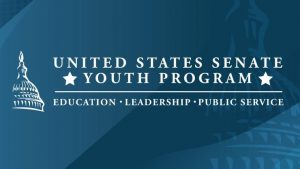 The Nebraska Department of Education is pleased to announce the names of two students selected as delegates to the 60th annual United States Senate Youth Program (USSYP) held virtually from Washington, D.C. March 5-10. Zein Saleh of Lincoln North Star High School in Lincoln and Ellie Janda of Blue Hill High School in Blue Hill Nebraska were chosen from across the state to be part of the group of 104 student delegates who will attend the program’s Washington Week virtually.
The Nebraska Department of Education is pleased to announce the names of two students selected as delegates to the 60th annual United States Senate Youth Program (USSYP) held virtually from Washington, D.C. March 5-10. Zein Saleh of Lincoln North Star High School in Lincoln and Ellie Janda of Blue Hill High School in Blue Hill Nebraska were chosen from across the state to be part of the group of 104 student delegates who will attend the program’s Washington Week virtually.
The USSYP was created by Senate Resolution 324 in 1962 and has been sponsored by the Senate and fully funded by The Hearst Foundations since inception. The program is designed to increase young Americans’ understanding of the interrelationships of the three branches of government, learn the caliber and responsibilities of federally elected and appointed officials, and emphasize the vital importance of democratic decision-making not only for America but for people around the world.
The overall mission of the program is to help grow knowledge of the American political process and a lifelong commitment to
 public service. In addition to the program week, The Hearst Foundations provide each student with a $10,000 undergraduate college scholarship.
public service. In addition to the program week, The Hearst Foundations provide each student with a $10,000 undergraduate college scholarship.
Zein Saleh is no stranger to leadership. He is currently the president of three school organizations: Key Club, Student Council, and National Honor Society. He was also appointed as a member of the Lincoln Public Schools Scholarly Multicultural Equity Cadre as well as the Diversity in LPS Advanced Course Enrollment Committee. Zein has been a Lincoln-Douglas debater since his freshman year, becoming team captain his junior year. He has been the Equity in Afterschool Settings Curriculum intern for the LPS Community Learning Centers and Additionally, Zein was invited by local nonprofit BLIXT Locally Grown to lead a weekly club at Lefler Middle School titled Branching Outwards.
Ellie Janda also likes to lead by example. She is an active member in the National Honor Society and has also held a variety of leadership positions in other school and community organizations, including FBLA president, drum major, quiz bowl captain, and 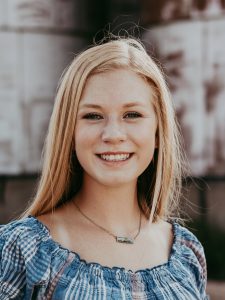 class vice-president. Ellie prides herself on her high level of involvement in extracurricular activities in her school and area and holds leadership roles in one-act, cross country, track, FCA, mentoring works, and yearbook. Outside of school, Ellie counsels at a youth camp, teaches Sunday School and Vacation Bible School, volunteers at United Harvest Food Pantry, and works full time over the summer at the Blue Hill Aquatic Center.
class vice-president. Ellie prides herself on her high level of involvement in extracurricular activities in her school and area and holds leadership roles in one-act, cross country, track, FCA, mentoring works, and yearbook. Outside of school, Ellie counsels at a youth camp, teaches Sunday School and Vacation Bible School, volunteers at United Harvest Food Pantry, and works full time over the summer at the Blue Hill Aquatic Center.
Chosen as alternates to the 2022 program were Peter Sukstorf of Omaha North High School in Omaha and Charles Sams of Gretna High School in Gretna.
The chief educational officer in each state selects the delegates after nomination by teachers and principals. This year’s delegates were designated by Dr. Matthew L. Blomstedt, Commissioner of Education.
During Washington Week, the student delegates virtually attend meetings and briefings with senators, members of the House of Representatives, Congressional staff, the president, a justice of the Supreme Court, leaders of cabinet agencies, an ambassador to the United States, and senior members of the national media.
World Food Prize Foundation – Nebraska Youth Institute Global Challenge
The Nebraska Youth Institute is a life-changing experience at the University of Nebraska – Lincoln where high school students engage with local leaders and experts on critical global challenges, participate in hands-on activities, and explore exciting ways to make a difference in Nebraska and around the world.
Students research issues they care about and propose their ideas to solve these grand challenges.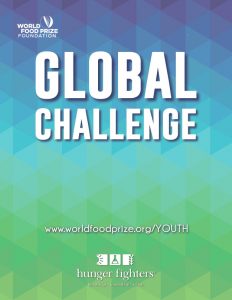
The Nebraska Youth Institute is hosted by the University of Nebraska – Lincoln with the generous support of the College of Agricultural Sciences and Natural Resources (CASNR); the Department of Agricultural Leadership, Education and Communication (ALEC); the Institute of Agriculture and Natural Resources (IANR), Bruce and Kathy Maunder with the Maunder-Borlaug scholarship, The Malaika Foundation, the Nebraska Department of Education (NDE) and Nebraska FFA.
Why participate?
Students who participate in the Nebraska Youth Institute earn a $500 scholarship, recognition as a Borlaug Scholar, and qualify for internships and further opportunities.
At this exciting event, participating high school students have the opportunity to:
- Present research and recommendations on ways to solve key global challenges in a short speech and small group discussions with statewide experts;
- Connect with other student leaders from across Nebraska to share ideas, identify solutions to these problems and build lasting friendships;
- Explore the issues, current research and opportunities to make a difference at the University of Nebraska – Lincoln
- Interact with global leaders, innovators and entrepreneurs in Nebraska working to end hunger and poverty and improve food security around the world.
Papers will be evaluated by The World Food Prize Board of Reviewers. This distinguished group of educators and experts was established to mentor and personally encourage students. Reviewers write thoughtful, personalized feedback to each student who participates in the Youth Institute.
How to participate:
To participate in the Nebraska Youth Institute, students research a global issue and write a three page paper under the supervision of a teacher or mentor (using the downloadable guidelines above).
Ninth through twelfth grade students are eligible to apply.
Registration and paper submission are due online by: February 1st, 2022
Note: Registration and paper submission forms are live!
There is no registration cost to participate in the Institute and meals will be provided during the event. However, both students and teacher/mentor participants must organize their own transportation to and from the event in Nebraska.
For more information please contact Renee Donner at: rdonner2@unl.edu or 402-472-9782
History Nebraska Food Feedback Zooms
Dear Teachers and Administrators,
Greetings from History Nebraska!
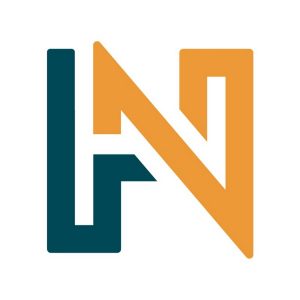 You are invited to a very special “Food Feedback Zoom” for educators in January, 2022. We would love to get your input as we develop a new exhibit and its supporting K-12 programming. Grow Nebraska (working title) will open in 2023 and invites visitors to dig into the question of “What is Nebraska Food?” via the themes of Nebraska Food is … Community, Homegrown, Everywhere, Work, Unique and Resilient. The exhibit will explore these themes via stories, primary sources, and immersive spaces!
You are invited to a very special “Food Feedback Zoom” for educators in January, 2022. We would love to get your input as we develop a new exhibit and its supporting K-12 programming. Grow Nebraska (working title) will open in 2023 and invites visitors to dig into the question of “What is Nebraska Food?” via the themes of Nebraska Food is … Community, Homegrown, Everywhere, Work, Unique and Resilient. The exhibit will explore these themes via stories, primary sources, and immersive spaces!
We’ll be sharing some EARLY ideas for K-12 programming, both in-person and Virtual, to engage students with this new exhibit. You’ll be reviewing 10-15 ideas like the one pictured here and responding simply with a thumbs up or thumbs down vote and/or comment.
With appreciation, each teacher who attends one of these 30-45 min. focus group will receive a complimentary History Nebraska “Supporter” membership Membership | History Nebraska. We will also send participants “first dibs” announcements and registration for new programming at History Nebraska’s museum and sites. Twenty spots are available on a first-come, first-serve basis.
We have four “Food Feedback Zooms” to choose from:
- Jan 25, Tuesday 7:15am-8:00am
- Jan 26, Wednesday 7:00pm-7:45pm
- Jan 27, Thursday 3:45pm-4:30pm
- Jan 29, Saturday 9:00pm-9:45am
Please respond to this email or complete this short form to let us know which “Food Feedback Zoom” works for you. https://forms.gle/FoodFeedback
We will send your Zoom link for the requested meeting and links to the interactive Padlet presentation we’ll be using to share ideas and collect feedback. The interactive presentation will open the day of our meeting and be open for a few days afterwards to collect any additional thoughts.
Thank you for considering. Please let me know if you have any questions.
The History Nebraska Education Team,
Mick, Araceli, Erica and Jessica
Books of the Month
January “Books of the Month”
Sketchnotes for Educators
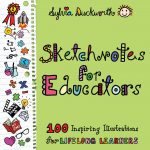 By: Sylvia Duckworth
By: Sylvia Duckworth
Sylvia Duckworth is a Canadian teacher whose sketchnotes have taken social media by storm. Her drawings provide clarity and provoke dialogue on many topics related to education. This book contains 100 of her most popular sketchnotes with links to the original downloads that can be used in class or shared with colleagues. Interspersed throughout the book are Sylvia’s reflections on each drawing and what motivated her to create them, in addition to commentary from other educators who inspired the sketchnotes.
Social Studies for a Better World
 By: Noreen Naseem Rodriguez and Katy Swalwell
By: Noreen Naseem Rodriguez and Katy Swalwell
In this engaging guide two experienced social studies educators unpack the oppressions that so often characterize the elementary curriculum―normalization, idealization, heroification, and dramatization―and show how common pitfalls can be replaced with creative solutions. Whether you’re a classroom teacher, methods student, or curriculum coordinator, this is a book that can transform your understanding of the social studies disciplines and their power to disrupt the narratives that maintain current inequities.
Words that Work
 By: Dr. Frank Luntz
By: Dr. Frank Luntz
In Words That Work, Luntz offers a behind-the-scenes look at how the tactical use of words and phrases affects what we buy, who we vote for, and even what we believe in. With chapters like “The Ten Rules of Successful Communication” and “The 21 Words and Phrases for the 21st Century,” he examines how choosing the right words is essential.
If you ever wanted to learn how to talk your way out of a traffic ticket or talk your way into a raise, this book’s for you.
Stolen
 By: Richard Bell
By: Richard Bell
Philadelphia, 1825: five young, free black boys fall into the clutches of the most fearsome gang of kidnappers and slavers in the United States. Lured onto a small ship with the promise of food and pay, they are instead met with blindfolds, ropes, and knives. Over four long months, their kidnappers drive them overland into the Cotton Kingdom to be sold as slaves. Determined to resist, the boys form a tight brotherhood as they struggle to free themselves and find their way home.
Nebraska Map with the New Congressional Districts
Dr. Randy Bertolas has revised the previous Nebraska Map by placing the new Congressional district boundaries behind the county lines. If you would like the PDF version of the map for use in your classroom, please feel free to send me an email (ebony.mckiver@nebraska.gov) and I will send it to you!
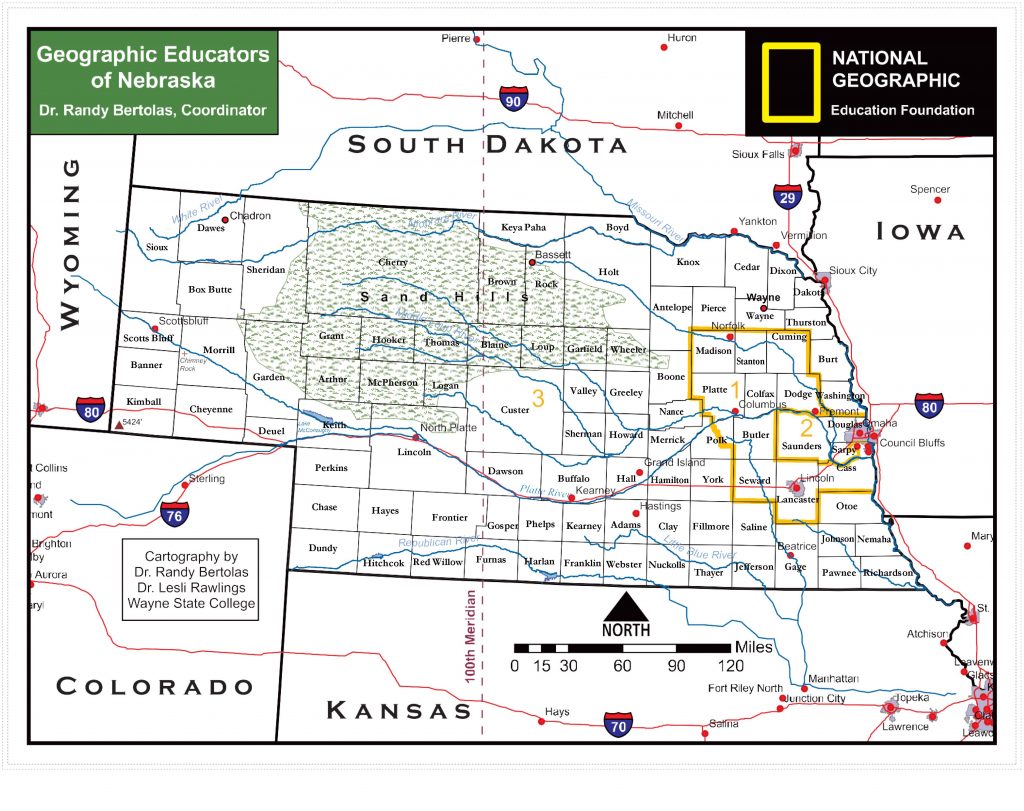
George Norris Day – January 5, 2022
This Wednesday, January 5th is “George W. Norris Day” and marks the 85th anniversary of our unicameral legislature! To celebrate the day, Nonpartisan Nebraska will be hosting online talks with former and current lawmakers to talk about Nebraska’s unique unicameral process, how we came to have the only unicameral legislature in the United States, and how everyday Nebraskans can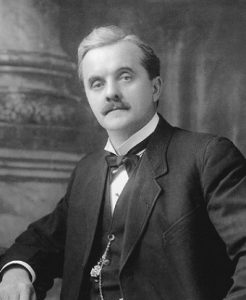 get involved in local government.
get involved in local government.
The event will stream on Facebook and YouTube and will be hosted by Nonpartisan Nebraska’s executive director, Nathan Leach of Kearney, and retired UNL journalism professor and author of “One House,” Dr. Charlyne Berens of Lincoln.
Widely considered one of history’s greatest United States Senators, Norris is considered the father of Nebraska’s unique nonpartisan unicameral legislature. He championed the constitutional amendment that established the unicameral that was overwhelmingly approved by voters in 1934. He served Nebraska first in the US House of Representatives for five terms and then in the US Senate for 30 years. Norris’ legislative accomplishments include the Norris-LaGuardia Act of 1932 and the creation of the Tennessee Valley Authority in 1933.
Sign up and hear from former and current state legislators, get information about contacting your state senator, and help us celebrate 85 years of unicameralism in Nebraska!
Dr. Martin Luther King, Jr., Day Teacher Resources
The fight to make the Martin Luther King Jr. birthday a holiday took 32 years, a lot of campaigning, and guest appearances including Stevie Wonder, Ted Kennedy, and the National Football League.
 King’s birthday was finally approved as a federal holiday in 1983, and all 50 states made it a state government holiday by 2000.
King’s birthday was finally approved as a federal holiday in 1983, and all 50 states made it a state government holiday by 2000.
Officially, King was born on January 15, 1929 in Atlanta. But the King holiday is marked every year on the third Monday in January.
State Statute provides that all Nebraska schools should recognize and commemorate specific holidays throughout the school year ((6)Appropriate patriotic exercises suitable to the occasion shall be held under the direction of the superintendent in every public, private, denominational, and parochial school on George Washington’s birthday, Abraham Lincoln’s birthday, Dr. Martin Luther King, Jr.’s birthday, Native American Heritage Day, Constitution Day, Memorial Day, Veterans Day, and Thanksgiving Day, or on the day or week preceding or following such holiday, if the school is in session).
Here are some teacher and student resources for Dr. Martin Luther King, Jr. Day!
- Dr. King’s Dream (Edsitement)
- Lesson Plan: Martin Luther King Jr.’s “I Have a Dream” Speech as a Work of Literature (NewsHour Extra)
- Martin Luther King, Jr. Day – Teacher Resources (TeacherVision)
- Podcast Teaching Resources for MLK Day (Listenwise)
- Resources for Martin Luther King, Jr. Day (Edutopia)
- The Best of Our Dr. Martin Luther King, Jr. Resources (Learning for Justice)
- National Civil Rights Museum at the Lorraine Motel Educator Resources
- Teaching King Beyond “I Have a Dream” (Civil Rights Teaching)
Elevate Civics
The Elevate Civics Project is a nationwide initiative aimed at understanding and improving students’ interest and engagement with civics. This project is for Claire’s dissertation in collaboration with civic education non-profit, iCivics. We have designed 10 lesson plans that we will provide to you to teach your class.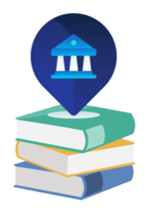
In the lessons, we have embedded some short questionnaires for your students that are important for the research project. In the questionnaires, students will be asked some questions to assess their learning, and we will provide you with a report of your students’ learning at the end of the project. We have permission forms in English and Spanish approved by Princeton University for your students and parents. Students giving permission to participate in the project will take the questionnaires.
We are able to offer you a $150 Amazon gift card to show our appreciation for you, especially during these difficult times. We ask that you audio record the lessons, if possible, with an audio recorder that we will provide to you. When putting together the lessons for this project, we have come across a large amount of civics resources. We are working to put these together into a repository which you will have access to and can use in future lesson preparation!
We want to make participating in the project as easy as possible. If there’s anything we can do to make it easier for you, please let us know! (email Claire at cwilleck@princeton.edu)
MyImpact Challenge – Bill of Rights Institute
MyImpact Challenge is a civic engagement contest hosted by the Bill of Rights Institute. Our goal is simple: foster a robust understanding of citizenship and get students active in their communities now!
 Submission is open to US citizens and US based young people between the ages of 13 and 19 years old on January 1, 2021. Submission must be received by 11:59 pm PT on Sunday, May 1, 2022. Only submissions entered through MyImpact Challenge’s online portal will be accepted for the contest. The contest is designed for one student per entry, but groups of up to five students may submit as a single group entry. Prizes awarded to group entries will be split evenly between entrants.
Submission is open to US citizens and US based young people between the ages of 13 and 19 years old on January 1, 2021. Submission must be received by 11:59 pm PT on Sunday, May 1, 2022. Only submissions entered through MyImpact Challenge’s online portal will be accepted for the contest. The contest is designed for one student per entry, but groups of up to five students may submit as a single group entry. Prizes awarded to group entries will be split evenly between entrants.
Each submission must include the following:
- An essay of up to 1,200 words expressing the student’s a) understanding of the ideal of “E Pluribus Unum” and how their project furthers that ideal in their community b) How their project furthers at least one Civic Virtue and one of Founding Principle as defined in the Bill of Rights Institutes “Principles and Virtues.”
- A report of up to 2,000 words detailing a student’s completed or in-progress civic engagement project. Report must include the following components.
- The inspiration for the project.
- The project plan.
- Details of the project’s execution
- At least two examples of the project’s demonstrated impact on the community.
- How the student(s) grew in understanding of the role of Civic virtue, knowledge of their communities, and their ability to support or impact them.
- Visual documentation of the student’s project and its results in one of the following formats:
- Photographic Only: No fewer than ten and no more than twenty high-resolution still photographs, submitted in either JPEG or PNG format.
- Video Only: One video of no more than five minutes, submitted in MP4 format
- Mixed Photographic and Video: No fewer than five and no more than seven high-resolution still photographs as well as one video of no more than two minutes. Photographs must be in either JPEG or PNG format, and video must be in MP4 format.
Nebraska Story Map Competition 2022
The Nebraska Story Map Competition encourages students to use a powerful mapping application called geographic information systems (GIS) to research and analyze some aspects of Nebraska. Students will showcase their results in a story map. This online competition is open to students in high school grades 9-12 or middle school grades 4-8. Students can complete a map project in a team of 1 or 2 students.
competition is open to students in high school grades 9-12 or middle school grades 4-8. Students can complete a map project in a team of 1 or 2 students.
The 5 best HS + 5 best MS map entries will be awarded $100 each. Two-member student teams will divide the cash award. FYI- we have had no middle school student map entries since 2018. Let’s change this!
This URL Nebraska Story Map Competition 2022 (arcgis.com) provides a description of the competition, showcases last year’s top 5 HS student maps, and tutorials on how to use the GIS mapping software called ArcGIS Online. Contact Dr. Lesli Rawlings at lerawli1@wsc.edu if you have any questions about the competition or want more information.
Registration closes on February 11, 2022.
2022 John F. Kennedy Profile in Courage in Essay Contest
Describe and analyze an act of political courage by a US elected official who served during or after 1917.
To learn more about political courage, visit Contest Information and FAQs.
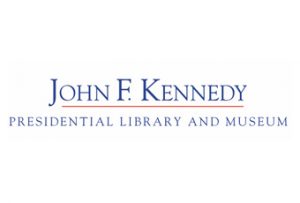 All submissions must adhere to contest requirements.
All submissions must adhere to contest requirements.
Contest Deadline
The Profile in Courage Essay Contest opens for submissions on September 1, 2021. The contest deadline is January 14, 2022.
- First-place: $10,000
- Second-place: $3,000
- Five Finalists: $1,000 each
- Eight Semi-finalists: $100 each
Get Email Updates
Join our mailing list to get contest tips, updates, and a reminder to submit your essay.
The John F. Kennedy Presidential Library and Museum does not sell or share your personal information or email address.
2022 Summer Professional Development Opportunities in Social Studies
This document was compiled by the Council of State Social Studies Supervisors as a way to communicate the wealth of 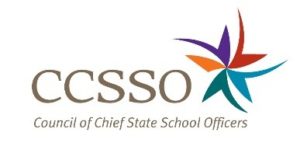 professional development opportunities available to social studies educators. A special thanks to all of the organizations who helped contribute to this work and to the many organizations who are offering high quality social studies professional development for social studies teachers across the country. Many of the opportunities below are offered free or low cost, but some opportunities do have a cost. When opportunities are highlighted in yellow, it means there are not yet 2022 updates for that particular program. The document will be updated through the spring of 2022. Please email Stefanie Wager at stefanie.rosenbergwager@gmail.com with any questions, comments, or to add programs to this list.
professional development opportunities available to social studies educators. A special thanks to all of the organizations who helped contribute to this work and to the many organizations who are offering high quality social studies professional development for social studies teachers across the country. Many of the opportunities below are offered free or low cost, but some opportunities do have a cost. When opportunities are highlighted in yellow, it means there are not yet 2022 updates for that particular program. The document will be updated through the spring of 2022. Please email Stefanie Wager at stefanie.rosenbergwager@gmail.com with any questions, comments, or to add programs to this list.
“We the People” Winners!
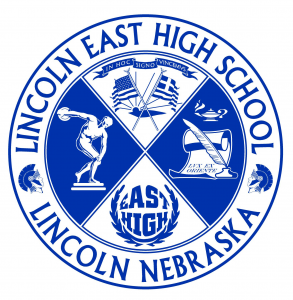 The Bar Foundation sponsors the Nebraska State We the People High School Finals annually. High school teams, each composed of a rostered class that has used the We the People curriculum, compete with simulated hearings before community members.
The Bar Foundation sponsors the Nebraska State We the People High School Finals annually. High school teams, each composed of a rostered class that has used the We the People curriculum, compete with simulated hearings before community members.
The winner represents Nebraska at the National We the People Finals in late April. More than 1,200 high school students and their teachers participate annually in the National Finals.
The 2021-2022 winners are Lincoln East High School and the runner ups were Lincoln Southeast!
Virtual and In-Person Bison Programming with History Nebraska!
We have a very exciting announcement to share with you!
The traveling exhibit from the Kauffman Museum, Bison, will be at the Nebraska History Museum in Lincoln from February 14-May 13, 2022. This exhibit features photos, objects, artwork and quotes exploring the life of Bison and the people who find value in them on the Great Plains.
We’d love to set your class/es up to explore this exhibit in these ways: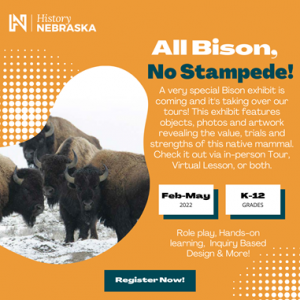
- Virtual Lessons: Schedule a Stand-Alone lesson (40 min.) or a Pre- or Post-Visit Chat (20 min.) around your visit to the Museum. In each virtual lesson, students work with our digital outreach educator, Araceli Hernandez, to discover the value of Bison from the perspective of two Indigenous Cultural Specialists and the secrets that touchable objects can reveal. To register for the Stand-Alone Virtual Lesson, please email araceli.hernandez@nebraska.gov
- In-Person (10-60 students, 60 min.): Active Tour – Museum staff facilitate and students play the role of reporter. Reporters “interview” an object from the Bison exhibit to collect and “go to press” with the evidence as they investigate the question: What is the value of a Bison?
- In-Person (10-75 students, 60 min.): Semi-Guided Tour – Museum staff facilitate and students play the role of curators who carefully choose and present objects from the Bison exhibit and others to include in an exhibit.
- In-Person (10-125 students, 60 min.): Self-Guided Tour – The Bison exhibit can be one of three exhibits classes visit as part of a museum-wide scavenger hunt.
These Virtual Lessons and In-Person Tours are free of charge for school groups and their adults. Donations are always welcome and appreciated. Masks are required for the Active Tour and Semi-Guided Tour as our staff facilitates. Masks are requested for Self-Guided Tours.
To register for any of these In-Person programs and a Pre- or Post-Visit chat, please contact Jessica Stoner at jessica.stoner@nebraska.gov.
Let me know if you have any questions or suggestions at 402-318-1723.
Jessica Stoner
(she/her/hers)
Education Associate
December 2021 Newsletter
Inclusivity, Equity, and Diversity During December
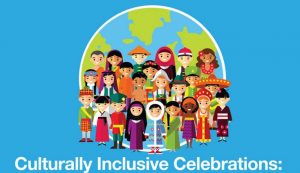 December is a month full of celebration, family, and merriment. There are holidays this month that are observed by religious and cultural groups. Our Jewish friends recognize Hanukkah from Sunday, November 28, 2021 to Monday, December 6, 2021. Christmas celebrations and observances occur on December 25, 2021. African-American families will participate in festivities associated with Kwanzaa. This month I encourage educators to not only discuss, share, and celebrate the holidays that are familiar to them, but if time allows, to introduce some that may be unfamiliar to students. As we continue to strive for inclusivity, equity, and diversity in our social studies classroom, this month makes it a little easier to continue to practice “Windows, Mirrors, and Sliding Glass Doors”. Below are resources and tips to ensure student inclusivity and also help with teaching about both the well and lesser-known December holidays.
December is a month full of celebration, family, and merriment. There are holidays this month that are observed by religious and cultural groups. Our Jewish friends recognize Hanukkah from Sunday, November 28, 2021 to Monday, December 6, 2021. Christmas celebrations and observances occur on December 25, 2021. African-American families will participate in festivities associated with Kwanzaa. This month I encourage educators to not only discuss, share, and celebrate the holidays that are familiar to them, but if time allows, to introduce some that may be unfamiliar to students. As we continue to strive for inclusivity, equity, and diversity in our social studies classroom, this month makes it a little easier to continue to practice “Windows, Mirrors, and Sliding Glass Doors”. Below are resources and tips to ensure student inclusivity and also help with teaching about both the well and lesser-known December holidays.
Tips for Teaching During the Holidays
- Teaching About the Holidays in Public School
- Culturally Responsive Instruction for Holiday and Religious Celebrations
- How Do You Celebrate? An Introduction to Holiday Customs (Elementary)
- The December Dilemma: Acknowledging Religious Holidays in the Classroom
Hanukkah
- How Do We Celebrate? A Cultural History of Hanukkah (Virtual Discussion)
- Hanukkah by Mayim Bialik (Video)
- Educational Resources for Chanukah
- Hanukkah 101
Christmas
- Let’s Celebrate Christmas (Elementary)
- Surprising Origins of Modern-Day Christmas Traditions
- A History of Christmas
- Charles Dickens Christmas!
Kwanzaa
- Official Kwanzaa Website
- Celebrate Kwanzaa in the United States (Elementary)
- Kwanzaa – All About the Holidays
- Kwanzaa First Fruits – National Museum of African-American History and Culture
Three Kings Day (January Holiday)
- When is Three Kings Day and How is it Celebrated?
- How Three Kings Day is Celebrated
- Discovering the Magic of Three Kings Day From Puerto Rico to the U.S.
Islam and the Winter Season
National Pearl Harbor Remembrance Day
- Pearl Harbor – National Park Service
- Pearl Harbor Education Resources – National WWII Museum
- The Road to Pearl Harbor: The United States and East Asia, 1915–1941
- Remembering Pearl Harbor – The National Archives
Bill of Rights Day
- Bill of Rights Day, December 15 – The National Archives
- Bill of Rights Day – United States Courts
- Bill of Rights Day – National Constitution Center
- Bill of Rights Institute
Pledge of Allegiance Day
- Teacher’s Guide to the Pledge of Allegiance
- I Pledge Allegiance… And Know What It Means (Elementary)
- Examining the Pledge of Allegiance
- Tracing the Evolution of the Pledge of Allegiance (Elementary)
Universal Human Rights Month
World101
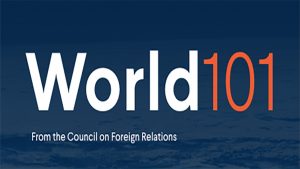 High-quality, standards-aligned classroom resources, lesson plans, teaching inspiration, and professional development opportunities—all inspired by our mission that Global Civics is essential for twenty-first century citizenship. World101 is a growing library of free multimedia resources that provide an immersive learning experience in a variety of settings: in classrooms, in corporate training rooms, and at home. Through its entertaining, interactive story-telling, World101 makes complex international relations and foreign policy issues accessible to learners both inside and outside formal academic settings. World101 will help the American public build an understanding of today’s most pressing issues and how those issues are relevant to them, thus preparing them to make informed choices of public officials (and hold them accountable), compete on a global stage, invest in their futures, and make a difference.
High-quality, standards-aligned classroom resources, lesson plans, teaching inspiration, and professional development opportunities—all inspired by our mission that Global Civics is essential for twenty-first century citizenship. World101 is a growing library of free multimedia resources that provide an immersive learning experience in a variety of settings: in classrooms, in corporate training rooms, and at home. Through its entertaining, interactive story-telling, World101 makes complex international relations and foreign policy issues accessible to learners both inside and outside formal academic settings. World101 will help the American public build an understanding of today’s most pressing issues and how those issues are relevant to them, thus preparing them to make informed choices of public officials (and hold them accountable), compete on a global stage, invest in their futures, and make a difference.
Humanities Nebraska Speakers Bureau
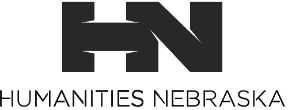 Humanities Nebraska has announced that 31 topics from its Speakers Bureau have been specially selected to represent a special initiative by the National Endowment for the Humanities. “A More Perfect Union” is intended to advance civic education nationwide as we approach the United States of America’s 250th Anniversary. The goal of this initiative is to help Americans better understand the world’s oldest constitutional democracy and how our founding ideals are met in a pluralistic society.
Humanities Nebraska has announced that 31 topics from its Speakers Bureau have been specially selected to represent a special initiative by the National Endowment for the Humanities. “A More Perfect Union” is intended to advance civic education nationwide as we approach the United States of America’s 250th Anniversary. The goal of this initiative is to help Americans better understand the world’s oldest constitutional democracy and how our founding ideals are met in a pluralistic society.
Members of the Humanities Nebraska Speakers Bureau are screened through an auditioning process to ensure that audiences will receive a high-quality educational experience. To assist libraries, schools, clubs and other organizations in planning a speaker event or series, programs from this list are available at a special rate of $25 for the first application in a calendar year and $50 for a second application in the same calendar year. The usual two application limit is also waived, allowing a third application from this list at the $50 rate. For a full listing of topics, please go to our website: https://humanitiesnebraska.org/catalog/diverse-us-history/
Books of the Month
December “Books of the Month”
Educated
 by: Tara Westover
by: Tara Westover
Educated (2018) is a memoir by the American author Tara Westover. Westover recounts overcoming her survivalist Mormon family in order to go to college, and emphasizes the importance of education in enlarging her world. She details her journey from her isolated life in the mountains of Idaho to completing a PhD program in history at Cambridge University. She started college at the age of 17 having had no formal education. She explores her struggle to reconcile her desire to learn with the world she inhabited with her father.
How to Educate An American
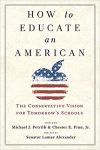 by: Michael J. Petrilli & Chester E. Finn, Jr.
by: Michael J. Petrilli & Chester E. Finn, Jr.
In the years after A Nation at Risk, conservatives’ ideas to reform America’s lagging education system gained much traction. Key items like school choice and rigorous academic standards drew bipartisan support and were put into practice across the country.
Today, these gains are in retreat, ceding ground to progressive nostrums that do little to boost the skills and knowledge of young people. Far from being discouraged, however, conservatives should seize the moment to refresh their vision of quality K–12 education for today’s America. These essays by 20 leading conservative thinkers do just that.
How the Word is Passed
 by: Clint Smith
by: Clint Smith
Beginning in his own hometown of New Orleans, Clint Smith leads the reader through an unforgettable tour of monuments and landmarks—those that are honest about the past and those that are not—that offer an intergenerational story of how slavery has been central in shaping our nation’s collective history, and ourselves.
Paper Trials
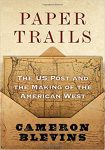 by: Cameron Blevins
by: Cameron Blevins
Cameron Blevins argues that the US Post wove together two of the era’s defining projects: western expansion and the growth of state power. Between the 1860s and the early 1900s, the western United States underwent a truly dramatic reorganization of people, land, capital, and resources. It had taken Anglo-Americans the better part of two hundred years to occupy the eastern half of the continent, yet they occupied the West within a single generation. As millions of settlers moved into the region, they relied on letters and newspapers, magazines and pamphlets, petitions and money orders to stay connected to the wider world.
Retro Report
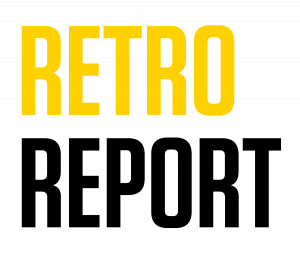 Retro Report is a non-profit journalism organization. In your classroom, we can help foster engagement and critical thinking skills with over 250 short videos that connect history to today.
Retro Report is a non-profit journalism organization. In your classroom, we can help foster engagement and critical thinking skills with over 250 short videos that connect history to today.
Our videos are perfect for many classroom subjects, particularly U.S. History, Civics & Government, Media Literacy, World History, Psychology, and Environmental Studies.
All of our videos, lessons, and student activities are completely FREE.
Our Director of Education, David Olson, spent over 15 years leading Middle School, High School, and College classrooms. Our goal at Retro Report is to meet the needs of educators and provide high quality, FREE materials to help connect past and present.
Kialo Edu
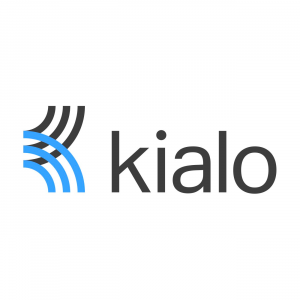 Kialo is a public discussion platform designed to facilitate reasoned debates about complex topics online. Since we first launched in the fall of 2017, we’ve grown into a community with thousands of debates and millions of contributions.
Kialo is a public discussion platform designed to facilitate reasoned debates about complex topics online. Since we first launched in the fall of 2017, we’ve grown into a community with thousands of debates and millions of contributions.
Our mission is to make the world a more thoughtful place, and we believe education is crucial in achieving that. With clear visualization of arguments and with powerful, easy to use navigation tools, Kialo is the perfect resource to help students master critical thinking and reasoning skills.
From the very start, academics have recognized the potential of our platform for educational and research applications. Many academics see Kialo as a solution to the many issues existing in online discourse today. Many teachers have approached us, asking if there were any plans to make an education-focused version of Kialo. We are proud to say that Kialo Edu is now launched and fully operational!
Kialo Edu allows educators to curate spaces for students to work through complex subjects together, while giving students the space to ask questions, discuss, and evaluate new ideas.
Professional Learning Opportunity
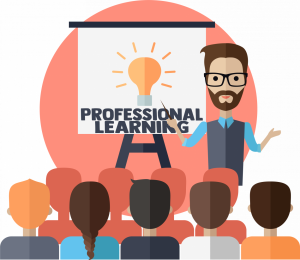 Katrina Gotschall, Social Studies and 7-12 ELA PD Coordinator for ESU 8 in Neligh, Nebraska is looking into creating a learning opportunity for 7-12 Social Studies teachers and 7-12 ELA teachers who teach about The Holocaust and Genocide to come together at Kansas City’s traveling exhibit “Auschwitz. Not Long Ago. Not Far Away” which will be on display at Union Station through March 20, 2022. We would be using the lens of the Inquiry Design Model to explore the exhibit and discussing trauma informed best practices when teaching about The Holocaust.
Katrina Gotschall, Social Studies and 7-12 ELA PD Coordinator for ESU 8 in Neligh, Nebraska is looking into creating a learning opportunity for 7-12 Social Studies teachers and 7-12 ELA teachers who teach about The Holocaust and Genocide to come together at Kansas City’s traveling exhibit “Auschwitz. Not Long Ago. Not Far Away” which will be on display at Union Station through March 20, 2022. We would be using the lens of the Inquiry Design Model to explore the exhibit and discussing trauma informed best practices when teaching about The Holocaust.
She would like to gather some feedback on whether teachers from around the state may be interested in an opportunity like this. Would you take a few minutes to complete this interest survey? You are not committing to anything by completing the survey, but if you answer “yes” to the survey, we will follow up with your after all feedback has been collected and reviewed.
The survey will close Tuesday, December 7th.
Thank you for taking the time to complete this interest survey! If you have any questions, please feel free to email me at katrina.gotschall@esu8ne.org
Nebraska Story Map Competition 2022
 The Nebraska Story Map Competition encourages students to use a powerful mapping application called geographic information systems (GIS) to research and analyze some aspects of Nebraska. Students will showcase their results in a story map. This online competition is open to students in high school grades 9-12 or middle school grades 4-8. Students can complete a map project in a team of 1 or 2 students.
The Nebraska Story Map Competition encourages students to use a powerful mapping application called geographic information systems (GIS) to research and analyze some aspects of Nebraska. Students will showcase their results in a story map. This online competition is open to students in high school grades 9-12 or middle school grades 4-8. Students can complete a map project in a team of 1 or 2 students.
The 5 best HS + 5 best MS map entries will be awarded $100 each. Two-member student teams will divide the cash award. FYI- we have had no middle school student map entries since 2018. Let’s change this!
This URL Nebraska Story Map Competition 2022 (arcgis.com) provides a description of the competition, showcases last year’s top 5 HS student maps, and tutorials on how to use the GIS mapping software called ArcGIS Online. Contact Dr. Lesli Rawlings at lerawli1@wsc.edu if you have any questions about the competition or want more information.
Data USA
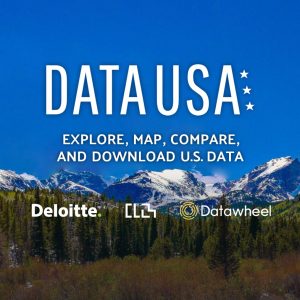 In 2014, Deloitte, Datawheel, and Cesar Hidalgo, Professor at the MIT Media Lab and Director of Collective Learning, came together to embark on an ambitious journey — to understand and visualize the critical issues facing the United States in areas like jobs, skills and education across industry and geography. And, to use this knowledge to inform decision making among executives, policymakers and citizens.
In 2014, Deloitte, Datawheel, and Cesar Hidalgo, Professor at the MIT Media Lab and Director of Collective Learning, came together to embark on an ambitious journey — to understand and visualize the critical issues facing the United States in areas like jobs, skills and education across industry and geography. And, to use this knowledge to inform decision making among executives, policymakers and citizens.
Our team, comprised of economists, data scientists, designers, researchers and business executives, worked for over a year with input from policymakers, government officials and everyday citizens to develop Data USA, the most comprehensive website and visualization engine of public US Government data. Data USA tells millions of stories about America. Through advanced data analytics and visualization, it tells stories about: places in America—towns, cities and states; occupations, from teachers to welders to web developers; industries–where they are thriving, where they are declining and their interconnectedness to each other; and education and skills, from where is the best place to live if you’re a computer science major to the key skills needed to be an accountant.
Data USA puts public US Government data in your hands. Instead of searching through multiple data sources that are often incomplete and difficult to access, you can simply point to Data USA to answer your questions. Data USA provides an open, easy-to-use platform that turns data into knowledge. It allows millions of people to conduct their own analyses and create their own stories about America – its people, places, industries, skill sets and educational institutions. Ultimately, accelerating society’s ability to learn and better understand itself.
Voices of Democracy
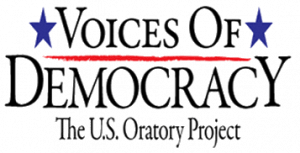 Voices of Democracy promotes the study of great speeches and debates in U.S. history. The project features the words of those who have defined the country’s guiding principles, debated controversial social and political issues, and shaped the identity and character of the American people. The project aims to foster an understanding of the nation’s principles and history and to promote civic engagement among scholars, teachers, and students.
Voices of Democracy promotes the study of great speeches and debates in U.S. history. The project features the words of those who have defined the country’s guiding principles, debated controversial social and political issues, and shaped the identity and character of the American people. The project aims to foster an understanding of the nation’s principles and history and to promote civic engagement among scholars, teachers, and students.
On this site, you will find authenticated speech texts, scholarly articles with critical analyses of those speeches, curriculum materials designed for undergraduate teachers and students, and lesson plans for high school and middle school teachers.
2022 John F. Kennedy Profile in Courage in Essay Contest
Describe and analyze an act of political courage by a US elected official who served during or after 1917.
To learn more about political courage, visit Contest Information and FAQs.
All submissions must adhere to contest requirements.
Contest Deadline
The Profile in Courage Essay Contest opens for submissions on September 1, 2021. The contest deadline is January 14, 2022.
First-place: $10,000
Second-place: $3,000
Five Finalists: $1,000 each
Eight Semi-finalists: $100 each
Get Email Updates
Join our mailing list to get contest tips, updates, and a reminder to submit your essay.
The John F. Kennedy Presidential Library and Museum does not sell or share your personal information or email address.
2022 Summer Professional Development Opportunities in Social Studies
 This document was compiled by the Council of State Social Studies Supervisors as a way to communicate the wealth of professional development opportunities available to social studies educators. A special thanks to all of the organizations who helped contribute to this work and to the many organizations who are offering high quality social studies professional development for social studies teachers across the country. Many of the opportunities below are offered free or low cost, but some opportunities do have a cost. When opportunities are highlighted in yellow, it means there are not yet 2022 updates for that particular program. The document will be updated through the spring of 2022. Please email Stefanie Wager at stefanie.rosenbergwager@gmail.com with any questions, comments, or to add programs to this list.
This document was compiled by the Council of State Social Studies Supervisors as a way to communicate the wealth of professional development opportunities available to social studies educators. A special thanks to all of the organizations who helped contribute to this work and to the many organizations who are offering high quality social studies professional development for social studies teachers across the country. Many of the opportunities below are offered free or low cost, but some opportunities do have a cost. When opportunities are highlighted in yellow, it means there are not yet 2022 updates for that particular program. The document will be updated through the spring of 2022. Please email Stefanie Wager at stefanie.rosenbergwager@gmail.com with any questions, comments, or to add programs to this list.
Constitute Project
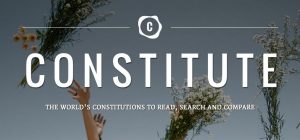 New constitutions are written every year. The people who write these important documents need to read and analyze texts from other places. And citizens need to know, and to be able to understand, what’s in their countries’ foundational documents. Constitute offers access to the world’s constitutions so that users can systematically compare them across a broad set of topics—using an inviting, clean interface.
New constitutions are written every year. The people who write these important documents need to read and analyze texts from other places. And citizens need to know, and to be able to understand, what’s in their countries’ foundational documents. Constitute offers access to the world’s constitutions so that users can systematically compare them across a broad set of topics—using an inviting, clean interface.
Constitute allows you to interact with the world’s constitutions in a few different ways.
- Quickly find relevant passages. The Comparative Constitutions Project (CCP) has tagged passages of each constitution with a topic—e.g., “right to privacy” or “equality regardless of gender”—so you can quickly find relevant excerpts on a particular subject, no matter how they are worded. You can browse the 300+ topics via the “Search | Topics | Filters” menu on the Constitutions page, or see suggested topics while typing in the search bar (which also lets you perform free-text queries).
- Filter searches. Want to view results for a specific region or time period, or explore draft or historical texts? You can limit your search by specific parameters using the “Filters” options in the “Search | Topics | Filters” menu.
- Read excerpts in List or Compare view. You can view searched excerpts within the default “List View,” or you can view two texts (or just their excerpts) side-by-side in “Compare View,” still with the same search functionality.
- Pin for further analysis. Pin excerpts, comparisons, or searches by clicking the “pin” button next to an expanded passage, the pin button at the top of the search results page, or the pin button on the right side of the comparison page. You can then view and download your pinned content by clicking on the “Pinned” link in the upper right section of the Constitutions page. Pinned items can be exported to Google Docs, rendered in PDF, or downloaded in .csv.
Furthermore, all of Constitute’s URLs are deep links, meaning you can link to a particular topic search, constitutional comparison, or even a specific constitutional provision directly, or share them on your social media accounts.
The Countries, Topics, and Data Stories sections of the website allow users to learn more about each country’s constitutional history, explore CCP’s inventory of constitutional topics, or dig deeper into analyzing the data.
Civics! An American Musical
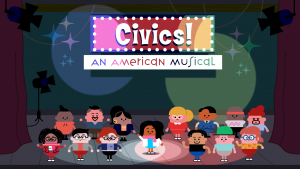 Do your students have what it takes to be the next hit Broadway musical producers? In this free civics learning game, students assume the role of a theater producer adapting true events from United States history to the stage. It’s up to them to analyze primary sources from the Library of Congress to create a new smash Broadway musical hit that is historically accurate and celebrates the power of ordinary citizens in creating change. Students work with different theatrical departments to learn about important aspects of creating a musical, such as costuming, set design, writing, and music. Once all the mini-games are complete, they are rewarded with a scene from their musical on opening night, completely personalized based on the creative choices they made during their game experience.
Do your students have what it takes to be the next hit Broadway musical producers? In this free civics learning game, students assume the role of a theater producer adapting true events from United States history to the stage. It’s up to them to analyze primary sources from the Library of Congress to create a new smash Broadway musical hit that is historically accurate and celebrates the power of ordinary citizens in creating change. Students work with different theatrical departments to learn about important aspects of creating a musical, such as costuming, set design, writing, and music. Once all the mini-games are complete, they are rewarded with a scene from their musical on opening night, completely personalized based on the creative choices they made during their game experience.
Play for free now!
Yale-New Haven Teachers Institute
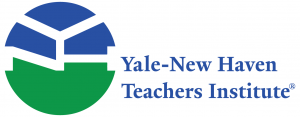 The Yale-New Haven Teachers Institute® is an educational partnership between Yale University and the New Haven Public Schools designed to strengthen teaching and learning in local schools and, by example and direct assistance, in high-need schools across the country. Through the Institute, Yale faculty members and New Haven school teachers work together in a collegial relationship. The Institute is also an interschool and interdisciplinary forum for teachers to collaborate on new curricula.
The Yale-New Haven Teachers Institute® is an educational partnership between Yale University and the New Haven Public Schools designed to strengthen teaching and learning in local schools and, by example and direct assistance, in high-need schools across the country. Through the Institute, Yale faculty members and New Haven school teachers work together in a collegial relationship. The Institute is also an interschool and interdisciplinary forum for teachers to collaborate on new curricula.
Each teacher participating as a Fellow in an Institute seminar with a Yale faculty member studies the seminar subject and prepares a curriculum unit to be taught during the following year. In this way teachers deepen their knowledge of the subjects they teach and develop new curricular material to engage and educate the students in their school courses.
You can view the curriculum units by searching the topical index or the volumes of units published each year.
Curriculum units, the product of the Fellows’ seminar experience, are designed to teach their own students about the seminar subject. Each curriculum unit contains: content objectives – a clear statement of the subject matter the unit seeks to cover; teaching strategies – a unified, coherent teaching plan for those objectives; classroom activities; resources for teachers and students; and an appendix on how the unit implements academic standards of the school district.
ePals
 Our ePals Global Community® pairs educators and students around the world in exciting project-based learning for language learning practice and cultural exchange.
Our ePals Global Community® pairs educators and students around the world in exciting project-based learning for language learning practice and cultural exchange.
ePals is a website that connects K-12 classrooms in more than 99 countries to share content and ideas and collaborate on projects (including pen pal exchanges). Teachers create a profile with a brief description about who they’re hoping to connect with and why; for example, a third-grade class that would like to meet French-speaking students to collaborate on a global green living project. Teachers can search for partner classrooms by language, age, and keyword, and can also factor in region/country and class size. The system will also recommend classrooms. Once connected, classes can communicate through a private workspace on the site.
Educators can apply safety filters to each student in their virtual classroom. They can choose to moderate all student messages before they’re sent, to receive copies of all messages once they’re delivered, or just moderate messages that contain flagged content, or opt for open communication with no teacher moderation. Teachers can also access lesson plan ideas and other resources on the site.
SlaveVoyages
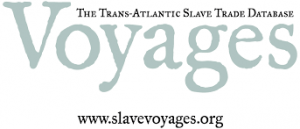 Explore the dispersal of enslaved Africans across the Atlantic world.
Explore the dispersal of enslaved Africans across the Atlantic world.
This digital memorial raises questions about the largest slave trades in history and offers access to the documentation available to answer them. European colonizers turned to Africa for enslaved laborers to build the cities and extract the resources of the Americas. They forced millions of Africans across the Atlantic to the Americas, and from one part of the Americas to another. Analyze these slave trades and view interactive maps, timelines, and animations to see the dispersal in action.
The Trans-Atlantic and Intra-American slave trade databases are the culmination of several decades of independent and collaborative research by scholars drawing upon data in libraries and archives around the Atlantic world. The new SlaveVoyages website itself is the product of three years of development by a multi-disciplinary team of historians, librarians, curriculum specialists, cartographers, computer programmers, and web designers, in consultation with scholars of the slave trade from universities in Europe, Africa, South America, and North America. The National Endowment for the Humanities was the principal sponsor of this work carried out originally at Emory Center for Digital Scholarship, the University of California at Irvine, and the University of California at Santa Cruz. The Hutchins Center of Harvard University has also provided support. The website is currently hosted at Rice University.
November 2021 Newsletter
American Indian / Native American Heritage Month
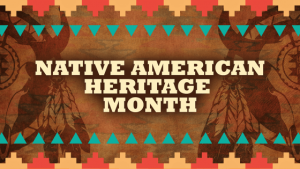 What started at the turn of the century as an effort to gain a day of recognition for the significant contributions the first Americans made to the establishment and growth of the U.S., has resulted in a whole month being designated for that purpose.
What started at the turn of the century as an effort to gain a day of recognition for the significant contributions the first Americans made to the establishment and growth of the U.S., has resulted in a whole month being designated for that purpose.
One of the very proponents of an American Indian Day was Dr. Arthur C. Parker, a Seneca Indian, who was the director of the Museum of Arts and Science in Rochester, N.Y. He persuaded the Boy Scouts of America to set aside a day for the “First Americans” and for three years they adopted such a day. In 1914, Red Fox James, a Blackfoot Indian, rode horseback from state to state seeking approval for a day to honor Indians. On December 14, 1915, he presented the endorsements of 24 state governments at the White House. There is no record, however, of such a national day being proclaimed.
The first American Indian Day in a state was declared on the second Saturday in May 1916 by the governor of New York. Several states celebrate the fourth Friday in September. In Illinois, for example, legislators enacted such a day in 1919. Presently, several states have designated Columbus Day as Native American Day, but it continues to be a day we observe without any recognition as a national legal holiday. In 1990 President George H. W. Bush approved a joint resolution designating November 1990 “National American Indian Heritage Month.” Similar proclamations, under variants on the name (including “Native American Heritage Month” and “National American Indian and Alaska Native Heritage Month”) have been issued each year since 1994.
Below are resources to help you commemorate American Indian / Native American Heritage Month.
- American Indian, Native American, and Indigenous Persons Resources (Nebraska Department of Education)
- National Native American Heritage Month (The Library of Congress)
- Native American Heritage Month (PBS)
- Student Centered Digital Learning Activities (National Indian Education Association)
- Stories, Lesson Plans, and More (Global Oneness Project)
- Amplify the Voices of Contemporary Native Peoples in Your Classroom (IllumiNative)
- Podcast Lessons for Native American Heritage Month in November (ListenwiseBLOG)
- American Indian History and Heritage (Edsitement)
- Native American Heritage Month (Anti-Defamation League)
Veteran’s Day Resources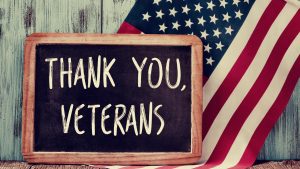
Veterans Day originated as “Armistice Day” on Nov. 11, 1919, the first anniversary of the end of World War I. Congress passed a resolution in 1926 for an annual observance, and Nov. 11 became a national holiday beginning in 1938. Unlike Memorial Day, Veterans Day pays tribute to all American veterans—living or dead—but especially gives thanks to living veterans who served their country honorably during war or peacetime.
State Statute provides that all Nebraska schools should recognize and commemorate specific holidays throughout the school year ((6)Appropriate patriotic exercises suitable to the occasion shall be held under the direction of the superintendent in every public, private, denominational, and parochial school on George Washington’s birthday, Abraham Lincoln’s birthday, Dr. Martin Luther King, Jr.’s birthday, Native American Heritage Day, Constitution Day, Memorial Day, Veterans Day, and Thanksgiving Day, or on the day or week preceding or following such holiday, if the school is in session.).
Here are some teacher and student resources for Veteran’s Day!
- Tomb of the Unknown Soldier Centennial Commemoration
- Activities for Veterans Day (Veterans Administration)
- Veterans Day 2021(Operation We Are Here)
- Veterans Day in the Classroom (National Education Association)
- Veterans Day and the Meaning of Sacrifice (PBS)
- Veterans Day Lessons Your Students Won’t Forget (Western Governors University)
Aviation History Month
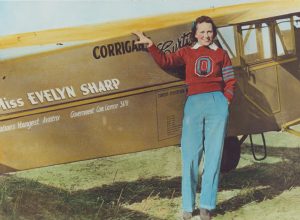 November is National Aviation History Month and is dedicated to exploring, recognizing and celebrating America’s great contributions and achievements in the development of aviation. Aviation history refers to the history of development of mechanical flight — from the earliest attempts in kites and gliders to powered heavier-than-air, supersonic and space flights.
November is National Aviation History Month and is dedicated to exploring, recognizing and celebrating America’s great contributions and achievements in the development of aviation. Aviation history refers to the history of development of mechanical flight — from the earliest attempts in kites and gliders to powered heavier-than-air, supersonic and space flights.
Take a moment this month to celebrate aviation and Nebraska’s own history making Aviator, Evelyn “Sharpie” Sharp!
https://natlvtn.org/evelyn-sharp/
Books of the Month
November “Books of the Month”
“An Indigenous Peoples’ History of the United States” by Roxanne Dunbar-Ortiz
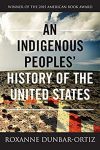
Today in the United States, there are more than five hundred federally recognized Indigenous nations comprising nearly three million people, descendants of the fifteen million Native people who once inhabited this land. The centuries-long genocidal program of the US settler-colonial regimen has largely been omitted from history. Now, for the first time, acclaimed historian and activist Roxanne Dunbar-Ortiz offers a history of the United States told from the perspective of Indigenous peoples and reveals how Native Americans, for centuries, actively resisted expansion of the US empire.
“Bury My Heart at Wounded Knee” by Dee Brown
 First published in 1970, Bury My Heart at Wounded Knee is Dee Brown’s eloquent, meticulously documented account of the systematic destruction of American Indians during the second half of the nineteenth century. Using council records, autobiographies, and firsthand descriptions, Brown introduces readers to great chiefs and warriors of the Dakota, Ute, Sioux, Cheyenne, and other tribes, revealing in heart wrenching detail the battles, massacres, and broken treaties that methodically stripped them of freedom.
First published in 1970, Bury My Heart at Wounded Knee is Dee Brown’s eloquent, meticulously documented account of the systematic destruction of American Indians during the second half of the nineteenth century. Using council records, autobiographies, and firsthand descriptions, Brown introduces readers to great chiefs and warriors of the Dakota, Ute, Sioux, Cheyenne, and other tribes, revealing in heart wrenching detail the battles, massacres, and broken treaties that methodically stripped them of freedom.
“Destiny of the Republic” by Candice Millard
 James Abram Garfield was one of the most extraordinary men ever elected president. Born into abject poverty, he rose to become a wunderkind scholar, a Civil War hero, a renowned congressman, and a reluctant presidential candidate who took on the nation’s corrupt political establishment. But four months after Garfield’s inauguration in 1881, he was shot in the back by a deranged office-seeker named Charles Guiteau. Garfield survived the attack, but became the object of bitter, behind-the-scenes struggles for power—over his administration, over the nation’s future, and, hauntingly, over his medical care. Meticulously researched, epic in scope, and pulsating with an intimate human focus and high-velocity narrative drive, The Destiny of the Republic brings alive a forgotten chapter of U.S. history.
James Abram Garfield was one of the most extraordinary men ever elected president. Born into abject poverty, he rose to become a wunderkind scholar, a Civil War hero, a renowned congressman, and a reluctant presidential candidate who took on the nation’s corrupt political establishment. But four months after Garfield’s inauguration in 1881, he was shot in the back by a deranged office-seeker named Charles Guiteau. Garfield survived the attack, but became the object of bitter, behind-the-scenes struggles for power—over his administration, over the nation’s future, and, hauntingly, over his medical care. Meticulously researched, epic in scope, and pulsating with an intimate human focus and high-velocity narrative drive, The Destiny of the Republic brings alive a forgotten chapter of U.S. history.
“Integrating Primary and Secondary Sources Into Teaching” by Scott Waring
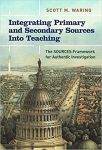 Learn how to integrate and evaluate primary and secondary sources by using the SOURCES framework. SOURCES is an acronym for an approach that educators can use with student in all grades and content areas: Scrutinize the fundamental source, Organize thoughts, Understand the context, Read between the lines, Corroborate and refute, Establish a plausible narrative, and Summarize final thoughts. Waring outlines a clearly delineated, step-by-step process of how to progress through the seven stages of the framework and provides suggestions for seamlessly integrating emerging technologies into instruction. The text provides classroom-ready examples and explicit scaffolding, such as sources analysis sheets for various types of primary and secondary sources.
Learn how to integrate and evaluate primary and secondary sources by using the SOURCES framework. SOURCES is an acronym for an approach that educators can use with student in all grades and content areas: Scrutinize the fundamental source, Organize thoughts, Understand the context, Read between the lines, Corroborate and refute, Establish a plausible narrative, and Summarize final thoughts. Waring outlines a clearly delineated, step-by-step process of how to progress through the seven stages of the framework and provides suggestions for seamlessly integrating emerging technologies into instruction. The text provides classroom-ready examples and explicit scaffolding, such as sources analysis sheets for various types of primary and secondary sources.
Illinois Holocaust Museum and Education Center
2021-2022 Educator Resources from Illinois Holocaust Museum & Education Center
The Illinois Holocaust Museum is excited to share with Nebraska teachers the 2021-2022 educator and student resources. The Museum offers virtual field trips to its world-class exhibitions, including the Karkomi Holocaust Exhibition for grades 7-12, Make a Difference! The Harvey L. Miller Family Youth Exhibition for grades 3-6, and the Take a Stand Center for grades 7-12. Each offers character-building lessons drawn from the Museum’s artifacts and exhibits, including photographs, documents, and rich, first person accounts of Holocaust survivors and Upstanders. The virtual field trips are complete with questions for reflection and discussion, glossaries, and extension activities. These resources invite students to consider the power of choice, responsibility, citizenship, and human r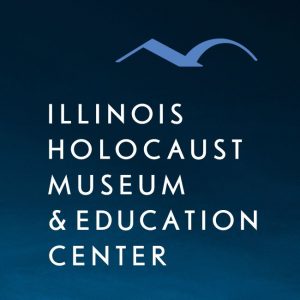 ights, and to discover what influences our decisions to act as bystanders or Upstanders in response to inhumanity. For more information on our onsite and virtual field trips, please click on the link: https://www.ilholocaustmuseum.org/students-educators/field-trips/
ights, and to discover what influences our decisions to act as bystanders or Upstanders in response to inhumanity. For more information on our onsite and virtual field trips, please click on the link: https://www.ilholocaustmuseum.org/students-educators/field-trips/
The Museum has many more resources available including traveling and virtual teaching trunks that allows educators to create meaningful age/grade-appropriate lessons employing award–winning fiction and nonfiction, historical references, and other educational materials. Each trunk has been carefully developed to address State and National Learning Standards, including Common Core State Standards. Teaching Trunks are provided free of charge. https://www.ilholocaustmuseum.org/students-educators/teaching-trunks/
Each year, the Museum offers three Student Leadership Days for students in 5-6 grades, 7-8 grades, and 9-11th. Each program engages students in a variety of activities that inspire them to build leadership skills, explore their roles as citizens, and develop a deeper awareness and understanding of the Holocaust, genocide, and other human rights issues. Students return to their communities equipped to promote greater acceptance and understanding. Students leave with increased knowledge and tools and resources to stand up against injustice and bigotry. https://www.ilholocaustmuseum.org/students-educators/student-leadership-days/
Their Professional Development workshops engages teachers with range of topics around the Holocaust, genocide, civics, and human rights. At each workshop, educators will gain new classroom resources, activities, and content knowledge that can help them with their units. https://www.ilholocaustmuseum.org/students-educators/professional-development/upcoming-trainings/
If you would like to share this information with your District Administrators, Curriculum Coordinators, or other teachers, and they are interested in a short preview, please share this google form and the Education Team will follow up.
101st NCSS Annual Conference Goes Virtual
From the website:
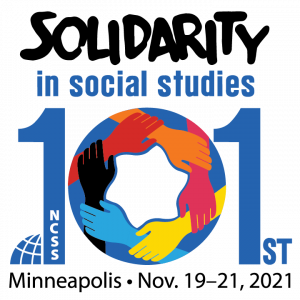 After much deliberation, the NCSS Board of Directors has made the decision to host the 101st Annual Conference as a fully virtual event. (Read the full announcement.)
After much deliberation, the NCSS Board of Directors has made the decision to host the 101st Annual Conference as a fully virtual event. (Read the full announcement.)
The NCSS 101st Annual Conference will be held online from Monday-Sunday, November 15-21, 2021. Last year we delivered the hottest virtual conference of the season, and this year will be no different as we focus on Solidarity in Social Studies.
This year’s conference is designed with you in mind, based on what we have learned from hosting and attending virtual conferences. This is professional learning designed to fit your lifestyle. Our full week will provide you with the most engaging and comfortable environment to experience your best virtual event yet.
You will not need to attend the virtual conference for a full week. Most of the live presentations will be scheduled on Saturday and Sunday, and perhaps during the week in the evening. New recorded sessions will be released each day for on-demand viewing.
- Experience more than 300+ hours of social studies content to increase your professional learning. All sessions will be recorded and available on-demand for registrants until April 30, 2022.
- Get the latest in social studies and law-related education.
- Learn from prominent keynote speakers.
- Explore the virtual exhibit hall highlighting the latest social studies products and services.
- Connect with others via virtual networking.
GeoFest Nebraska

GeoFest 2021 is coming up and we’re excited to see you all! It takes place virtually again this year on Saturday November 13th, 2021 from 10:00-1:30.
We are happy to announce that we will be joined by Dr. Sarah Bednarz from Texas A&M (Retired) and Dr. Joseph Kerski (Esri) to help us with our theme of Teaching Spatial Citizenship.
For more information or to register please visit us on Facebook @GEONEbraska or by visiting the event page at https://www.geonebraska.com/geofest.html
Looking forward to seeing you all there!
Nebraska Story Map Competition 2022
 The Nebraska Story Map Competition encourages students to use a powerful mapping application called geographic information systems (GIS) to research and analyze some aspects of Nebraska. Students will showcase their results in a story map. This online competition is open to students in high school grades 9-12 or middle school grades 4-8. Students can complete a map project in a team of 1 or 2 students.
The Nebraska Story Map Competition encourages students to use a powerful mapping application called geographic information systems (GIS) to research and analyze some aspects of Nebraska. Students will showcase their results in a story map. This online competition is open to students in high school grades 9-12 or middle school grades 4-8. Students can complete a map project in a team of 1 or 2 students.
The 5 best HS + 5 best MS map entries will be awarded $100 each. Two-member student teams will divide the cash award. FYI- we have had no middle school student map entries since 2018. Let’s change this!
This URL Nebraska Story Map Competition 2022 (arcgis.com) provides a description of the competition, showcases last year’s top 5 HS student maps, and tutorials on how to use the GIS mapping software called ArcGIS Online. Contact Dr. Lesli Rawlings at lerawli1@wsc.edu if you have any questions about the competition or want more information.
Bill of Rights Institute Homework Help Series
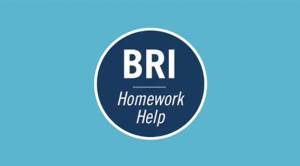
Have you ever looked at your teacher with a puzzled face when they explain history? I know we have. In our new Homework Help Series we break down history into easy to understand 5 minute videos to support a better understanding of American History. The BRI Homework Help Series has videos covering U.S. History, Government, and Civics.
The New York Time and The Learning Network Tutorial Weekly News Quiz
 Every week of the school year, we publish a 10-question interactive quiz to challenge students’ knowledge of the week’s biggest news stories. The quiz invites students to select the missing words or phrases from selections of recent New York Times stories. It also challenges students to discern between real and fake headlines, and to match a mystery photo with the news story it depicts. Practicing with our weekly news quizzes can help students keep up with the news and get in the habit of following current events.
Every week of the school year, we publish a 10-question interactive quiz to challenge students’ knowledge of the week’s biggest news stories. The quiz invites students to select the missing words or phrases from selections of recent New York Times stories. It also challenges students to discern between real and fake headlines, and to match a mystery photo with the news story it depicts. Practicing with our weekly news quizzes can help students keep up with the news and get in the habit of following current events.
2022 John F. Kennedy Profile in Courage in Essay Contest

Describe and analyze an act of political courage by a US elected official who served during or after 1917.
To learn more about political courage, visit Contest Information and FAQs.
All submissions must adhere to contest requirements.
Contest Deadline
The Profile in Courage Essay Contest opens for submissions on September 1, 2021. The contest deadline is January 14, 2022.
- First-place: $10,000
- Second-place: $3,000
- Five Finalists: $1,000 each
- Eight Semi-finalists: $100 each
Get Email Updates
Join our mailing list to get contest tips, updates, and a reminder to submit your essay.
The John F. Kennedy Presidential Library and Museum does not sell or share your personal information or email address.
2022 Summer Professional Development Opportunities in Social Studies
 This document was compiled by the Council of State Social Studies Supervisors as a way to communicate the wealth of professional development opportunities available to social studies educators. A special thanks to all of the organizations who helped contribute to this work and to the many organizations who are offering high quality social studies professional development for social studies teachers across the country. Many of the opportunities below are offered free or low cost, but some opportunities do have a cost. When opportunities are highlighted in yellow, it means there are not yet 2022 updates for that particular program. The document will be updated through the spring of 2022. Please email Stefanie Wager at stefanie.rosenbergwager@gmail.com with any questions, comments, or to add programs to this list.
This document was compiled by the Council of State Social Studies Supervisors as a way to communicate the wealth of professional development opportunities available to social studies educators. A special thanks to all of the organizations who helped contribute to this work and to the many organizations who are offering high quality social studies professional development for social studies teachers across the country. Many of the opportunities below are offered free or low cost, but some opportunities do have a cost. When opportunities are highlighted in yellow, it means there are not yet 2022 updates for that particular program. The document will be updated through the spring of 2022. Please email Stefanie Wager at stefanie.rosenbergwager@gmail.com with any questions, comments, or to add programs to this list.
Civic Learning Across the Disciplines – Designing Discussion as Inquiry with Dr. Paula McAvoy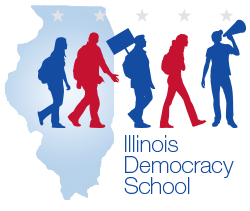
Join the Illinois Democracy School Network as we welcome Dr. Paula McAvoy, Assistant Professor of Social Studies Education, N.C. State University for a timely webinar exploring best practices in using current and controversial issue discussions in the classroom. Dr. McAvoy will share attributes of a good discussion, using discussion as inquiry, model a tug of war activity as well as answer participant questions. Walk away with a deeper understanding of practices aligned to the Pedagogy Companion of the Educating for American Democracy Roadmap that embrace a commitment to learn about and teach full and multifaceted historical and civic narratives with a focus on inclusion and equity in both content and approach.
The Illinois Civics Hub offers additional professional development free of charge for educators.
NCSS Pre-Conference Clinic Korea’s Place in Teaching Social Studies
Are you ready for #NCSS21? Are you ready to join us for another amazing NCSS Clinic opportunity? Would you like to receive a $150.00 stipend to offset costs associated with attending NCSS Virtual Conference? Would you like to learn more about our FREE social studies modules, become part of a larger community, be eligible for future PD opportunities, and be eligible to apply for future travel to Korea? Are you ready to learn how to #TeachKorea?
Clinic participants will receive a $150 stipend!
 WHAT: NCSS PreConference Clinic
WHAT: NCSS PreConference Clinic
TITLE: Korea’s Place in Teaching Social Studies
WHEN: TWO SESSIONS:
- Monday, November 15th from 7:00 — 8:30 PM Eastern
- Tuesday, November 16th from 7:00 — 8:30 PM Eastern
*participants are expected to complete both sessions
WHERE: Online Zoom platform
WHAT YOU WILL EXPERIENCE: The rich history and culture of Korea coupled with important recent developments provide multiple opportunities to engage students. Teachers will learn about lessons aligned to four disciplines of Social Studies:
- History: Students explore cultural diffusion along the Silk Road and the important role of Korea in trade and exchange along this important trade route.
- Geography: Student analysis of maps and various sources centered on Korea will lead students to answer the essential question: What is the site and situation of Korea?
- Economics: Students investigate how comparative advantage and related concepts drive global trade and can explain the growth and importance of South Korea in the global economy.
- Civics: Students will explore concepts of citizenship, including a citizen’s rights and responsibilities in a democracy, based on readings from South Korea and the United States.
This interactive session allows teachers to use and consider how they might adapt materials for the specific populations they teach.
For more information and the find the link to register for NCSS and the Clinic, go to: https://www.worldhistoryde.org/teacher-network/ncss-clinic-koreas-place-in-teaching-social-studies/
Virtual Classroom Visit with a Harvard Student Archaeologist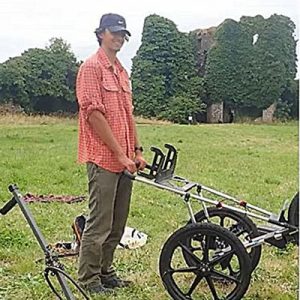
What is archaeology? Why is it important to know the past and the methods used to interpret it? What questions are answered by archaeology? How do you become an archaeologist?
Invite a Harvard archaeology student to your class to discuss how they study the human past and what they are learning. Each student speaker will share a short video in advance about their work and respond to student questions via video call. Interview an archaeologist and bring your social studies to life.
How to Reserve a Free Virtual Classroom Visit with a Harvard Student Archaeologist
Registration opens October 4.
- Teacher selects a Harvard student archaeologist presenter
- Teacher completes this form with a choice of dates and times
- The museum contacts the teacher to discuss details
- The museum sends a confirmation email and the video link for student viewing
- A day in advance, the Harvard student calls the teacher to introduce themselves
- On the reserved day, the Harvard student responds to the teacher’s video call
Thanksgiving Resources
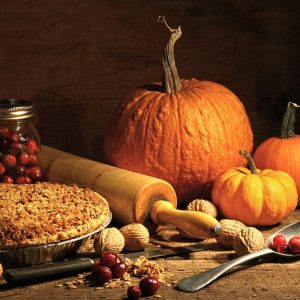 Thanksgiving Day is a national holiday in the United States, and Thanksgiving 2021 occurs on Thursday, November 25. In 1621, the Plymouth colonists and Wampanoag Native Americans shared an autumn harvest feast that is acknowledged today as one of the first Thanksgiving celebrations in the colonies. For more than two centuries, days of thanksgiving were celebrated by individual colonies and states. It wasn’t until 1863, in the midst of the Civil War, that President Abraham Lincoln proclaimed a national Thanksgiving Day to be held each November.
Thanksgiving Day is a national holiday in the United States, and Thanksgiving 2021 occurs on Thursday, November 25. In 1621, the Plymouth colonists and Wampanoag Native Americans shared an autumn harvest feast that is acknowledged today as one of the first Thanksgiving celebrations in the colonies. For more than two centuries, days of thanksgiving were celebrated by individual colonies and states. It wasn’t until 1863, in the midst of the Civil War, that President Abraham Lincoln proclaimed a national Thanksgiving Day to be held each November.
State Statute provides that all Nebraska schools should recognize and commemorate specific holidays throughout the school year ((6)Appropriate patriotic exercises suitable to the occasion shall be held under the direction of the superintendent in every public, private, denominational, and parochial school on George Washington’s birthday, Abraham Lincoln’s birthday, Dr. Martin Luther King, Jr.’s birthday, Native American Heritage Day, Constitution Day, Memorial Day, Veterans Day, and Thanksgiving Day, or on the day or week preceding or following such holiday, if the school is in session.). With one of those holidays being Thanksgiving, the following is a list of resources to help commemorate the holiday.
- Thanksgiving Lesson Plans and Teaching Extensions (Scholastic)
- Giving Thanks (NativeKnowledge 360)
- A Thanksgiving Lesson Plan Booklet from a Native American Perspective – Elementary (Oklahoma City Public Schools)
- Harvest Ceremony: Beyond the Thanksgiving Myth, A Study Guide (National Museum of the American Indian)
- You Are the Historian: Investigating the First Thanksgiving (Plimoth Patuxet Museums)
- Educator Resources for Thanksgiving (BrainPOP)
- Five Ideas to Change Teaching about Thanksgiving, in Classrooms and at Home (Smithsonian Magazine)
- Thanksgiving Teacher Resources (Archaeology Education Clearinghouse)
October 2021 Newsletter
Books of the Month
Hello, Nebraska social studies community! Since I can remember I have been an avid reader. As the Amazon truck keeps pulling up to my house to dump off more books, I thought it would be a great idea to share great reads about historical events, monthly observances, topics in education, and what’s on my bookshelf with you! Even better, if you have a suggestion that you would like to share, please send me an email, call, or text and I will make sure to include your book and give you credit in the next newsletter!
 *One Hundred Years of Solitude by Gabriel Garcia Marquez
*One Hundred Years of Solitude by Gabriel Garcia Marquez
One Hundred Years of Solitude is a landmark 1967 novel by Colombian author Gabriel García Márquez that tells the multi-generational story of the Buendía family, whose patriarch, José Arcadio Buendía, founded the town of Macondo. The novel is often cited as one of the supreme achievements in literature.

Bird of Paradise: How I Became Latina by Raquel Cepeda
In 2009, Raquel Cepeda embarked on an exploration of her genealogy using ancestral DNA testing to uncover the truth about her family and the tapestry of races and ethnicities that came together in an ambiguous mix in her features, resulting in “a beautiful story of reconciliation and redemption” (Huffington Post) with her identity and what it means to be Latina.
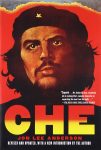 Che: A Revolutionary Life by Jon Lee Anderson
Che: A Revolutionary Life by Jon Lee Anderson
Acclaimed around the world and a national best-seller, this is the definitive work on Che Guevara, the dashing rebel whose epic dream was to end poverty and injustice in Latin America and the developing world through armed revolution.
The Death of Artemio Cruz by Carlos Fuentes
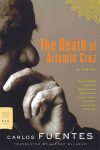
As the novel opens, Artemio Cruz, the all-powerful newspaper magnate and land baron, lies confined to his bed and, in dreamlike flashes, recalls the pivotal episodes of his life. Carlos Fuentes manipulates the ensuing kaleidoscope of images with dazzling inventiveness, layering memory upon memory, from Cruz’s heroic campaigns during the Mexican Revolution, through his relentless climb from poverty to wealth, to his uneasy death. Perhaps Fuentes’s masterpiece, The Death of Artemio Cruz is a haunting voyage into the soul of modern Mexico.
 *The Punch by John Feinstein
*The Punch by John Feinstein
When an on-court fight broke out between the Houston Rockets and the LA Lakers just before Christmas 1977, Rudy Tomjanovitch raced to break it up. He was met by Kermit Washington’s fist. This is the story of how one punch changed two lives, the NBA and how we think about basketball, forever.
*The Last Stand: Custer, Sitting Bull, and the Battle of the Little Bighorn by Nathaniel Philbrick
The Last Stand is Philbrick’s monumental reappraisal of the epochal clash at the Little Bighorn in 1876 that gave birth to the legend of Custer’s Last Stand. Bringing a wealth of new information to his subject, as well as his characteristic literary flair, Philbrick details the collision between two American icons- George Armstrong Custer and Sitting Bull-that both parties wished to avoid, and brilliantly explains how the battle that ensued has been shaped and reshaped by national myth.
 *The Last Gunfight by Jeff Guinn
*The Last Gunfight by Jeff Guinn
On the afternoon of October 26, 1881, in a vacant lot in Tombstone, Arizona, a confrontation between eight armed men erupted in a deadly shootout. The Gunfight at the O.K. Corral would shape how future generations came to view the Old West. Wyatt Earp, Doc Holliday, and the Clantons became the stuff of legends, symbolic of a frontier populated by good guys in white hats and villains in black ones. It’s a colorful story—but the truth is even better.
*Leveraging Leadership by Paul Bambrick-Santoyo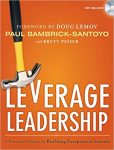
Paul Bambrick-Santoyo (Managing Director of Uncommon Schools) shows leaders how they can raise their schools to greatness by following a core set of principles. These seven principles, or “levers,” allow for consistent, transformational, and replicable growth. With intentional focus on these areas, leaders will leverage much more learning from the same amount of time investment. Fundamentally, each of these seven levers answers the core questions of school leadership: What should an effective leader do, and how and when should they do it.
 *The Leadership Challenge by James Kouzes and Barry Posner
*The Leadership Challenge by James Kouzes and Barry Posner
The Leadership Challenge is the gold-standard manual for effective leadership, grounded in research and written by the premier authorities in the field. With deep insight into the complex interpersonal dynamics of the workplace, this book positions leadership both as a skill to be learned, and as a relationship that must be nurtured to reach its full potential.
*Denotes books personally recommended by Ebony McKiver
Hispanic Heritage Month
From website: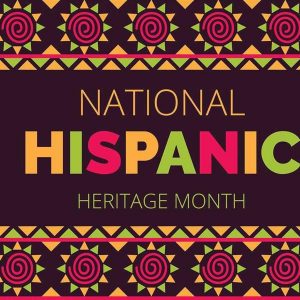
September 15 to October 15 is National Hispanic American Heritage Month
The Library of Congress, National Archives and Records Administration, National Endowment for the Humanities, National Gallery of Art, National Park Service, Smithsonian Institution and United States Holocaust Memorial Museum join in paying tribute to the generations of Hispanic Americans who have positively influenced and enriched our nation and society.
We celebrate Hispanic Heritage Month to recognize the achievements and contributions of Hispanic American champions who have inspired others to achieve success. Discover documents, exhibits, films, blog posts and more from the National Archives and Presidential Libraries that highlight Hispanic culture.
Below are resources that can help you with your classroom lessons to celebrate Hispanic Heritage Month:
National Endowment for the Humanities – Hispanic and Latino Heritage and History in the United States
United States Census Bureau – National Hispanic Heritage Month: Stories, Population Data, and Trade Figures
Smithsonian Folklife Festival Program
Pulitzer Center: Celebrating Latinx Community Organizations and Leaders
National Archive: Primary Sources and Hispanic Heritage Month: A Wonderful Combination
National Park Services:500 Years of Hispanic and Latino History and Heritage
A Latinx Resource Guide: Civil Rights Cases and Events in the United States
Library of Congress: Podcasts on Hispanic Authors
The Disagreement Project
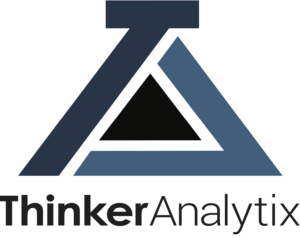 From website:
From website:
The goal of this project is to increase your students ability to engage in productive dialogue with a person who disagrees with them about something important.
Students will have the opportunity to map their arguments and engage in an interactive textbook to improve their argument analysis skills. Each lesson is broken down into very small chunks (short videos and practice exercises) so that you can work through it at your own pace. It will take you about 5-8 hours to work all the way through, if you want to finish everything.
101st NCSS Annual Conference Goes Virtual
From the website:
After much deliberation, the NCSS Board of Directors has made the decision to host the 101st Annual Conference as a fully virtual event. (Read the full announcement.)
The NCSS 101st Annual Conference will be held online from Monday-Sunday, November 15-21, 2021. Last year we delivered the hottest virtual conference of the season, and this year will be no different as we focus on Solidarity in Social Studies.
This year’s conference is designed with you in mind, based on what we have learned from hosting and attending virtual conferences. This is professional learning designed to fit your lifestyle. Our full week will provide you with the most engaging and comfortable environment to experience your best virtual event yet.
You will not need to attend the virtual conference for a full week. Most of the live presentations will be scheduled on Saturday and Sunday, and perhaps during the week in the evening. New recorded sessions will be released each day for on-demand viewing.
- Experience more than 300+ hours of social studies content to increase your professional learning. All sessions will be recorded and available on-demand for registrants until April 30, 2022.
- Get the latest in social studies and law-related education.
- Learn from prominent keynote speakers.
- Explore the virtual exhibit hall highlighting the latest social studies products and services.
- Connect with others via virtual networking.
October 2021 LFI Webinar Series: Learning with the Libraries
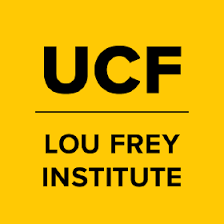 From website:
From website:
On October 6th at 4:00pm eastern, Joshua Montanari, Education Specialist at the Jimmy Carter Presidential Library and Museum will present “Going to the Sources: Jimmy Carter and the Camp David Accords”. This webinar will assist participants in contextualizing the circumstances of the Camp David Accords through the lens of civics and analysis of primary sources from the Carter Library and National Archives.
Educating for American Democracy Educator Resources
From website: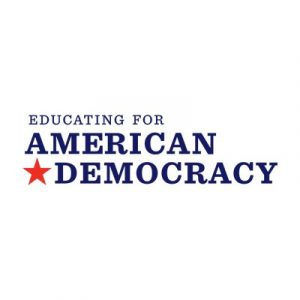
The curated resources linked below are an initial sample of the resources coming from a collaborative and rigorous review process with the EAD Content Curation Task Force.
Each individual resource highlighted on the EAD Educator Resource section goes through a collaborative and rigorous review process over an extended period of time with the EAD Content Curation Task Force before joining our collection, we therefore ask for your patience during the review. The process begins with many organizations participating in an information session exploring the goals of EAD and the content of the Roadmap and Pedagogy Companion. After gaining a deeper understanding, organizations submit resources to be reviewed by the committee of educators. During the submission process, the organizations are able to identify the grade band, content themes, design challenges, and driving questions within which each individual item best fits. Each individual submission is then independently reviewed by two educators using a rubric developed by the EAD Content Curation Task Force, which includes the following categories:
- Alignment to EAD Themes and Driving Questions
- Inquiry
- Rigor
- Equity: Diversity and Inclusion
- Viewpoint Pluralism
- Equity: Accessibility
Prairie Visions Virtual Writing Workshop
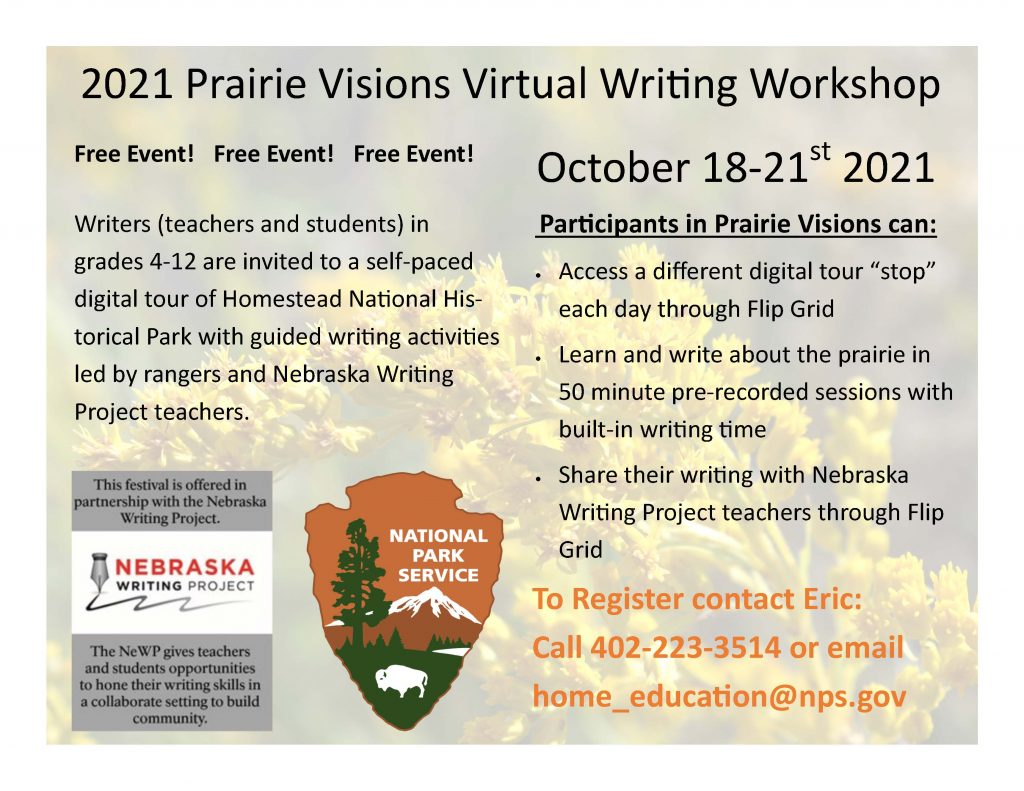
Apply to Become an iCivics Educating for American Democracy Teacher Fellow
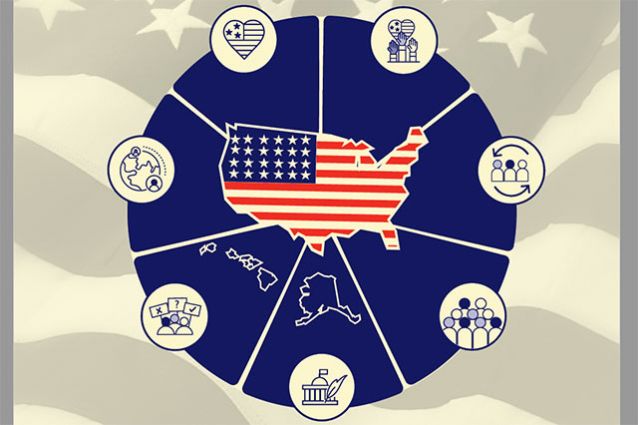 The Roadmap to Educating for American Democracy is a call-to-action to invest in strengthening history and civic learning and to ensure that civic learning opportunities are delivered equitably throughout the country. One of the first steps in implementing the Roadmap is the development of an EAD-aligned early-U.S. History middle school curriculum — and we need the help of dedicated, expert educators like you!
The Roadmap to Educating for American Democracy is a call-to-action to invest in strengthening history and civic learning and to ensure that civic learning opportunities are delivered equitably throughout the country. One of the first steps in implementing the Roadmap is the development of an EAD-aligned early-U.S. History middle school curriculum — and we need the help of dedicated, expert educators like you!
We are accepting applications now through October 15 to join a cohort of 8–10 exceptional, inquiry-driven teachers from across the nation who will collaboratively build the curriculum.
iCivics EAD Teacher Fellowship Benefits & Responsibilities:
- A $4,000 stipend plus additional paid opportunities to engage as an iCivics EAD Teacher Mentor.
- Collaborate and network with other educators and stakeholders.
- Create one unit (about 20 lessons) that will become part of a general year-long curriculum.
- A six-month commitment of approximately 20 hours per month from January 8–June 18, 2022.
Review the application requirements and more details about the fellowship.
We encourage you to consider this opportunity to become a leader in the field and to contribute to the civic education of our youth. If you have any questions, please reach out to Christina Ross. Remember, applications are due October 15!
Nebraska Teaching Moment
Dear Teachers, 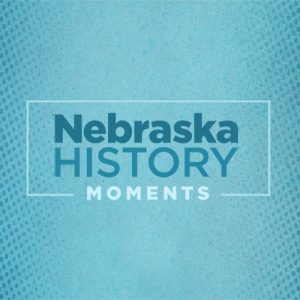
Greetings from History Nebraska! We’re thinking of you as you start your new school year and wish you all the best. Feel free to forward this to friends and they can sign up too!
Just wanted to share 3 good news items with you today PLUS our first post of the school year:
- The Nebraska Teaching Moment is back! I’ll be emailing on Thursdays this school year, now through April.
- Here’s an easy index! Access posts from last year’s Nebraska Teaching Moment email series, organized by topic: Nebraska Teaching Moments Index
-Jessica Stoner, History Nebraska
Schedule Your Capitol Experience Day!
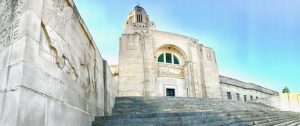 Dear Educator,
Dear Educator,
I am excited to begin accepting reservations to lead your class through our one-day tour of the Nebraska State Capitol featuring the systems that govern our legislative process. Capitol Experience Days focus on legislative systems and include a mock committee hearing and in-person meetings with available government representatives. We aim to give your students an immersive learning experience.
To get a sense of our program and see a sample agenda, visit our Capitol Experience Days page at CivicNebraska.org. We also offer Virtual Capitol Experience, a digital tour that highlights the history of the Legislature and Nebraska state government and includes a list of educator resources.
If you are eager to schedule a Capitol Experience Day for your students and need help getting started, feel free to view the checklist attachment that outlines all the details you’ll need.
I look forward to hearing from you!
Chris McCurdy, Education Specialist at Civic Nebraska
Redistricting Nebraska Materials by League of Women Voters of Lincoln
LWV of Lincoln would like to share recent updated teaching materials on redistricting. We have developed more materials and wanted to share them with social studies teachers across the state!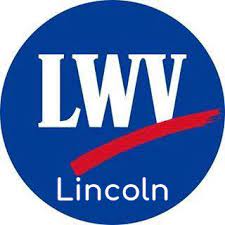
These materials include a complete package for teachers with videos (in English and Spanish) on redistricting, demonstrations of DistrictR–public domain software for district mapping exercises, a jeopardy-like quiz game video, and a variety of quizzes, plus a summary trifold brochure on the process and how it works in Nebraska.
Video Recording Links
- Meant to Represent: Redistricting in Nebraska (Long, English) – https://www.youtube.com/watch?v=s3GIRFNx53o&t=2016
- Meant to Represent: Redistricting in Nebraska (Long, Spanish) – https://www.youtube.com/watch?v=z0dh_p7Aa5s
- Redistricting Overview (Short, English) – https://www.youtube.com/watch?v=zLT5yu5NRDE
Informational Materials
- Redistricting Informational Brochure (English) – https://drive.google.com/file/d/1vgoTvkpL9OTAQsgYQqfy5GZiXO0Bm_1r/view?usp=sharing
- Action Sheet (English and Spanish) – https://drive.google.com/file/d/1-mf3BSqT7OdnDdlvQlti9ou9nHyWWHE7/view?usp=sharing
- LWVNE Redistricting Hub website – https://lwvnebraska.org/redistricting/
- Day of Action Sign-up – https://www.eventbrite.com/e/redistricting-day-of-action-tickets-166261712257
Presentation Materials (Powerpoints)
- Meant to Represent: Redistricting in Nebraska (Long, English) – https://drive.google.com/file/d/1EteQqj-yjd_FWuHv9FE1NRx4rdD31NOe/view?usp=sharing
- Meant to Represent: Redistricting in Nebraska (Long, Spanish) – https://drive.google.com/file/d/1OJj5r9NQeiKTX41RnhqoPPviW74S0uYV/view?usp=sharing
- Redistricting Overview (Short, English) – https://drive.google.com/file/d/1PGqvf88cR0-loa6EAe0nkxN-wlYNYGO2/view?usp=sharing
- Redistricting Overview (Short, Spanish) – https://drive.google.com/file/d/1qBNT1yC4WsT0A5blEWDBSNiw_3zlDYTY/view?usp=sharing
Review Materials
- Jeopardy Review – Whose Line Is It? Redistricting Game Show (English) – https://www.youtube.com/watch?v=dBnQwSW1xZI&t=187
Please let us know if we can further support you on this topic or other voting issues.
Thinkport Education
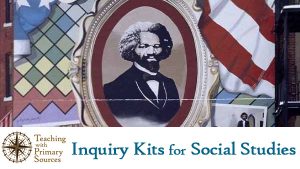 Promote a deeper understanding of history, and explore government and civic life using Library of Congress primary sources. Engage students with primary sources to promote student inquiry and evidence-based reasoning, and apply critical thinking and analysis skills to historical materials.
Promote a deeper understanding of history, and explore government and civic life using Library of Congress primary sources. Engage students with primary sources to promote student inquiry and evidence-based reasoning, and apply critical thinking and analysis skills to historical materials.
Explore theme-based Inquiry Kits that feature thinking questions, primary and secondary sources, and document analysis tools to help you analyze historical materials from the Library of Congress. Or have students learn the research process through a series of self-paced student modules. Practice historical thinking skills, analyze sources, make evidence-based conclusions, and create research projects.
#EconEdMonth Rap Battle Contest
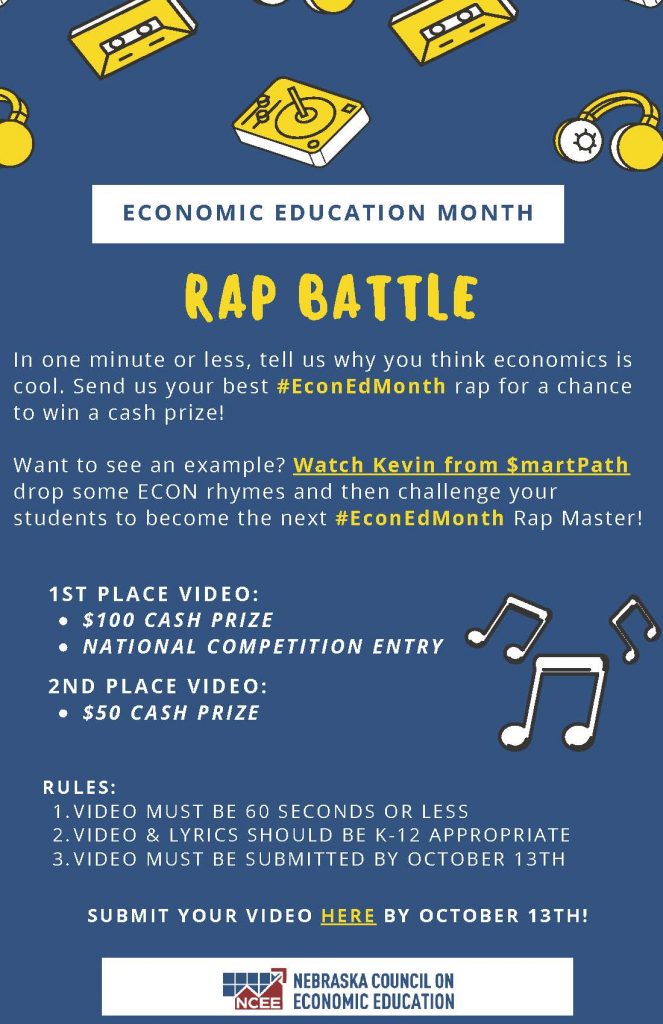
Back to School with Choices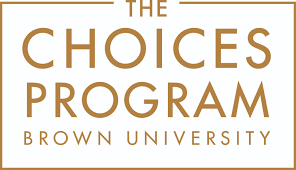
It’s back to school season and that means it is time to make sure you haven’t missed any of the latest materials from the Choices Program! Check out our newest curriculum units, Civics Lessons and Imperial America. This year we’ve also updated our units on terrorism, westward expansion, Cuba, and climate change. Our recent free Teaching with the News lessons cover the COVID-19 pandemic, Juneteenth, and the costs of the War on Terror. We are also happy to be extending the offer for free access to our unit Racial Slavery in the Americas: Resistance, Freedom, and Legacies in Digital Editions through June 2022! Our unit on Japanese American incarceration during WWII is always free, as is our library of more than 1,700 videos that accompany our curriculum units.
Free Digital Editions Unit – Racial Slavery in the Americas: Resistance, Freedom, and Legacies
How does the history of racial slavery shape our world today? This unit provides a wide-ranging overview of racial slavery in the Americas and the opportunity for students to consider how the past shapes the present. This unit is now free in Digital Editions through June 30, 2022.
Free Digital Editions Unit – Japanese American Incarceration in World War II
Students examine U.S.-Japan relations before World War II, experiences of incarcerated Japanese Americans, and ways the Japanese American community and others in the U.S. have remembered incarceration.
Recent Free Teaching with the News Lessons
These free lessons connect your classroom to headlines in the news. Recent lessons include “Processing the Pandemic: Remembering a Year of COVID-19 through Political Cartoons”; “Juneteenth: Symbolism, Ritual, and Meaning”; and “The Costs of War.”
Free Video Library
Our video library features more than 1,700 free short videos (most are 1-4 minutes long) with leading scholars, journalists, practitioners, artists, activists, policy makers, and others addressing topics relevant to our curriculum units.
Endurance22: The Hunt for Shackleton’s Lost Ice Ship
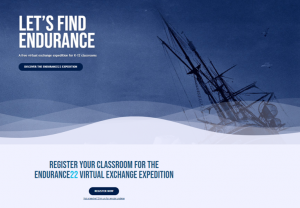 Reach the World, in partnership with the Falklands Maritime Heritage Trust, is thrilled to announce the Endurance22 Expedition to Antarctica, the newest and largest virtual exchange expedition in organizational history! The Endurance22 Expedition will search for Sir Ernest Shackleton’s sunken ship, Endurance, the most famous undiscovered shipwreck in the world. Reach the World Invites K-12 educators and students to access amazing free content for your classroom as you join a world-class team of explorers!
Reach the World, in partnership with the Falklands Maritime Heritage Trust, is thrilled to announce the Endurance22 Expedition to Antarctica, the newest and largest virtual exchange expedition in organizational history! The Endurance22 Expedition will search for Sir Ernest Shackleton’s sunken ship, Endurance, the most famous undiscovered shipwreck in the world. Reach the World Invites K-12 educators and students to access amazing free content for your classroom as you join a world-class team of explorers!
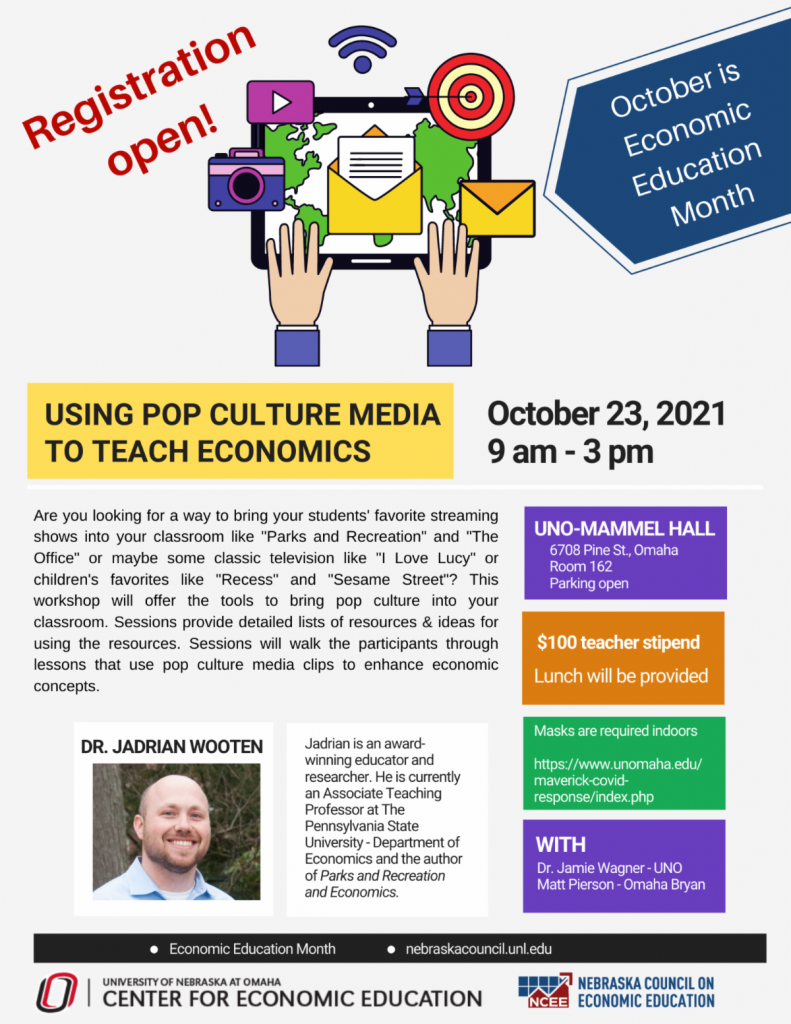
Economics Poster Competition
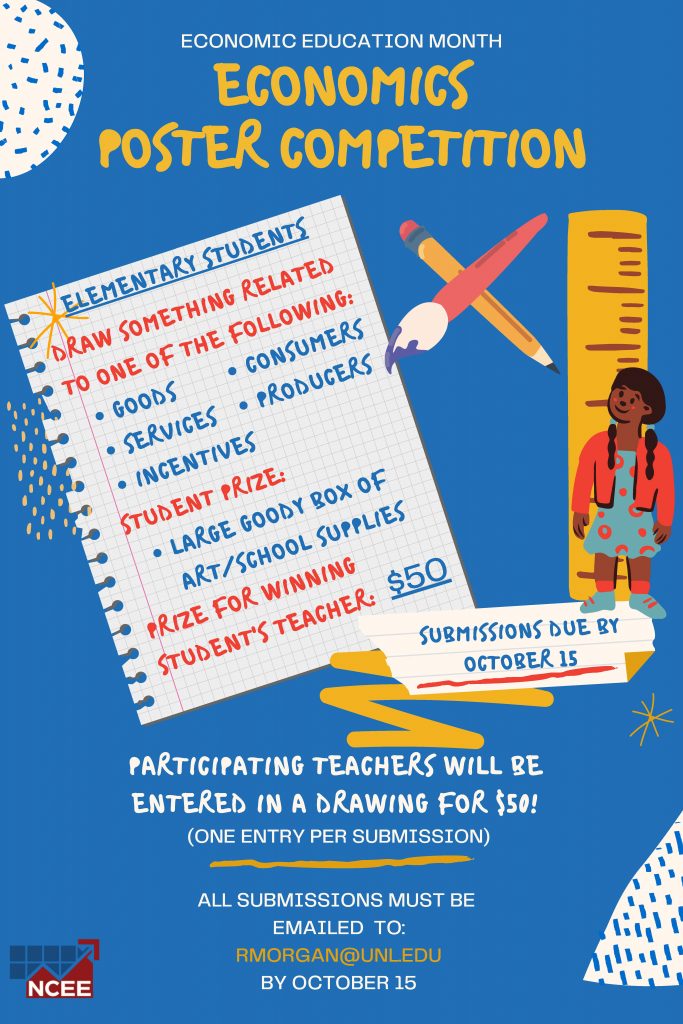
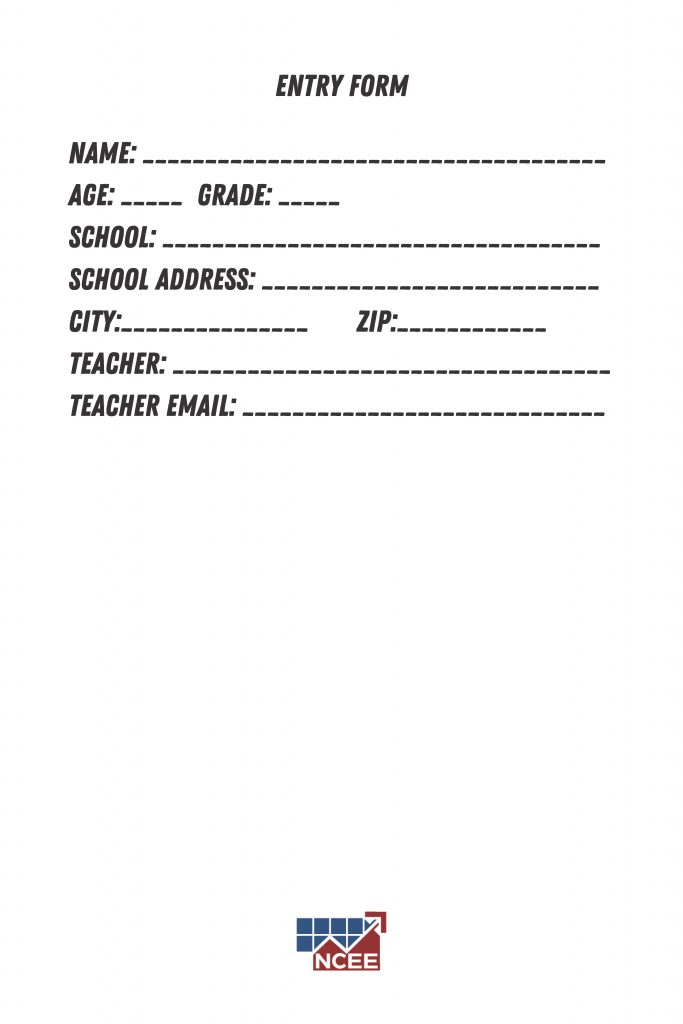
September 2021 Newsletter
Addressing Disrupted Instruction in the Social Studies: Recommendations on a Matter of Equity and National Importance
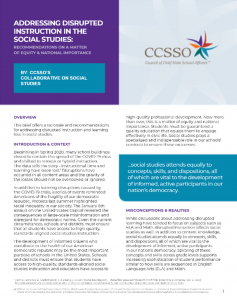 OVERVIEW
OVERVIEW
This brief offers a rationale and recommendations for addressing disrupted instruction and learning loss in social studies.
INTRODUCTION & CONTEXT
Beginning in Spring 2020, many school buildings closed to contain the spread of the COVID-19 virus and shifted to remote or hybrid instruction. The data tells the story – instructional time and learning have been lost.1 Disruptions have occurred in all content areas and the gravity of the losses should not be overlooked or ignored.
The development of informed citizens who contribute to the health of our American democratic republic may be the most important purpose of schools in the United States. Schools and districts must ensure that students have access to high-quality, standards-aligned social studies instruction and educators have access to high-quality professional development. Now more than ever, this is a matter of equity and national importance. Students must be guaranteed a quality education that equips them to engage effectively in civic life. Social studies plays a specialized and indispensable role in our schools’ curricula to ensure these outcomes.
United States Senate Youth Program
Nebraska Social Studies educators! The United States Senate Youth Program application is now available! Encourage your high school juniors and seniors to apply! Application deadline is 4pm CST on September 24, 2021!
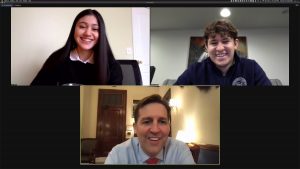
US Senator Ben Sasse of Nebraska speaks with his delegates Claire Doyle and Dominic Mendlik on Zoom during the United States Senate Youth Program on Tuesday, March 23, 2021. One hundred and four high school student delegates – two from each state, the District of Columbia, and the Department of Defense Education Activity – take part in the 59th annual United States Senate Youth Program held online (because of the COVID-19 Pandemic) on March 14-17, 2021 and numerous Senate Zoom meeting from February 17 to March 30, 2021. (© Photo by Jakub Mosur and Erin Lubin).
From the website:
THE 60TH ANNUAL UNITED STATES SENATE YOUTH PROGRAM IS BEING PLANNED FOR MARCH 5–12, 2022 IN WASHINGTON, D.C. THE PROGRAM MAY BE HELD ONLINE PENDING PUBLIC HEALTH GUIDANCE, TO BE DETERMINED IN THE FALL OF 2021.
Delegates will hear major policy addresses by senators, cabinet members, officials of the Departments of State and Defense, leaders of other federal agencies and senior members of the national media. Delegates also traditionally participate in a meeting with a justice of the U.S. Supreme Court and the president of the United States. Most speaking events include in-depth question and answer sessions.
The Hearst Foundations will pay all expenses for Washington Week including transportation, hotel and meals if held in person. The Department of Defense (DoD) annually provides a team of competitively selected men and women officers to serve as mentors and chaperones for the student delegates, and a registered nurse, licensed physician and professional security team are in place at all times throughout an in-person week.
101st National Council for the Social Studies Annual Conference

From the website:
Join Your Social Studies Colleagues in Minneapolis, November 19–21, 2021!
The Centennial Celebration continues with the 101st NCSS Annual Conference, co-hosted by the American Bar Association’s Division for Law-Related Education, the Minnesota Council for the Social Studies and the National Council for Geographic Education in Minneapolis, November 19-21, 2021. Join your social studies colleagues for the largest annual gathering of K-12 social studies classroom teachers, college and university faculty members, curriculum designers and specialists, district and state social studies supervisors, international educators, and social studies discipline leaders.
- Network with your social studies colleagues
- Attend 400+ sessions to increase your professional learning
- Get the latest in social studies and geography education
- Gain valuable CEUs and college credit
- Visit more than 75+ exhibitors highlighting the latest social studies products and services
Nebraska Instructional Materials Collaborative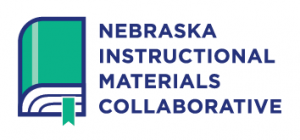
Social Studies now has a tab on the Nebraska Instructional Materials Collaborative website! The Social Studies’ Nebraska Instructional Materials Collaborative seeks to guide and/or remind educators what they should be looking for when selecting high quality social studies instructional materials. Social Studies Education continues to evolve and as a result, we will share resources and materials that empower Nebraska school districts, school systems, and social studies educators in selecting and implementing high quality social studies instructional materials.
Nebraska Studies Now in Spanish!
From the website:
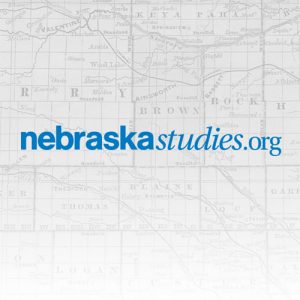 Welcome students, teachers, and history buffs of all ages! Nebraska Studies puts the history of the state at your fingertips, from its very beginning to the 21st century. On this site you can meet the people and explore the events that have shaped this state, through archival photos, historic documents, personal letters, special video segments, informative maps, supplemental activities, pertinent lessons, and much more.
Welcome students, teachers, and history buffs of all ages! Nebraska Studies puts the history of the state at your fingertips, from its very beginning to the 21st century. On this site you can meet the people and explore the events that have shaped this state, through archival photos, historic documents, personal letters, special video segments, informative maps, supplemental activities, pertinent lessons, and much more.
And even better, the entire website is now in Spanish as well!
Nebraska Geoinquiries
From the website: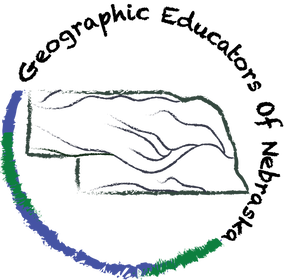
In the spring of 2021 the Geographic Educators of Nebraska received a COVID-19 Educator Relief Fund grant from National Geographic Education for the development of materials to be used by teachers in the state to help teach geography during the global COVID-19 pandemic. A team of GEON members developed, edited, and tested the materials that could then be used by teachers across the state of Nebraska.
For more lesson ideas be sure to check out esri’s Geoinquiries.
National Humanities Center Webinars
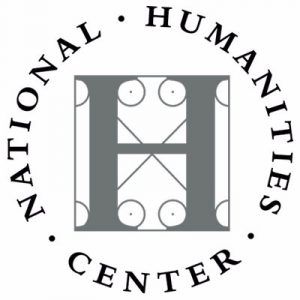 From the website:
From the website:
Live, interactive webinars connect educators with scholars and experts in humanities fields to discuss compelling topics. Webinars are free of charge but require registration.
With a focus on the integration of scholarship and content, inquiry-based pedagogy, and emerging technologies, NHC Education Programs encourage the growth of education professionals in ways that directly impact the classroom. This project-based approach supports the development of classroom-ready instructional materials, research opportunities, and learning experiences.
Through partnerships and in collaboration with professional organizations, educational institutions, and scholarly experts, NHC Education Programs leverage the Center’s resources to strengthen the role of the humanities within the cultural landscape. We invite educators at all levels to join this conversation about how the humanities offer unique and powerful ways to view our complex world.
September 11th Resources
For some of us the events of September 11th seem like yesterday. While for others the last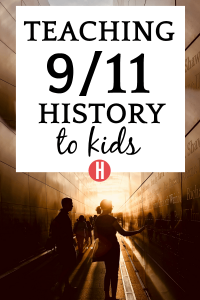 twenty years have been an eternity. This year marks the 20th anniversary of the 9/11 attacks on U.S. soil. It is a time to remember the courage of so many firefighters, paramedics, New York policemen and New York’s Port Authority Officers that sacrificed their lives to save others, and a time to honor the memory of all those who perished at Shanksville, Pennsylvania, the Pentagon and the Twin Towers. It is a time to show reverence for all the lives lost in just 102 minutes of the clock. As Americans, we still remember and we must never forget.
twenty years have been an eternity. This year marks the 20th anniversary of the 9/11 attacks on U.S. soil. It is a time to remember the courage of so many firefighters, paramedics, New York policemen and New York’s Port Authority Officers that sacrificed their lives to save others, and a time to honor the memory of all those who perished at Shanksville, Pennsylvania, the Pentagon and the Twin Towers. It is a time to show reverence for all the lives lost in just 102 minutes of the clock. As Americans, we still remember and we must never forget.
Feel free to use the following September 11-themed resources that include lesson plans, news stories, videos, and other instructional materials to help students comprehend the 9/11 attacks and their lasting impact on the United States and the world. As well as why it was a transformative moment in U.S. history.
Scholastic – Teaching September 11: Powerful Resources About Hope and Understanding
U.S. Department of Education – 9/11 Materials for Teachers
Morningside Center for Teaching Social Responsibilities – 9/11 Anniversary Teaching Guide
Smithsonian National Museum of American History – September 11 Bearing Witness to History
The Teacher’s Corner – Thematic Units: September 11
TeachHub.com – Classroom Activities: Commemorating September 11th
Constitution Day Resources
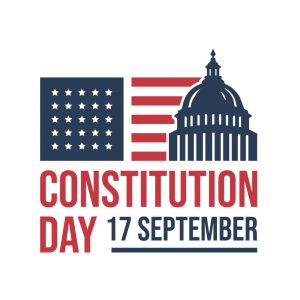
“On September 17, 1787, the delegates to the Constitutional Convention met for the last time to sign the document they had created. To commemorate this day, all Americans are encouraged to observe this important day in our nation’s history by attending local events in your area. Celebrate Constitution Day through activities, learning, parades and demonstrations of our Love for the United State of America and the Blessings of Freedom Our Founding Fathers secured for us.” -ConstitutionDay.com
The following links provide resources for educators looking to celebrate and teach Constitution Day on Thursday, September 17, 2020.
Library of Congress – Constitution Day Teacher Resources
U.S. Department of Education – Commemorating Constitution Day and Citizenship Day
National Constitution Center – Constitution Day
DocsTeach – Bring the Constitution to Life!
iCivics – Constitution Day Lesson Plans
National Constitution Center – To Sign or Not to Sign: The Ultimate Constitution Day Lesson Plan
National Archives – Exploring the United States Constitution E-Book
Center for Civic Education – Constitution Day!
American Bar Association – Constitution Day 2021
Bill of Rights Institute – Celebrate Constitution Day Live!
Nebraska Agriculture in the Classroom
From the website:
Nebraska Agriculture in the Classroom (AITC) is a statewide program that helps K-12 students and teachers develop an awareness and understanding that agriculture is their source of life’s necessities. AITC has a long history of creating resources tied to state education standards to assist teachers in connecting their students to their source of food, fiber, and fuel – agriculture!
and teachers develop an awareness and understanding that agriculture is their source of life’s necessities. AITC has a long history of creating resources tied to state education standards to assist teachers in connecting their students to their source of food, fiber, and fuel – agriculture!
Agriculture in the Classroom ® is a program coordinated by the United States Department of Agriculture (USDA). In Nebraska, the Agriculture in the Classroom program is managed by the Nebraska Farm Bureau Foundation, whose mission is to engage youth, educators, and the general public to promote an understanding of the vital importance of agriculture in the lives of all Nebraskans.
Nebraska Agriculture in the Classroom
- Offers materials to encourage active learning with hands-on activities for youth.
- Creates instructional materials aligned to Nebraska State Standards.
- Equips teachers with free programs and resources to bring agriculture alive in the classroom.
Smithsonian Institute Traveling Exhibition Services – Crossroads: Change in Rural America
 From the website:
From the website:
In 1900, about 40% of Americans lived in rural areas, By 2010, less than 18% of the U.S. population lived in rural areas. In just over a century, massive economic and social changes moved millions of Americans into urban areas. Yet, only 10% of the U.S. landmass is considered urban.
Many Americans consider rural communities to be endangered and hanging on by a thread—suffering from brain drain, inadequate schools, and a barren, overused landscape. Why should revitalizing the rural places left behind matter to those who remain, those who left, and those who will come in the future? Because there is much more to the story of rural America.
Crossroads: Change in Rural America offers small towns a chance to look at their own paths to highlight the changes that affected their fortunes over the past century. The exhibition will prompt discussions about what happened when America’s rural population became a minority of the country’s population and the ripple effects that occurred.
Next Appearing at:
Plains Historical Society , Kimball, Nebraska – 9/11/2021 – 9/30/2021
Archeology Read Along with History Nebraska
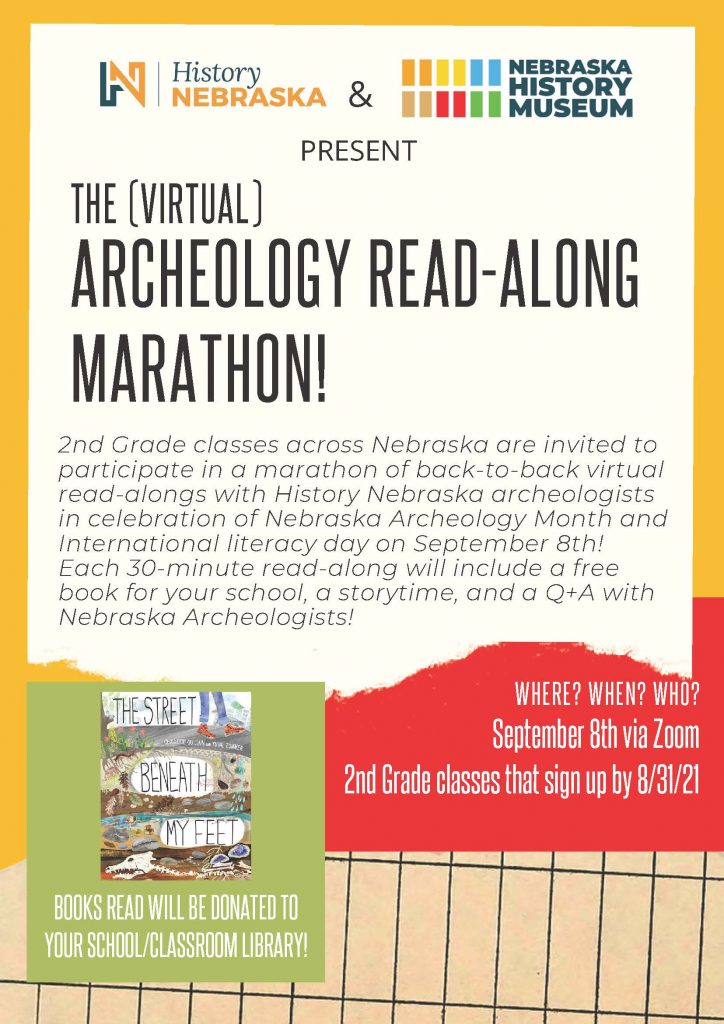
Nebraska ESU Virtual Field Trip Offerings
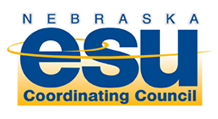 Take students beyond their classrooms to explore the great state of Nebraska! Virtual field trips now present the opportunity to students to explore the Nebraska panhandle, Chimney Rock, fossil beds, and even a trip along the transcontinental railroad! With over 130 activities, you are sure to find something that will align to state standards while engaging your students in Nebraska specific history!
Take students beyond their classrooms to explore the great state of Nebraska! Virtual field trips now present the opportunity to students to explore the Nebraska panhandle, Chimney Rock, fossil beds, and even a trip along the transcontinental railroad! With over 130 activities, you are sure to find something that will align to state standards while engaging your students in Nebraska specific history!
Founders Online
From the website:
In 2010, the National Archives, through its National Historical Publications and Records Commission (NHPRC), entered into a cooperative agreement with The University of Virginia Press to create this site and make freely available online the historical documents of the Founders of the United States of America.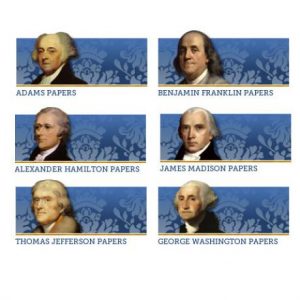
Through this website, you can read and search through thousands of records from George Washington, Benjamin Franklin, Alexander Hamilton, John Jay, John Adams, Thomas Jefferson, and James Madison and see firsthand the growth of democracy and the birth of the Republic.
Now, for the first time, users can freely access the written record of the original thoughts, ideas, debates, and principles of our democracy. You can search across the records of all seven Founders and read first drafts of the Declaration of Independence, the spirited debate over the Constitution and Bill of Rights, and the very beginnings of American law, government, and our national story. You can compare and contrast the thoughts and ideas of these seven individuals and their correspondents as they discussed and debated through their letters and documents.
Teaching with Primary Sources Workshop (Midwest Region)
From the website:
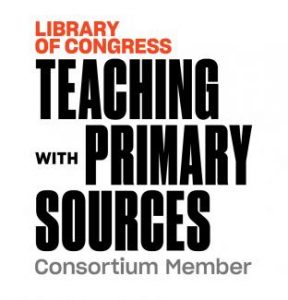 Earn 25 PD Hours!
Earn 25 PD Hours!
Gain knowledge and skills needed to utilize digital primary sources from the Library of Congress website, create activities and lessons that facilitate the Common Core Standards, and engage students in active learning while developing critical thinking skills and constructing knowledge. This course is self-paced and can be taken for professional development hours. For more information email Judy Bee at jbee@ilstu.edu.
The workshops require two online Zoom meetings with lessons and activities to be completed online on your own.
*Please note you must complete “The Fundamentals of Primary Source Instruction” workshop before registering for “Advanced Primary Source Instruction”.
- The Fundamentals of Primary Source Instruction – requires online Zoom meetings on Tuesday, September 21 (4:00-5:30) Central Time and Tuesday, December 7 (4:00 – 5:30) Central Time.
- (*Prerequisite-completed The Fundamentals of Primary Source Instruction) Advanced Primary Source Instruction -requires online Zoom meetings on Thursday, September 23 (4:00 – 5:30) Central Time and Thursday, December 9 (4:00 – 5:30) Central Time
Nebraska Financial Education Network Partnership Summit
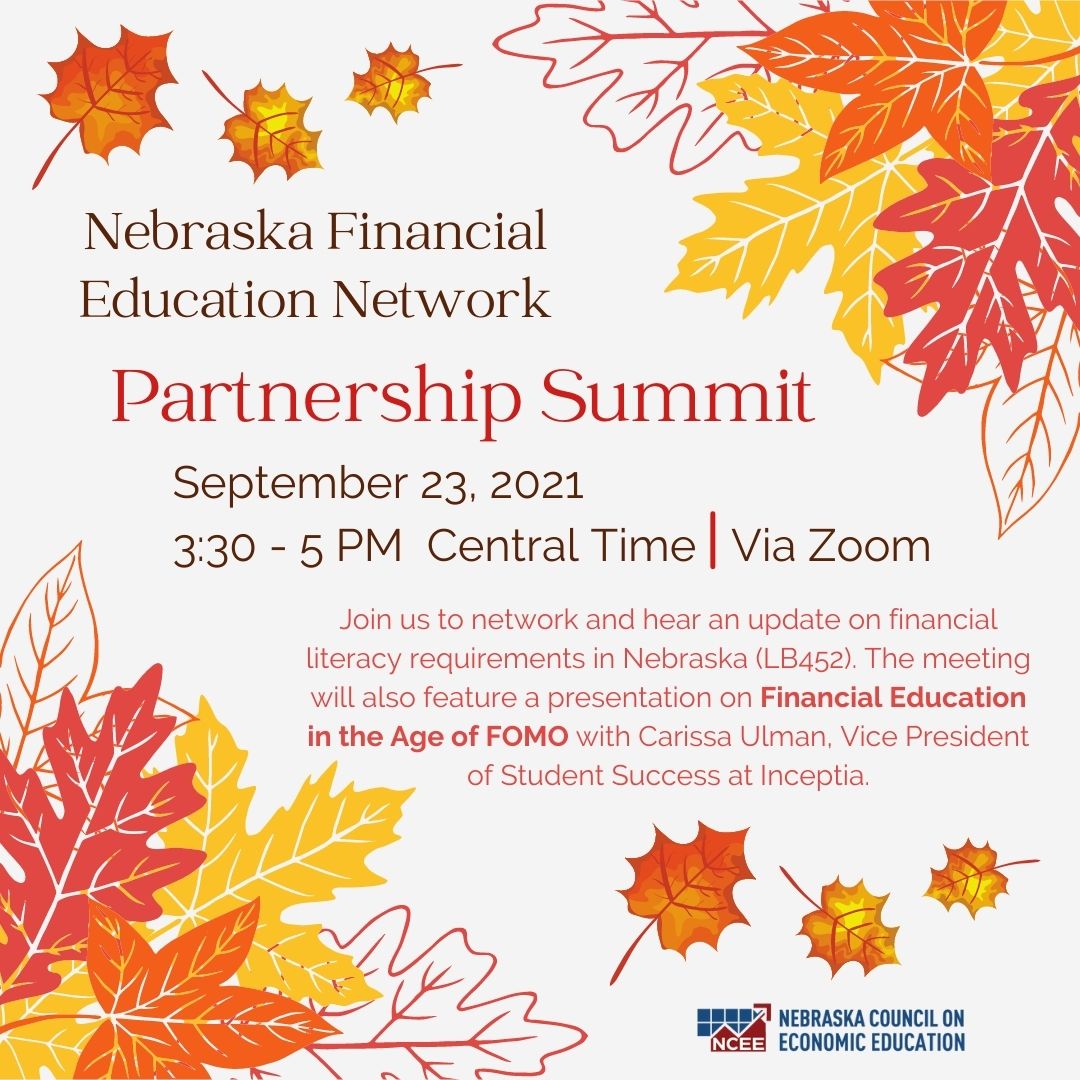
Stock Market Game
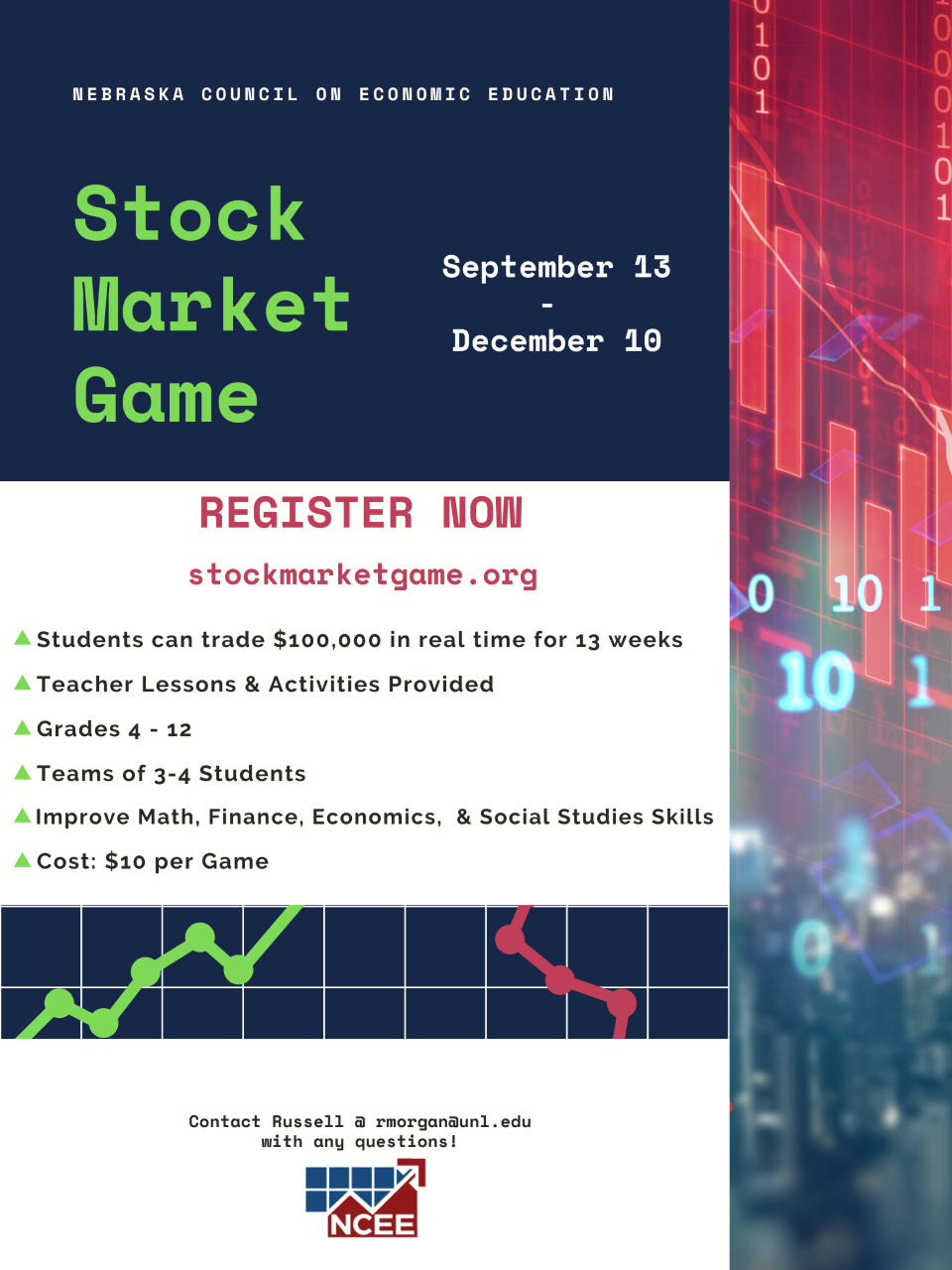
History Hub
From the website:

What is History Hub?
History Hub is a crowdsourcing platform sponsored by the National Archives. It is a place to ask questions, share information, work together, and find people based on their experience and interests. Experts from the National Archives as well as other experts, history enthusiasts, and citizen archivists are available to help with your research.
What can I do with History Hub?
History Hub offers tools like discussion boards, blogs, and community pages to bring together experts and researchers interested in American history. Think of it as a one-stop shop for crowdsourcing information related to your research subject.
Why is the National Archives offering History Hub?
We hope to connect with and better serve customers interested in the historic records we hold.
GerryMander The Game: A Voting District Puzzle Game
Our very own Nebraska Unicameral Legislature is beginning meetings on how to draw district lines in our state. Want to bring current events to your classroom, this is just one way to do it!
From the website:
GerryMander is a simple puzzle game designed to show how gerrymandering can be used to rig an election. In GerryMander, you draw voting districts to favor your party and win the election. Players can use real-world strategies like packing (Squishing opposing voters into a single district) and cracking (Breaking up key voter groups into separate districts) to beat each puzzle. With these strategies players can see how Gerrymandering works while learning about how it happens in the real world.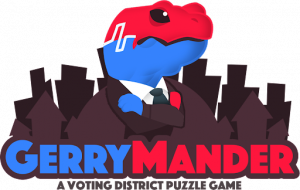
GerryMander was inspired by the ongoing supreme court case, Gill v. Whitford. The goal of GerryMander was to design a tool that demonstrates the bipartisan impact of gerrymandering through simple, easy-to-understand puzzles. By breaking down this issue into a simple game, we hope to make something that’s very hard to explain with written or spoken language more understandable, and raise awareness about the impact of gerrymandering in the United States.
Making complex issues more accessible is an important step toward improving engagement within our democracy. By understanding the mechanisms behind gerrymandering, and redistricting, players can form their opinions on the issue and can take a stance.
We hope that GerryMander is used to to open a dialogue between citizens, their representatives, and lawmakers about issues concerning democracy and representation. As part of the game’s functionality, players are able directly reach out to their representatives about the bipartisan issue of gerrymandering. This makes it easier for players to voice their opinion and to promote fairer redistricting practices within their states.
The Charters of Freedom
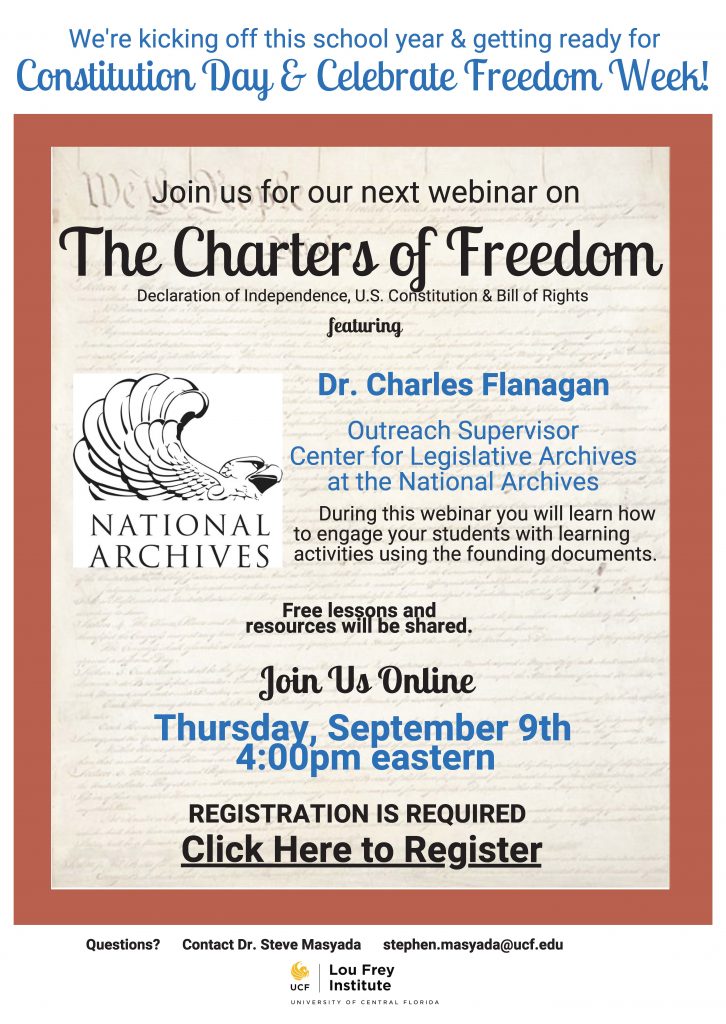
Breaking Bias: Lessons from the Amistad Curriculum
From the website:
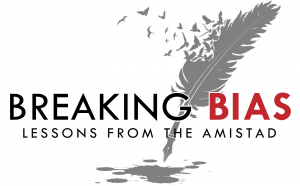 The Foundation’s six-unit curriculum specifically focuses on how African Americans have not only been victims but agents of their own change throughout history, how racial oppression has transformed over time in the U.S. and what our responsibilities are, both individually and collectively, to respond to racism. The curriculum looks to answer the following questions (and many more):
The Foundation’s six-unit curriculum specifically focuses on how African Americans have not only been victims but agents of their own change throughout history, how racial oppression has transformed over time in the U.S. and what our responsibilities are, both individually and collectively, to respond to racism. The curriculum looks to answer the following questions (and many more):
- What is race?
- What have been the consequences of social constructs about race in our country?
- How was chattel slavery a national problem that was reinforced in both the North and the South?
- How did enslaved people and other African Americans resist oppression and bring about positive change?
- How did resistance and resilience among African Americans bring progress despite the obstacles in their path?
- In what ways did the Jim Crow era reinvent earlier forms of African American oppression?
- What rights were African Americans demanding during the civil rights era, and why was there resistance from many white communities to sharing these rights?
- How does racial bias in media impact real-life policies and practices that affect the lives of African Americans?
Journey 2050
From the website:
The year 2050 is a key moment in time – the world’s population will be a projected 10 billion. As a result, food production needs are expected to rise by 60-70% and changing agronomic conditions will place pressure on agricultural yields.
Journey 2050 is a FREE agriculture education program that challenges participants to answer the question, “How will we sustain nearly 10 billion people by the year 2050?”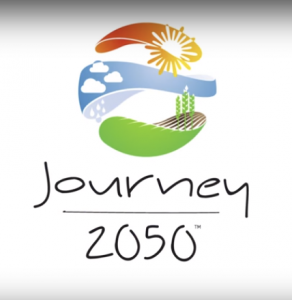
Using an inquiry-based approach, this gamified, virtual program encourages students to make decisions and adjust them as they see their impact on society, the environment, and the economy at a local and global scale. Students will hear from farmers across the globe, learning about their experiences to understand how agriculture differs across the globe.
As students interact with each family, they learn the role of best management practices in feeding the world, reducing environmental impacts, and improving social performance through greater access to education, medical care, and community infrastructure.
Information on the Nebraska Labor Market
Have a lesson plan coming up on personal finance, financial literacy, or the labor market. These resources, some of them Nebraska specific, can help!
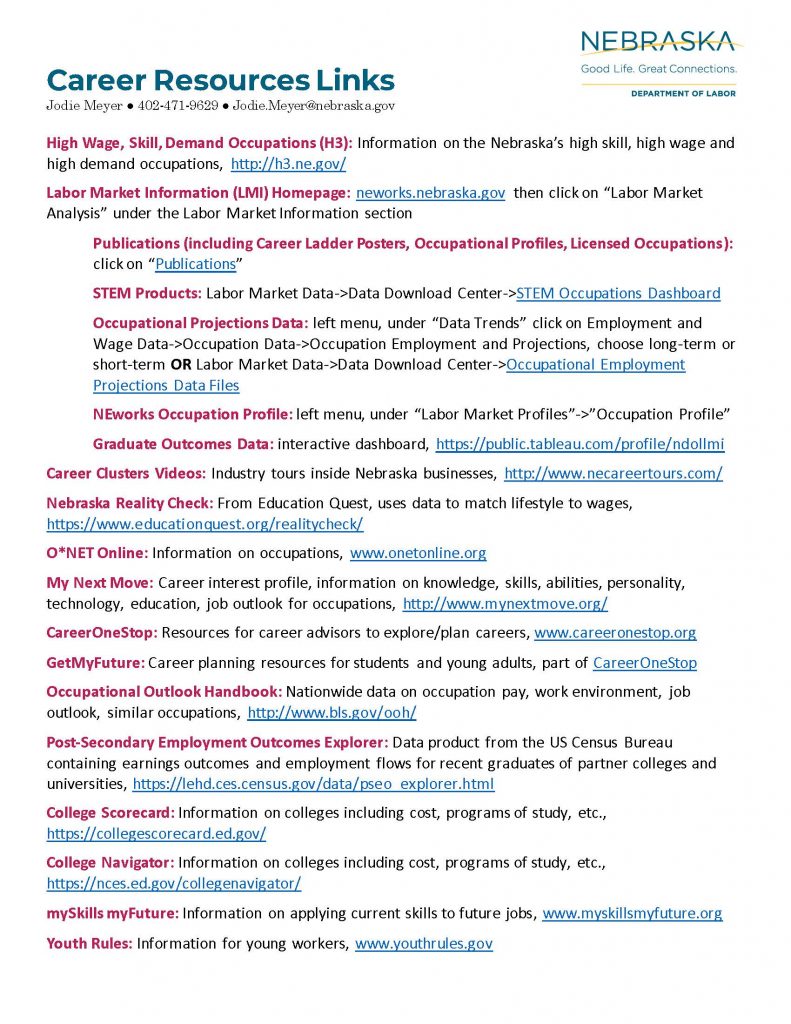
August 2021 Newsletter
Welcome (Back) to the 2021-2022 School Year!
 Whew! The world of social studies education has seen more than its fair share of attention in the last couple of months. I wanted to take a moment and send Nebraska Social Studies educators a word of reassurance and some tips for possible use.
Whew! The world of social studies education has seen more than its fair share of attention in the last couple of months. I wanted to take a moment and send Nebraska Social Studies educators a word of reassurance and some tips for possible use.
The Nebraska State Social Studies Standards were approved in November of 2019 and are based on the premise that providing opportunities for learning and educating our students is vital in developing and maintaining an engaged citizenry. Preparing students for our contemporary society cannot be accomplished without a strong emphasis on civics, economics, geography, and history – the core disciplines of social studies. It is imperative that each generation demonstrates positive and productive citizenship skills (SS K.1.1 and SS K.1.2). Because the standards were developed in part by Nebraska educators and vetted by the larger community during public feedback sessions and in open meetings, Nebraska’s History and Social Studies Standards represent what Nebraskan’s value in civics, economics, historical, and geographical education. They illustrate the community’s faith in its children to reach their full potential as learners and citizens.
The state standards outline what a student needs to know, understand, and be able to do at the end of each grade, or in the case of high school – each course. While standards are adopted at the state level by the Nebraska State Board of Education, curriculum (the resources used for teaching and learning the standards) and instruction (the methods used by teachers to teach their students in their classes and help them master the standards) are made at the local level.
Nebraska’s social studies standards and strategies for implementing those standards were developed by Nebraska educators from across the state who used their decades of teaching experience to develop high-quality, age-appropriate standards. The standards emphasize disciplinary skills and processes to be used when studying history, geography, civics, and economics which include:
- Analyze and evaluate patterns of continuity and change over time.
- Evaluate how considering multiple perspectives facilitates an understanding of history.
- Evaluate the relevancy, accuracy, and completeness of primary and secondary sources to better understand multiple perspectives of the same event.
- Gathering, interpreting, and using evidence to develop claims to historical, economic, geographical, and political questions and communicate those conclusions.
- Analyze relationships among causes and effects.
- Create and support arguments about social studies topics and issues using evidence.
The standards also support the process of social studies inquiry, which results in a deeper understanding of content. Incorporating inquiry using the content standards reinforces the same skills contained in the Nebraska English Language Arts (ELA) Standards through reading, writing, speaking, and listening with social studies content.
Here are a few tips to help social studies educators moving forward this school year!
Tips for Educators:
- Build community and trust in and outside the classroom with both students and parents. Students and parents should feel comfortable addressing issues or discomfort with the instructor. Encourage questions and dialogue.
- Foster student agency in your classroom. This can be done through giving students choice in content or products and encouraging them to voice their ideas and advocate for themselves.
- Focus on the History and Social Science Standards and tie your curriculum and instruction back to the standards. The standards have been approved by the State Board of Education and have passed through public feedback.
- Carefully preview all materials used to avoid unexpected issues.
- Use multiple types of primary sources in the classroom. In addition to documents and texts primary sources can be photographs, oral histories, journals and diaries, art, music, video footage, artifacts, and newspapers.
- Provide multiple sources and multiple perspectives in the study of social studies content.
- Avoid generalizations and encourage students not to categorize groups of people based on their experiences in history and historical events.
- Avoid presenting marginalized or oppressed groups as only victims- make sure to include examples of strength, resiliency, and overcoming adversity.
- Use pedagogies that are student centered, such as the inquiry process. Have students do the work of historians, economists, political scientists, and geographers.
- Many times, educators want to use a simulation to create empathy, but this can backfire. Be cautious with simulations. Avoid simulations that have students take on the role of oppressor or oppressed persons. Use journals, oral histories, images, picture books, and literature to create understanding and empathy instead. If using simulations then try simulated court trials, congressional hearings, and historical debates.
- Use structures for discussion like to examine different sides to issues and historical questions. Please refer to the NDE OnDemand video “Difficult Conversations in the Classroom” for additional assistance. https://www.education.ne.gov/socialstudies/difficult-conversations-in-the-classroom/
- When teaching difficult histories like slavery, genocide, removal of indigenous peoples, segregation, lynching, war, the Holocaust and other sensitive subjects, review materials, especially graphic visuals carefully and use them only to the extent they are necessary to achieve the lesson objective. Try to select images and texts that do not exploit students’ emotional vulnerability or might be construed as disrespectful to the victims. If images are too graphic, use other approaches to access the material. https://www.ushmm.org/teach/fundamentals/guidelines-for-teaching-the-holocaust
- Provide plenty of opportunities for students to debrief and evaluate classroom activities.
- If you are in doubt, ask your supervisor or a colleague.
United States Senate Youth Program
Nebraska Social Studies educators! The United States Senate Youth Program application is now available! Encourage your high school juniors and seniors to apply! Application deadline is 4pm CST on September 24, 2021!

US Senator Ben Sasse of Nebraska speaks with his delegates Claire Doyle and Dominic Mendlik on Zoom during the United States Senate Youth Program on Tuesday, March 23, 2021. One hundred and four high school student delegates – two from each state, the District of Columbia, and the Department of Defense Education Activity – take part in the 59th annual United States Senate Youth Program held online (because of the COVID-19 Pandemic) on March 14-17, 2021 and numerous Senate Zoom meeting from February 17 to March 30, 2021. (© Photo by Jakub Mosur and Erin Lubin).
From the United States Senate Youth Program website:
THE 60TH ANNUAL UNITED STATES SENATE YOUTH PROGRAM IS BEING PLANNED FOR MARCH 5–12, 2022 IN WASHINGTON, D.C. THE PROGRAM MAY BE HELD ONLINE PENDING PUBLIC HEALTH GUIDANCE, TO BE DETERMINED IN THE FALL OF 2021.
Delegates will hear major policy addresses by senators, cabinet members, officials of the Departments of State and Defense, leaders of other federal agencies and senior members of the national media. Delegates also traditionally participate in a meeting with a justice of the U.S. Supreme Court and the president of the United States. Most speaking events include in-depth question and answer sessions.
The Hearst Foundations will pay all expenses for Washington Week including transportation, hotel and meals if held in person. The Department of Defense (DoD) annually provides a team of competitively selected men and women officers to serve as mentors and chaperones for the student delegates, and a registered nurse, licensed physician and professional security team are in place at all times throughout an in-person week.
USCIS Questions Only Version
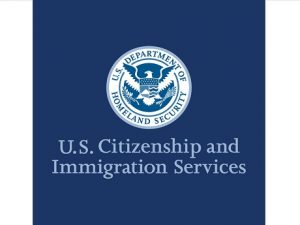 Are you a Nebraska educator using the United States Customs and Immigration Services Naturalization Exam to meet the graduation requirements of 79-724? Have you been looking for a version that comes with the questions only? Look no further! A PDF has been created that has removed the answers to make it easier to provide the complete exam as a study guide or other instructional material to meet your needs.
Are you a Nebraska educator using the United States Customs and Immigration Services Naturalization Exam to meet the graduation requirements of 79-724? Have you been looking for a version that comes with the questions only? Look no further! A PDF has been created that has removed the answers to make it easier to provide the complete exam as a study guide or other instructional material to meet your needs.
OER Conference for the Social Studies
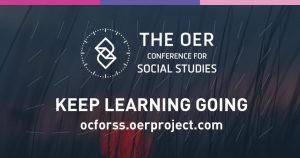
From the OER Project website:
Real teachers, real historians, real ideas. We’re engaging new and established voices to share their experiences and unique perspectives. They offer practical guidance, inspiration and hope.
Join thousands of educators online August 3–5, 2021 to discuss how our world has changed and the impact on teaching practices as many students head back to the classroom this Fall. We’ll explore what history can tell us about this moment, how our view of citizenship has shifted, and what teachers should consider as they shift their practice to meet the challenge.
Registration for this 3 day conference is required.
Financial Literacy Act
The Nebraska Legislature adopted a law in May that requires school districts, when appropriate, to include financial literacy at the elementary and middle school levels. The law also requires students to complete at least a half-credit course in high school on finances before graduating. It is set to begin with the 2023-2024 school year and goes into effect on August 21, 2021.
State Statute 79-3003 states:
“Beginning with school year 2023-24, each school district, in consultation with the State Department of Education, shall include financial literacy instruction, as appropriate, in the instructional program of its elementary and middle schools and require each student to complete at least one five-credit high school course in personal finance or financial literacy prior to graduation.”
NexGen Personal Finance Academy
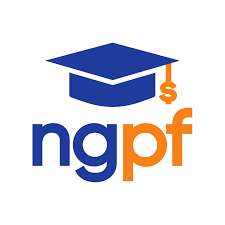
From the NGPF website:
WHAT IS NGPF ACADEMY?
NGPF Academy is our system to offer and track FREE professional development opportunities for educators focusing on personal finance. While anyone can participate in free professional development through NGPF Academy, the swag and gift card incentives are intended for teachers and educators reaching a multitude of students. Finance professionals and homeschool educators are welcome to attend NGPF PD but will not receive Academy credit.
3 WAYS TO START EARNING NGPF ACADEMY CREDITS:
Join live sessions, find support, and collaborate with the community of teachers.
Become NGPF Certified in personal finance topics by taking a multi-week course.
Try new PD opportunities that can be completed on your own time.
Native Land
From the Native Land website:
We strive to map Indigenous lands in a way that changes, challenges, and improves the way people see the history of their countries and peoples. We hope to strengthen the spiritual bonds that people have with the land, its people, and its meaning.
people see the history of their countries and peoples. We hope to strengthen the spiritual bonds that people have with the land, its people, and its meaning.
We strive to map Indigenous territories, treaties, and languages across the world in a way that goes beyond colonial ways of thinking in order to better represent how Indigenous people want to see themselves.
We provide educational resources to correct the way that people speak about colonialism and indigeneity, and to encourage territory awareness in everyday speech and action.
Native-land.ca is a website run by the nonprofit organization Native Land Digital. We are guided by a Board of Directors and an Advisory Council. Our funding comes from friendly organizations and individual donors.
Nebraska Council of Economic Education (NCEE) 2021-2022 Calendar of Events
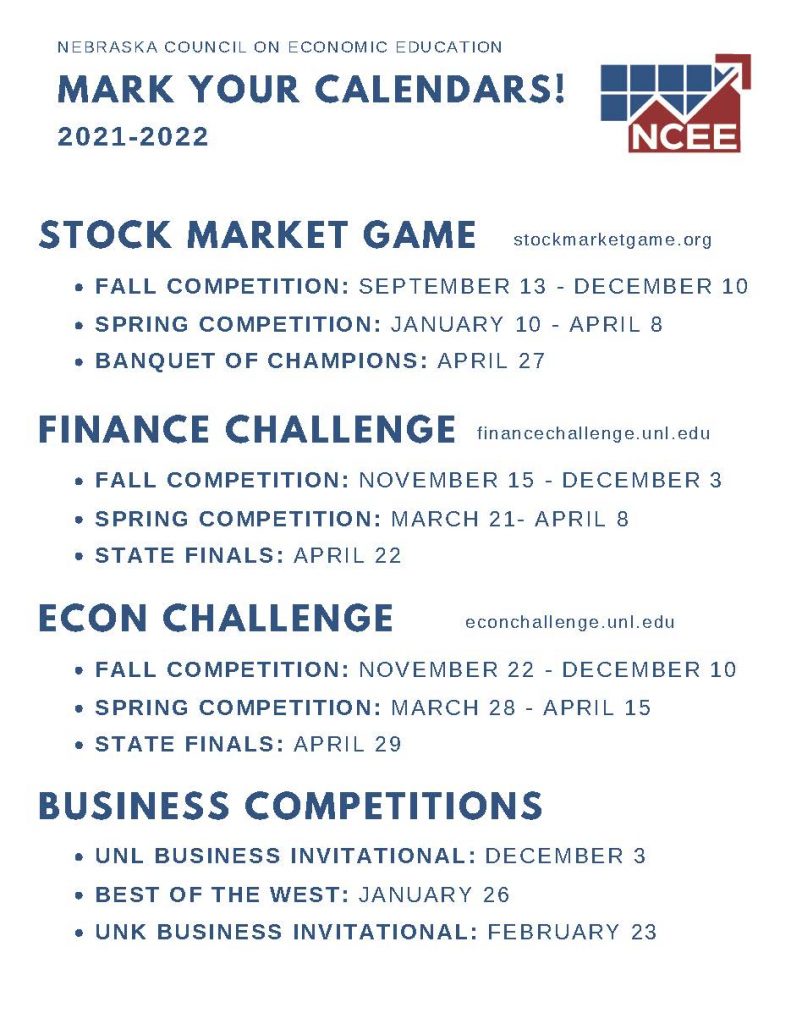
Nebraska and NewsELA Standards Alignment
 Support your Social Studies classrooms with content that’s aligned to the 2019 Nebraska Social Studies Standards and resonates with students. Newsela’s vetted content builds connections, promotes inquiry, and develops background knowledge, pushing students to think like historians, economists, political scientists and geographers.
Support your Social Studies classrooms with content that’s aligned to the 2019 Nebraska Social Studies Standards and resonates with students. Newsela’s vetted content builds connections, promotes inquiry, and develops background knowledge, pushing students to think like historians, economists, political scientists and geographers.
Newsela Highlights:
- Get even more out of core instruction
- Differentiate instruction easily with texts published at 5 reading levels
- Add relevance or rigor to any lesson
- Daily content added to help teachers and students stay up to date on what is happening around the world
- Provide more reading and writing choices for students
- Save time finding, vetting, and aligning content
- Ensure every student can access background knowledge and discussions
Newsela is aligned with the Anchor Social Studies Strands in K-12.
Civics
Forms and Function of Government and Civic Participation
Economics
Economic Decision Making, Financial Literacy, Exchange and Markets, National Economy, and Global Economy [starting in 5th grade]
Geography
Location and Place, Regions, Human-Environment Interaction, Movement, and Geospatial Skills and Geo-Literacy
History
Change, Continuity, and Context, Multiple Perspectives, Historical Analysis and Interpretation, and Historical Inquiry and Research
60 Days Across the USA
From the “60 Days Across the USA” website: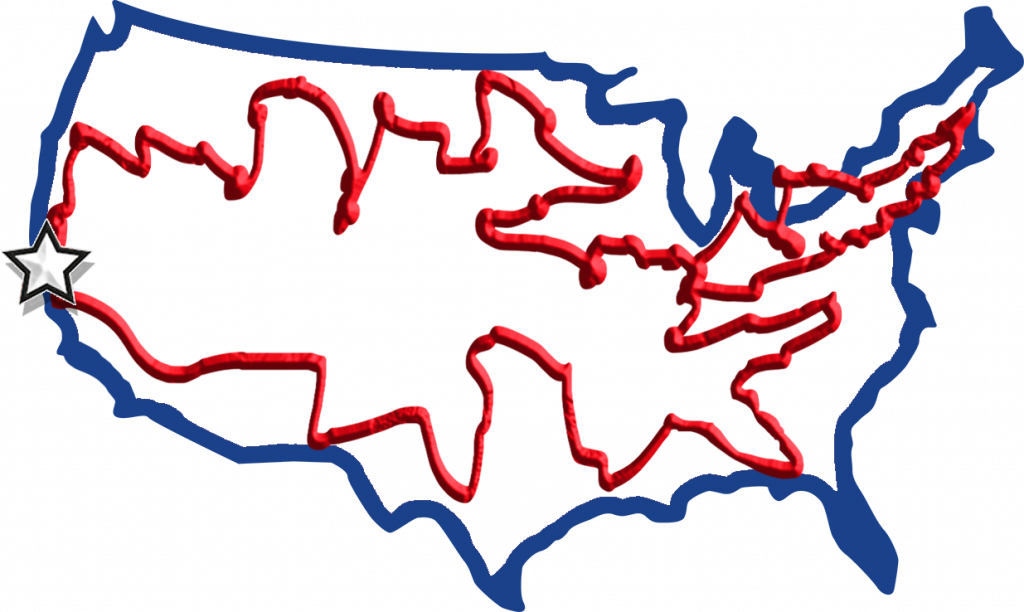
It took 60 days, but our virtual journey is in the books.
Over 8 weeks during spring 2020, we traveled through all 48 states in the continental United States. We visited 370 towns and 33 state capitals. We also encountered dozens of rivers, lakes, mountains, highways, parks, museums and landmarks.
Along the way, I had the privilege of interviewing some terrific people across the country.
There’s been a host of interesting places from the Washington town that celebrated skyjacker D.B. Cooper to the Iowa farm field where singer Buddy Holly’s plane crashed to the Illinois community that brought in purple starlings as a way to solve its mosquito problem to the town in Idaho that’s 36 miles long and less than 1 mile wide, a set-up designed to skirt the state’s liquor license laws.
We visited the towns where Mark Twain and Abraham Lincoln lived as well as the birthplaces of Muhammad Ali and Lucille Ball. There’s also that upstate New York town that was reportedly the setting for the classic movie, “It’s a Wonderful Life.”
I’ve learned so much about this country’s history, culture, geography and people that I could almost put together an encyclopedia.
The research and writing took me nearly 3 years. It was worth every minute and every word of the 400,000 words on the site.
And, now, we continue on.

Over the next few years, I’ll actually be driving portions of this route in 1-week, 2-week and 3-week chunks. I’ll freshen up each of the 60 daily columns as I do.
There’ll also be revisions as events happen in the states and cities we’ve covered. Our first update was posted shortly after the 60th day in our Day 12 column about Louisiana. The new information included the flooding being experienced this week in Lake Charles, a town hit by two strong hurricanes last year. There was also an update on the Day 38 column with President Joe Biden’s visit to a Ford factory in Dearborn, Michigan.
There’ll also be projects that fall under our “spotlight” category where we look at issues such as immigration, hunger and the nation’s manufacturing industry.
Finally, we’re going to rely on our readers to help us fill out the site. There is a Travel Center in the lower left box on the 60 Days USA main page. As you plan and take your road trips, fill that out and let us know where you’re going and what you’ve seen.
Our photo gallery also welcomes all types of images from our readers’ road trips, so just upload them onto our 60 Days USA Facebook page and we’ll get them posted here.
Wishing everyone safe and enjoyable travels as our nation hits the road once again.
Using Innovation and Technology to Promote Economic Inclusion and Financial Capability for Nebraska Students
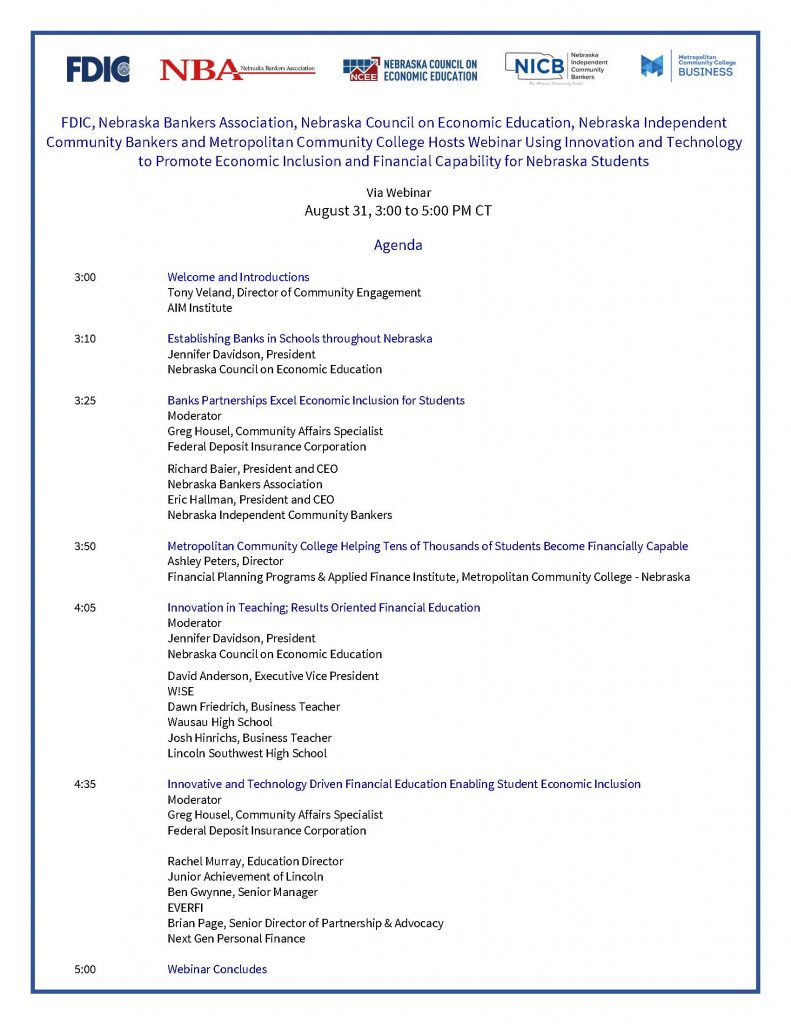
Project PLACE Units
From the Project PLACE website:
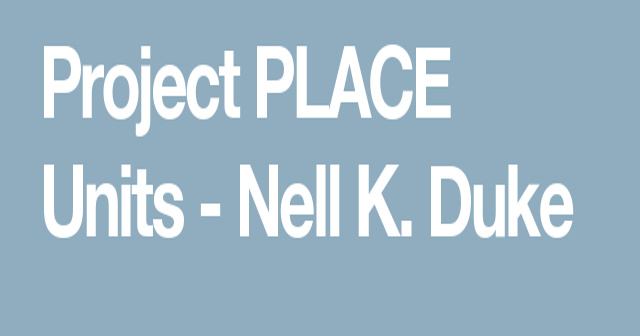 These units were developed for Project PLACE (Project-approach to Literacy and Civic Engagement), an initiative at the University of Michigan and Michigan State University. They are project-based units designed for second-grade students. Support for the development of the materials was provided by the Spencer Foundation and support for their testing was provided by the Spencer Foundation and the George Lucas Educational Foundation. The materials have been modified somewhat from the versions tested to be more useful for educators in a wider range of contexts. Units cover the four major disciplines in social studies: civics/government, economics, geography, and history. We recommend that you teach the units/projects in the order in which they appear. Please note that materials are copyrighted.
These units were developed for Project PLACE (Project-approach to Literacy and Civic Engagement), an initiative at the University of Michigan and Michigan State University. They are project-based units designed for second-grade students. Support for the development of the materials was provided by the Spencer Foundation and support for their testing was provided by the Spencer Foundation and the George Lucas Educational Foundation. The materials have been modified somewhat from the versions tested to be more useful for educators in a wider range of contexts. Units cover the four major disciplines in social studies: civics/government, economics, geography, and history. We recommend that you teach the units/projects in the order in which they appear. Please note that materials are copyrighted.
The Living New Deal
From the Living New Deal website:
The New Deal reached into every corner of the U.S., touching citizens of every kind and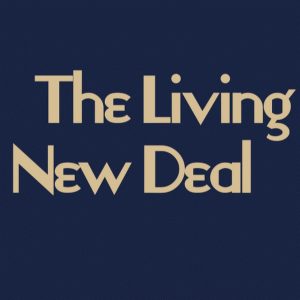 leaving its mark on the nation’s landscape, economy and culture. The Living New Deal is keeping alive the memory of the New Deal. An important part of that effort is educating the public about the Roosevelt era and its legacy. That includes introducing our audience to a wealth of resources in libraries and on the web: books, films, documents, oral histories, and more. We also provide sample curricula for teachers to pass along knowledge of the New Deal to their students. Use the pull-down menu or click on the headings to find what you’re looking for. (Elsewhere, we provide short histories and a host of news items pertaining to the New Deal).
leaving its mark on the nation’s landscape, economy and culture. The Living New Deal is keeping alive the memory of the New Deal. An important part of that effort is educating the public about the Roosevelt era and its legacy. That includes introducing our audience to a wealth of resources in libraries and on the web: books, films, documents, oral histories, and more. We also provide sample curricula for teachers to pass along knowledge of the New Deal to their students. Use the pull-down menu or click on the headings to find what you’re looking for. (Elsewhere, we provide short histories and a host of news items pertaining to the New Deal).
Websites on the New Deal showcase museum collections, photographic archives, history blogs, and much more that may be of interest to anyone looking for information on the New Deal, its programs, artworks and leaders. It includes websites specific to individual states, as well.
New Deal Resources for Teachers is a sampling of syllabi for teachers at the high school and college levels. Preparing a curriculum or lesson plan on the New Deal can be approached from a host of angles, but it is always helpful to see how other teachers have undertaken this important task and what additional resources they have relied on.
Oral Histories of the New Deal directs you to online resources dedicated to personal and family stories of participants in the New Deal, organized by state and program. These stories offer readers a wealth of personal experiences, from CCC camps in Louisiana to a resettlement community in Maryland, from artists working on public murals to African American women who participated in the WPA.
May 2021 Newsletter
The 2020-2019 Nebraska Social Studies Year in Review
 Summer break is soon approaching and I just wanted to take this opportunity to share my heartfelt thanks to each and every one of you for your continued diligence, hard work, and dedication to Nebraska students. I know that this year has been a challenge, and yet you all persevered, all while implementing new standards, instructional shifts, and possibly instructional resources and materials. Also, as my first year as the Social Studies Education Specialist with the Nebraska Department of Education comes to a close, I would like to thank you all for welcoming me into your professional lives through monthly newsletters, professional development, phone call conversations, and emails. In partnership with school administration, district leaders, and ESU Teaching and Learning professionals, we are working hard to meet the needs of social studies educators in the coming 2021-2022 school year. It has been my absolute pleasure to
Summer break is soon approaching and I just wanted to take this opportunity to share my heartfelt thanks to each and every one of you for your continued diligence, hard work, and dedication to Nebraska students. I know that this year has been a challenge, and yet you all persevered, all while implementing new standards, instructional shifts, and possibly instructional resources and materials. Also, as my first year as the Social Studies Education Specialist with the Nebraska Department of Education comes to a close, I would like to thank you all for welcoming me into your professional lives through monthly newsletters, professional development, phone call conversations, and emails. In partnership with school administration, district leaders, and ESU Teaching and Learning professionals, we are working hard to meet the needs of social studies educators in the coming 2021-2022 school year. It has been my absolute pleasure to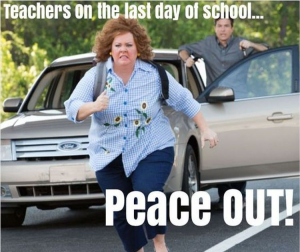 serve you this school year and I look forward to continuing to be a steward of social studies education in Nebraska and ensuring that our students across the state receive nothing less than the best!
serve you this school year and I look forward to continuing to be a steward of social studies education in Nebraska and ensuring that our students across the state receive nothing less than the best!
The monthly newsletter will pause while you all are resting, relaxing, and enjoying your summer vacation. They will start again beginning in August. I hope the information contained within this and the previous newsletters have been helpful. With that being said, there is A LOT of information below for you to digest. If for any reason you need to contact me, you can do so by emailing me at: ebony.mckiver@nebraska.gov or calling/texting at: (531) 207-9043.
All my best, wishing you and yours the best summer vacation ever!
-Ebony
The Nebraska Teachers of Psychology in Secondary Schools (NebTOPSS) Psychology Conference
Information from Planning Committee:
 NebTOPSS’s mission is to provide professional development opportunities for high school social studies teachers. Participating in these professional development opportunities allows you the opportunity to network with other high school psychology teachers, learn from collegiate psychology professors and other psychology professionals, as well as obtain new resources for your psychology classroom. With that mission in mind our third annual NebTOPSS conference will be on June 3, 2021 from 9:00-3:00. Our focus this year is the social perspective. The conference will be held at the Don Clifton Professional Learning Center, but there will also be a virtual option available to participants this year. During the conference you will have the opportunity to listen to Dr. Cynthia Willis-Esqueda discuss techniques for conducting stereotyping, prejudice, and racism research. You will also participate in demonstrations concerning the social perspective that you could then take back to your classroom. Plus breakfast and lunch will be provided.
NebTOPSS’s mission is to provide professional development opportunities for high school social studies teachers. Participating in these professional development opportunities allows you the opportunity to network with other high school psychology teachers, learn from collegiate psychology professors and other psychology professionals, as well as obtain new resources for your psychology classroom. With that mission in mind our third annual NebTOPSS conference will be on June 3, 2021 from 9:00-3:00. Our focus this year is the social perspective. The conference will be held at the Don Clifton Professional Learning Center, but there will also be a virtual option available to participants this year. During the conference you will have the opportunity to listen to Dr. Cynthia Willis-Esqueda discuss techniques for conducting stereotyping, prejudice, and racism research. You will also participate in demonstrations concerning the social perspective that you could then take back to your classroom. Plus breakfast and lunch will be provided.
If you are ready to register use the link below to get started!
https://forms.gle/MC9BKWHf5EnprwK19
9/11 Memorial and Museum: Anniversary in the Schools Webinar
From the 9/11 Memorial and Museum website:
Join students and teachers from around the world to commemorate the 20th anniversary of 9/11 by registering for the 9/11 Memorial & Museum’s free Anniversary in the Schools program.
2021 Speakers
Carlton Shelley II, a West Point graduate who was a student in the elementary school where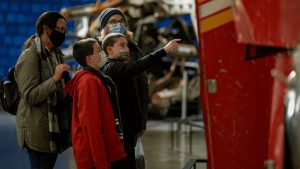 President George W. Bush was told about the 9/11 attacks.
President George W. Bush was told about the 9/11 attacks.
Bill Spade, a retired FDNY firefighter who responded to the World Trade Center on 9/11, and his son, John Spade, a graduate of the 9/11 Museum Ambassador program and Museum volunteer.
Will Jimeno, a retired Port Authority police officer who was rescued from the debris pile hours after surviving the collapse of the Twin Towers.
Brielle Saracini and Cait Leavey, who both lost their fathers on 9/11 and became lifelong friends while volunteering with an organization dedicated to supporting those who lost loved ones on September 11.
The program will be available on-demand beginning Friday, September 10, 2021. On that day, Education staff will answer student questions through an exclusive live chat. Teaching guides will be available in advance of the program.
Register for the Anniversary in the Schools webinar today.
For more information, contact the Education Programs Staff at anniversaryintheschools@911memorial.org.
The webinar will be interpreted in American Sign Language and captioned. An audio description and Spanish subtitles will also be available.
The webinar is made possible thanks to generous support from the New York Life Foundation.
Lincoln Speaks Symposium
From the Gilder Lehrman website:
Dates: August 1–6, 2021
Location: Abraham Lincoln Presidential Library and Museum, Springfield, IL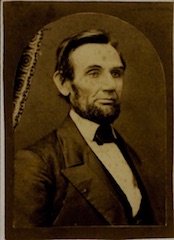
Participants: K–12 teachers from Illinois, Indiana, and Nebraska
Application Deadline: May 15, 2021
In partnership with the Abraham Lincoln Presidential Library and Museum
The Lincoln Speaks Symposium will allow up to 25 K–12 teachers from Illinois, Indiana, or Nebraska to participate in a weeklong professional development event on-site at the Abraham Lincoln Presidential Library and Museum. The symposium will focus on Lincoln’s intellectual, moral, psychological, and political evolution. Participants will have the chance to explore Lincoln’s life and writings in his hometown of Springfield, Illinois.
ELIGIBILITY
K–12 educators teaching in Illinois, Indiana, or Nebraska are welcome to apply to the Lincoln Speaks Symposium. Teachers must be enrolled in the Gilder Lehrman Institute’s free Affiliate School Program to complete their application.
APPLICATION INFORMATION
Interested K–12 teachers in Illinois, Indiana, or Nebraska must complete an application to be considered. Applications will be reviewed by Gilder Lehrman and Abraham Lincoln Presidential Library and Museum staff.
The deadline to submit an application is May 15, 2021. Selected teachers will be notified by June 15, 2021.
Wrapping Up the School Year with an Econ Focus
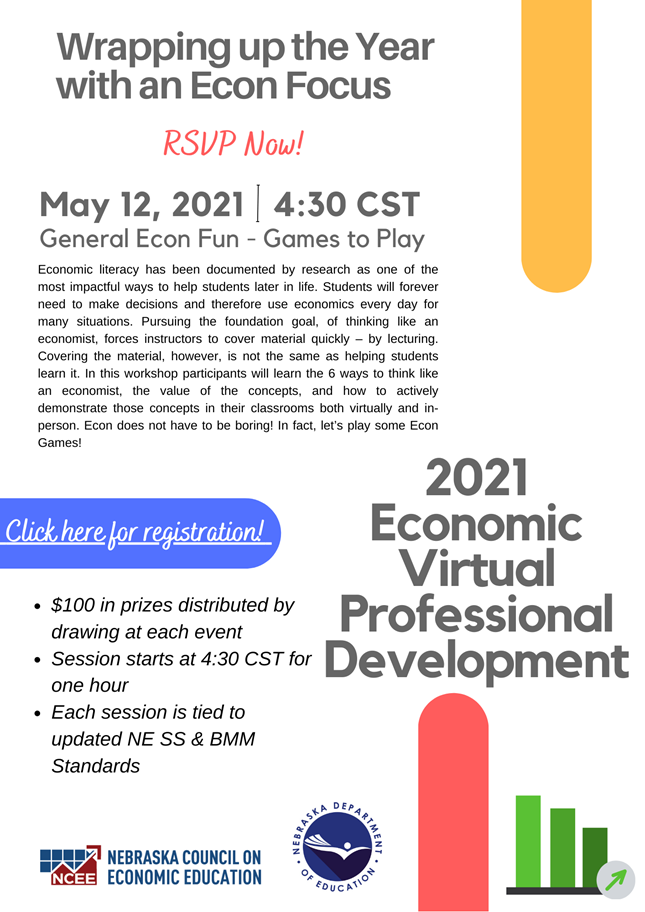
Free Interactive Nebraska Redistricting Lesson from LWV-NE
 Attention: American Government Teachers and Curriculum Specialists
Attention: American Government Teachers and Curriculum Specialists
The League of Women Voters of Nebraska with the support of Common Cause of Nebraska has developed a 60-90-minute lesson plan on Redistricting 2021 with a focus on Nebraska. It addresses the Nebraska civic education curriculum standard:
SS HS.1.1. Analyze the foundation, structures, and functions of state government and its outcomes. For example: bicameral/unicameral, reapportionment/redistricting, branches of government, judiciary process, penal system
Meant to Represent: Putting Our Vote on the Map, an interactive presentation, incorporates speakers from LWVNE who offer explanations and video demonstrations of redistricting terms: Census, apportionment, redistricting, gerrymandering, packing, cracking, and communities of interest. Nebraska voting districts and precincts are illustrated. Constitutional requirements for redistricting both at the national and state levels are covered along with a brief history of redistricting in Nebraska. The unique concept of Nebraska’s Unicameral, the role of Nebraska’s citizens as the second “house,” and the importance of public participation in state government is emphasized. The consequences of the COVID-19 pandemic on state redistricting are addressed as well as the path taken to ensure fair redistricting in the state legislatively and through ballot initiative. An optional quiz is included.
With a strong emphasis on voter participation, the second portion of the presentation focuses on a community map-drawing activity, using DistrictR software, that demonstrates how lawmakers use data to inform where they set voting district boundaries. A LWVNE member facilitates the use of the program and draws a sample community. Following the presentation, students can use the software to draw their own community defining “communities of interest,” citing parks, schools, familiar landmarks, restaurants, and businesses.
Meant to Represent: Putting Our Vote on the Map will be available for your use after May 8, 2021. Please register below to receive a customized-for-Nebraska lesson on redistricting. This plan is especially relevant now through the end of September. The Nebraska Legislature will draw new maps in late September, early October, 2021.
Bonus! Nebraska Poets on Redistricting!!
Watch Redistricting Poetry Winners read their poems on LWVNE’s website:
Redistricting – League of Women Voters of Nebraska (lwvnebraska.org)
First Place – Grace Eastin, a Junior at Sutton Public Schools, and resident of Clay Center, Nebraska
Second Place – Patrick McEvoy, Poet and Core Teaching Artist, Nebraska Writers Collective, Louder Than a Bomb
Name:________________________________________________________________________
School Name:__________________________________________________________________
School District:_________________________________________________________________
Position:______________________________________________________________________
Email:________________________________________________________________________
Course & Grade:________________________________________________________________
Level:________________________________________________________________________
Phone:_______________________________________________________________________
Date Needed:__________________________________________________________________
Send application and any questions to Carol Dennison, cdennsion@lwvnebraska.gov.
Illinois Holocaust Museum & Education Center – 2021 Virtual Summer Institute
From the Illinois Holocaust Museum & Education Center website:
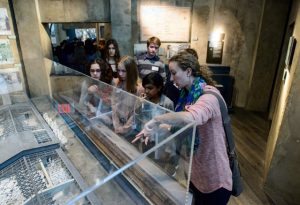 Through this introductory institute, teachers will begin an investigation into the history of the Holocaust (1933-1945). During this intensive, five-day virtual seminar, participants will become familiar with the content area, literacy-based teaching methods, and resources to teach Holocaust history to their students. The course will include primary source readings, use of historical documents, multimedia presentations, guest speakers, and will draw interdisciplinary connections that align with state and national standards.
Through this introductory institute, teachers will begin an investigation into the history of the Holocaust (1933-1945). During this intensive, five-day virtual seminar, participants will become familiar with the content area, literacy-based teaching methods, and resources to teach Holocaust history to their students. The course will include primary source readings, use of historical documents, multimedia presentations, guest speakers, and will draw interdisciplinary connections that align with state and national standards.
Educators will leave a with deeper knowledge of the Holocaust and rich pedagogical resources. The program will enable educators to investigate with their students the ramifications of prejudice, racism, and indifference, and the role of the individual in nurturing and protecting democratic values and human rights.
Full and partial tuition assistance is available.
State Board, District, and ESU Map Resources
The State Board, District, and ESU Map Resources page has been updated with NEW 2021 maps!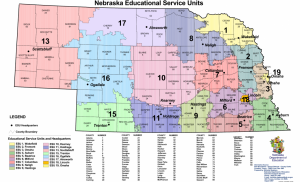
Microsoft Education Center
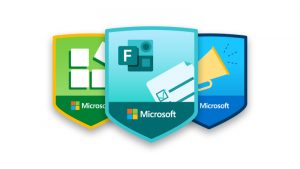
From the Microsoft Education Center website:
Learn with free courses and resources today! Nearly a million courses were completed worldwide over the last month with the Microsoft Educator Center. Bring new skills to your classroom, earn professional development hours, and acquire badges as you confidently implement hybrid learning.
Newspaper Navigator
From the Newspaper Navigator website:
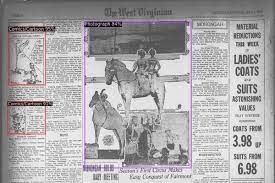 Newspaper Navigator is a project being carried out by Benjamin (Ben) Charles Germain Lee as part of the Innovator in Residence Program at the Library of Congress. The goals of Newspaper Navigator are 1) to extract visual content from 16+ million pages of digitized historic American newspapers in Chronicling America and 2) re-imagine how you, members of the American public, can search the visual content using machine learning techniques. The first phase (extracting the visual content) was completed in April, 2020, and resulted in the full Newspaper Navigator dataset. The second phase of Newspaper Navigator consists of the application that you are currently using! All Newspaper Navigator photos in the app and dataset are in the public domain!
Newspaper Navigator is a project being carried out by Benjamin (Ben) Charles Germain Lee as part of the Innovator in Residence Program at the Library of Congress. The goals of Newspaper Navigator are 1) to extract visual content from 16+ million pages of digitized historic American newspapers in Chronicling America and 2) re-imagine how you, members of the American public, can search the visual content using machine learning techniques. The first phase (extracting the visual content) was completed in April, 2020, and resulted in the full Newspaper Navigator dataset. The second phase of Newspaper Navigator consists of the application that you are currently using! All Newspaper Navigator photos in the app and dataset are in the public domain!
The Geography Teacher
From the Taylor and Francis Online website: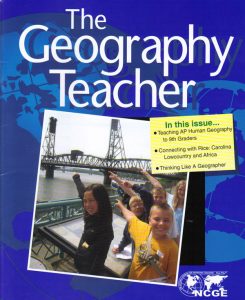
Free access until June 1, 2021
The Geography Teacher provides a forum for educators and scholars to present innovative teaching strategies and essential content for elementary and secondary geography, AP Human Geography, introductory college geography, and preservice methods courses. The journal invites scholarly work in the areas of how students learn and instructors teach by preserving and disseminating research. It is also a forum for discussion of state, national, and international trends in geography education. The journal seeks original manuscripts that contribute to the understanding of issues and topics associated with geography education.
While research manuscripts are accepted, one important aim of the Journal is to provide a forum for those manuscripts that may be outside traditional research formats. Lesson plans and approaches to teaching are of particular interest.
The Critical Social Educator
From the Critical Social Educator website:
 The Critical Social Educator is an open access, peer-reviewed, multidisciplinary journal designed to connect practitioners and researchers interested in critical social education at the elementary level. By critical, we mean an examination of power relations with a focus on injustice and oppression in terms of how these operate within sites of learning as well as efforts to disrupt them. By social education, we mean all experiences through which children learn about the social world and their participation in it. By elementary, we mean educational experiences that include children ages 5-12 and/or prepare adults teaching and learning with this age group.
The Critical Social Educator is an open access, peer-reviewed, multidisciplinary journal designed to connect practitioners and researchers interested in critical social education at the elementary level. By critical, we mean an examination of power relations with a focus on injustice and oppression in terms of how these operate within sites of learning as well as efforts to disrupt them. By social education, we mean all experiences through which children learn about the social world and their participation in it. By elementary, we mean educational experiences that include children ages 5-12 and/or prepare adults teaching and learning with this age group.
The journal aims to provide a space for researchers and practitioners to be in dialogue about the possibilities and challenges of critical social education at the elementary level.
Personal Finance Institute

PERSONAL FINANCE INSTITUTE– REGISTER NOW!
July 13-15, 2021
Due to the success of previous Institutes, we are again offering the Personal Finance Institute.
Are you a new/newer teacher? Are you a seasoned teacher wanting to refresh and sharpen your skills? Do you teach Personal Finance? Would you like to earn financial education industry certification? Are you interested in revising an existing Personal Finance course to add more rigor? If so, consider attending Nebraska’s Personal Finance Institute, to be held at the University of Nebraska-Omaha July 13, 14, and 15, 2021.
K-12 teacher participants will each receive a $300 honorarium. Meals are included but participants must pay for their own lodging. A room block is reserved at the Aksarben Courtyard Marriott for those who wish to stay overnight. To be eligible to receive the $300 honorarium, attendees must participate in all aspects of the Institute, including pre-work, evening meals and W!se certification pretest and exam.
The Personal Finance Institute is limited to the first 30 completed registrations. To register you must complete the online Personal Finance Institute application and submit your $100 refundable deposit. Your check will be held and returned to you the final day of the Institute.
Prior to the Institute, participants are required to spend a minimum of 20 hours in Institute pre-work. We will utilize NextGen Personal Finance (https://ngpf.org) on-demand professional development modules for this purpose. More details will be provided at a later date. Prior to beginning the Institute pre-work, participants will take a 1-hour proctored certification pretest from their own device at home/school. In the registration link, you will choose the pretest date/time from the following:
- Saturday, April 17 at 8am
- Sunday, May 2 at 3pm
- Saturday, May 8 at 8am
- Wednesday, May 12 at 6pm
Any Nebraska middle school, secondary and/or 2- or 4-year college educator who intends to implement personal finance into their curriculum is eligible for the Personal Finance Institute. Those participating in the Institute should understand that they are responsible for paying their tuition, if choosing to take for credit, prior to the Institute. Off-site lodging is your own responsibility, although a discounted housing block will be established. Only K-12 teachers are eligible for the honorarium.
At the end of the training, teachers are required to take the W!SE financial literacy certification exam. Passing or failing this literacy certification exam will not affect the course grade. However, being able to add an industry certification to your teaching resume is a valuable aspect of professional development!
Earn Graduate Credit
The Personal Finance Institute will be offered as an optional 3-hour graduate credit on-campus course from July 13-15, 2021. Participants can sign up for optional graduate credit (3 credits—ECON 8050: Economic Education) through UNO. To do so participants will need to create an account. Applications are now open for Summer with a July 1st registration deadline for credit. Participants are responsible for all tuition and fees.
Note that if you are using ECON 8050 to complete the Certificate in Economic Education please reach out to Dr. Jamie Wagner (jfwagner@unomaha.edu) prior to enrolling in the course for additional information.
Create account: https://www.applyweb.com/unograd/index.ftl
Program selection: Graduate non-degree summer 2021
Applications open now for Summer 2021 and deadline is July 1st.
Application fee: $25
No prerequisites in economics required.
Participants are required to attend the entire on-campus training sessions, including evening meals, for the 3 days of the Institute, plus take the literacy certification exam. The Institute will run approximately from 8:30 am each day and conclude around 7:30 pm on Tuesday and Wednesday, and 4 pm on Thursday. Your registration indicates your commitment to fully attend and participate in the Personal Finance Institute.
Participants should bring a laptop for use throughout the Institute. Dress is business casual. Rooms can be chilly – please bring a sweater or jacket.
If you have any questions, please contact:
- Dr. Jamie Wagner, Director, UNO Center for Economic Education, jfwagner@unomaha.edu
- Dr. Jennifer Davidson, President, NCEE, jdavidson2@unl.edu
- Mary Janssen, Career Field Specialist, NDE, mary.janssen@nebraska.gov
Becky Barnard | Council Coordinator | Nebraska Council on Economic Education | University of Nebraska–Lincoln | Hawks Hall 525 C, 730 N. 14th Street, Lincoln, NE 68588-0404 | 402-472-2333| nebraskacouncil.unl.edu |
Gallup Strengths: Positivity, Developer, Empathy, Connectedness, Harmony
Open Textbook Library
From the Open Textbook Library website:
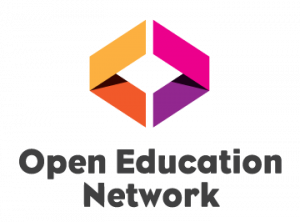 Textbooks in the Open Textbook Library are considered open because they are free to use and distribute, and are licensed to be freely adapted or changed with proper attribution.
Textbooks in the Open Textbook Library are considered open because they are free to use and distribute, and are licensed to be freely adapted or changed with proper attribution.
Open textbooks are licensed by authors and publishers to be freely used and adapted. Download, edit and distribute them at no cost.
The Open Textbook Library is supported by the Open Education Network.
Resources to Respond to Tragedy and Violence
From the IllinoisCivics.org website: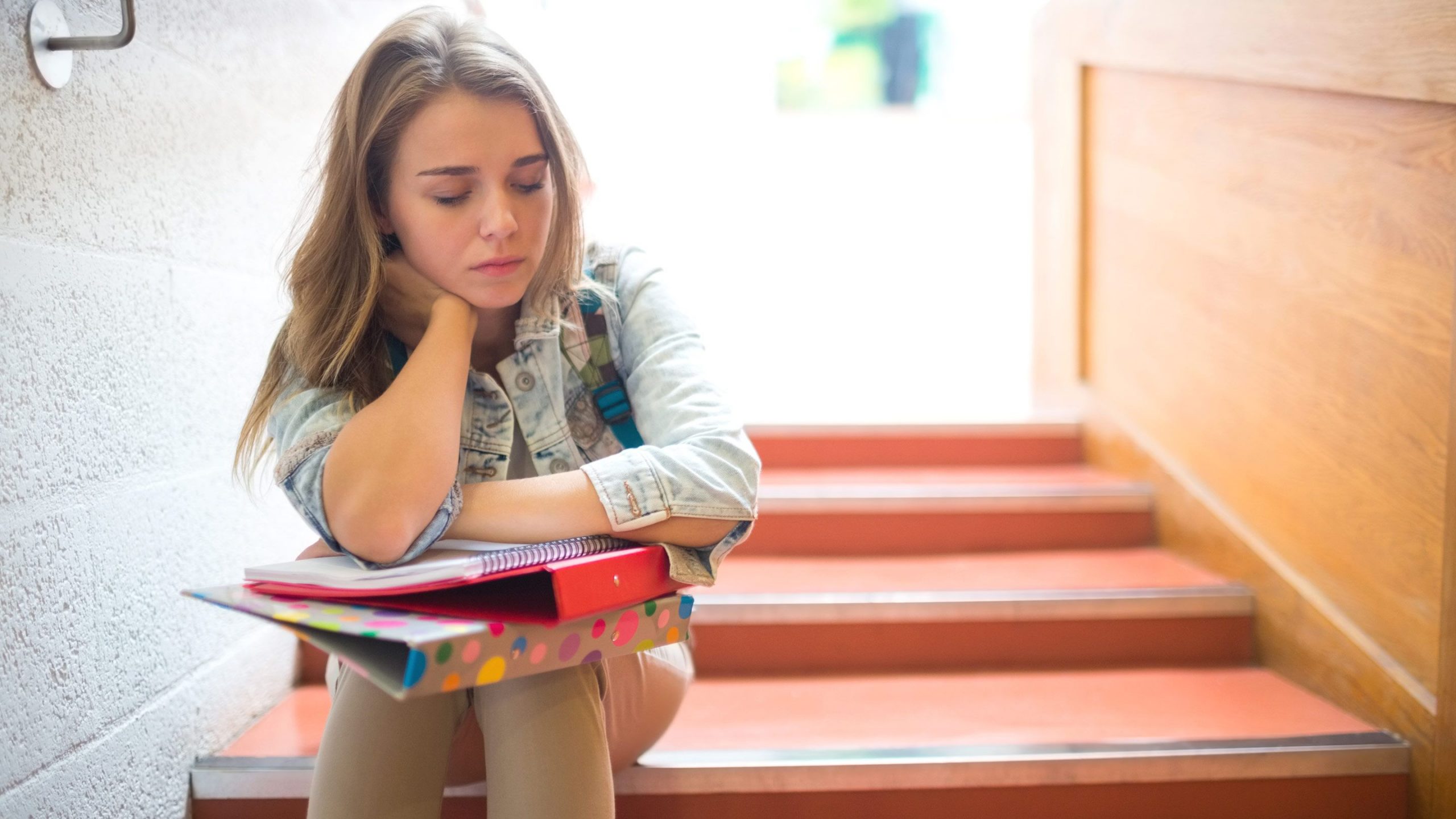
All educators are civics teachers. Teachers send messages to students about power, justice, and representation by the content we select, the way we engage student voice, the norms we employ, and the stories included in our classroom. We have a responsibility to prioritize our students’ lived experiences, putting Maslow before Bloom, to inform the essential questions we address in our curriculum. When violence or tragedy occurs, classrooms provide a safe venue for students to process, ask questions and be given context to understand current events as they happen.
While current events unfold, it is not the time to debate policy. Educators will not have all of the answers to the questions students pose. Teachers can create a classroom space where we can be present, listen, and create a safe environment for our students to do the same.
We are so excited to thank Nebraska teachers for all they have done for students this year!
April 2021 Newsletter
Educating for American Democracy Roadmap
From the Educating for American Democracy website:
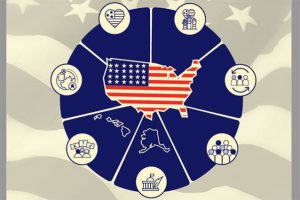 The aim of the Roadmap is to provide guidance that shifts content and instruction from breadth to depth by offering an inquiry framework that weaves history and civics together and inspires students to learn by asking difficult questions, then seeking answers in the classroom through facts and discussion for a truly national and cross-state conversation about civics and history to invigorate classrooms with engaging and relatable questions.
The aim of the Roadmap is to provide guidance that shifts content and instruction from breadth to depth by offering an inquiry framework that weaves history and civics together and inspires students to learn by asking difficult questions, then seeking answers in the classroom through facts and discussion for a truly national and cross-state conversation about civics and history to invigorate classrooms with engaging and relatable questions.
The Seven Content Themes map out the disciplinary and conceptual terrain, as well as the skills and dispositional learning needed to support healthy civic participation. The Five Design Challenges span the seven themes and state honestly and transparently some of the rich dilemmas that educators will encounter as they work with the content themes and instructional guidance.
Honest History Readers
From the Gibbs Smith Education website:
Welcome to your new go-to social studies resource. This is not your traditional textbook. Yes,
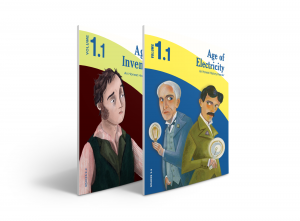
the history is there, presented in an accurate, unbiased way. But this diverse resource displays a variety of perspectives, stories, and events in a thematic way for students to connect to and engage with. In Honest History Readers students will study topics like independence, conservation, technology and innovation, international relations and more through the lenses of history, civics, culture, economy, and geography, and be able to see themselves in every volume.
Honest History Readers are a K-2 and 3-5 social studies program designed to engage and immerse students in thematic social studies content. Each set includes nine volumes a year, with additional sets available each year. Every volume can be purchased both in print, for a more hands-on experience, or on our digital platform for a more interactive experience, or both.
Nebraska Game and Parks
From the Nebraska Game and Parks website:
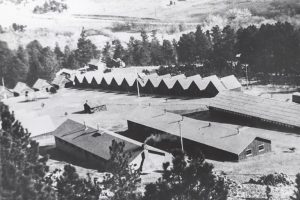 Celebrate 100 years of state park history from your classroom! These resources offer K–6 teachers the opportunity to integrate the Nebraska State Park Centennial into curricula, lessons and activities. Connect students with our state park system through fun activities that are aligned with state standards for learning.
Celebrate 100 years of state park history from your classroom! These resources offer K–6 teachers the opportunity to integrate the Nebraska State Park Centennial into curricula, lessons and activities. Connect students with our state park system through fun activities that are aligned with state standards for learning.
Explore the history of Nebraska’s oldest state park, Chadron State Park, and discover the people, legislation and improvement projects that make the park what it is today. Then think about important events in your life and build a timeline of your own.
Text Complexity Workshop
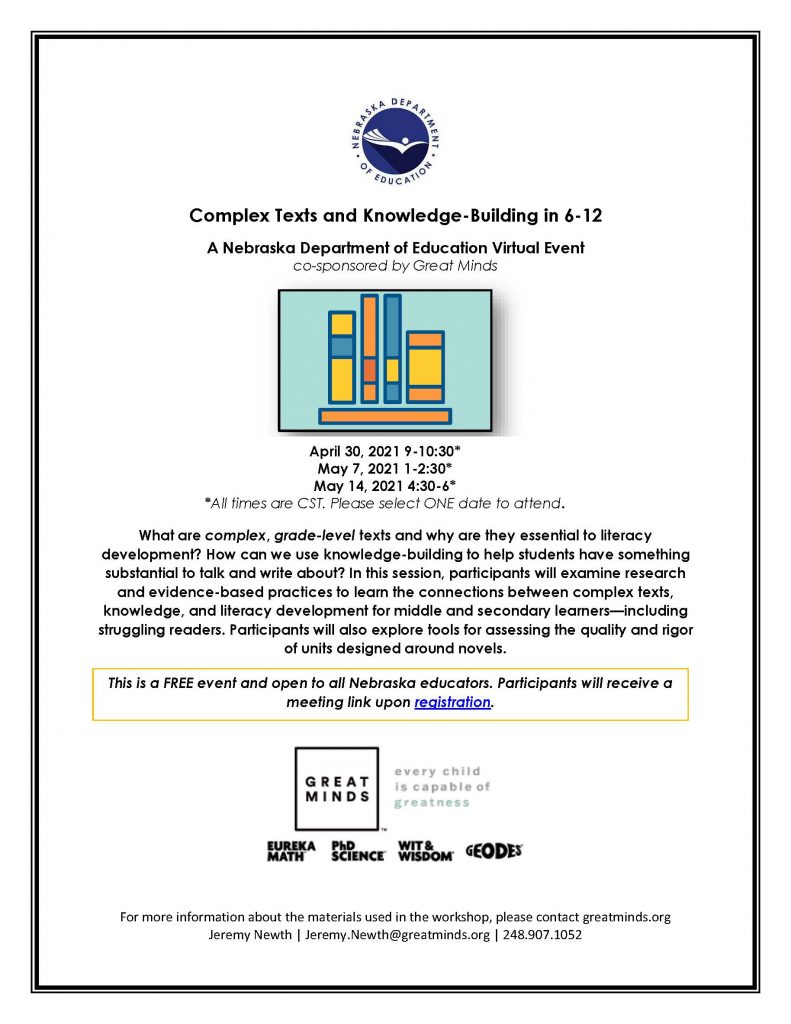
Integrating Primary and Secondary Sources into Teaching: The SOURCES Framework for Authentic Investigation
From the Integrating Primary and Secondary Sources into Teaching website:
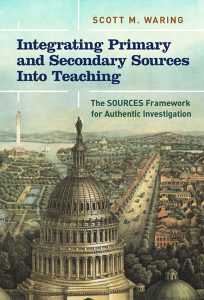
SOURCES Framework
Scrutinize the Fundamental Source(s)
Organize Thoughts
Understand the Context
Read Between the Lines
Corroborate and Refute
Establish a Plausible Narrative
Summarize Final Thoughts
It is essential for educators to provide students with various opportunities to engage with primary and secondary sources in an authentic and engaging manner that replicates that which is done by professionals in various fields of study (Waring, 2020). Through the use of the SOURCES Framework for Teaching with Primary and Secondary Sources, educators can properly scaffold the learning experience for students to allow them a more independent, inquiry-based approach. An added benefit of teaching students in this manner is that the skills and approaches that they employ throughout the process mirror those needed to effectively navigate various perspectives and opinions, including traditional and social media, with which they are confronted on a daily basis (NCSS, 2013).
As students move through the seven stages of the SOURCES framework, the SOURCES Analysis Sheet for use with primary and secondary sources is useful (example image), Additionally, educators will want to use the SOURCES Framework Analysis Sheet to help guide students through the investigation and each of the stages of the SOURCES framework.
ProCon.Org
From ProCon.Org website:
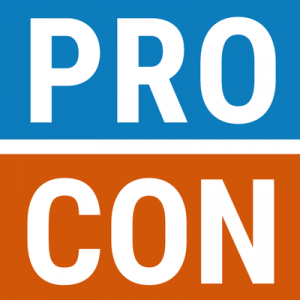 “To promote civility, critical thinking, education, and informed citizenship by presenting the pro and con arguments to debatable issues in a straightforward, nonpartisan, freely accessible way.”
“To promote civility, critical thinking, education, and informed citizenship by presenting the pro and con arguments to debatable issues in a straightforward, nonpartisan, freely accessible way.”
Through our website, ProCon.org, we serve as a non-biased information source for our users. We present sourced pros and cons of debatable issues, as well as a host of reference information relevant to those issues, thoroughly researched and compiled by our research staff and editors. We use the pro and con format because it achieves four objectives:
1. First, by exposing readers to both sides of an issue in a side-by-side format, we make it easier for them to see the difference in the facts and arguments offered by each side.
2. Second, our pro and con format creates what we call “beneficial confusion,” causing readers to struggle with well-presented opposing positions, and, therefore, to engage in evaluative thinking to formulate their own views. Readers who have a pre-existing view of an issue may feel more confident in their view, or they may change their view. In either case, many will recognize that the process of acquiring and critically evaluating information has a beneficial and satisfying effect on their decision-making.
3. Third, the format makes readers more confident and comfortable in discussing and debating their views with others, knowing what the “other side” may think.
4. Fourth, challenging readers to examine both sides of an issue tends to reduce the likelihood that they will resort to the “demonization” of those who hold opposing views.
The Redistricting Game
From The Redistricting Game website: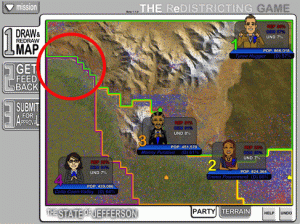
The Redistricting Game is designed to educate, engage, and empower citizens around the issue of political redistricting. Currently, the political system in most states allows the state legislators themselves to draw the lines. This system is subject to a wide range of abuses and manipulations that encourage incumbents to draw districts which protect their seats rather than risk an open contest.
By exploring how the system works, as well as how open it is to abuse, The Redistricting Game allows players to experience the realities of one of the most important (yet least understood) aspects of our political system. The game provides a basic introduction to the redistricting system, allows players to explore the ways in which abuses can undermine the system, and provides info about reform initiatives – including a playable version of the Tanner Reform bill to demonstrate the ways that the system might be made more consistent with tenets of good governance. Beyond playing the game, the web site for The Redistricting Game provides a wealth of information about redistricting in every state as well as providing hands-on opportunities for civic engagement and political action.
Geography Games by Sheppard Software
From the Geography Games website:
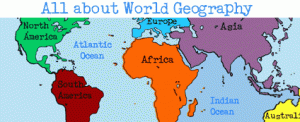 We create content and games for our website with these goals:
We create content and games for our website with these goals:
1) To add sound and visual effects to make learning fun and more memorable.
2) To design games with many difficulty levels so that players will continue to be challenged no matter how far they progress.
3) To provide games that will exercise players’ brains
Resources for Teaching Asian American Identity and History
The recent increase in anti-Asian attacks and the violent death by gun of six Asian women in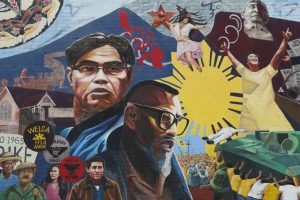 Georgia on March 17th, has generated discussion and resources in support of the Asian American community. Classroom discussions after violent tragedies like this or the mass shooting in Boulder, Colorado should be handled carefully. Current journalistic practice is to focus on the lives and experiences of the victims, presenting a fully humanizing picture of their lives. Good social science practice should include both the challenges faced by Asian Americans confronting a long history of racism and discrimination, as well as the achievements and contributions of Asian Americans to the culture and history
Georgia on March 17th, has generated discussion and resources in support of the Asian American community. Classroom discussions after violent tragedies like this or the mass shooting in Boulder, Colorado should be handled carefully. Current journalistic practice is to focus on the lives and experiences of the victims, presenting a fully humanizing picture of their lives. Good social science practice should include both the challenges faced by Asian Americans confronting a long history of racism and discrimination, as well as the achievements and contributions of Asian Americans to the culture and history
of the United States.
Below are resources created by national organizations and resources with specific connections to Nebraska history.
Council of Korean Americans: #StopAsianHate
Learning For Justice: After Atlanta: Teaching Asian American Identity and History Asian
Americans in the People’s History of the United States
A History of Omaha’s Chinatown
Asian Community and Cultural Center
Zoom In U.S. History Lessons
From the Zoom In website:
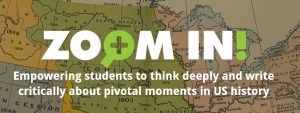 Zoom In is a free, Web-based platform that helps students build literacy and historical thinking skills through “deep dives” into primary and secondary sources.
Zoom In is a free, Web-based platform that helps students build literacy and historical thinking skills through “deep dives” into primary and secondary sources.
Zoom In’s online learning environment features 18 content-rich U.S. history units that supplement your regular instruction and help you use technology to support students’ mastery of both content and skills required by the new, higher standards:
● Reading documents closely and critically
● Identifying author’s point of view and purpose
● Engaging in higher-order, text-based discussions
● Writing explanatory and argumentative essays grounded in evidence
Checkology
From the Checkology website: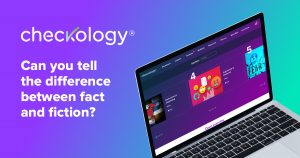
Checkology’s lessons and other resources show you how to navigate today’s challenging information landscape. You will learn how to identify credible information, seek out reliable sources, and apply critical thinking skills to separate fact-based content from falsehoods.
Checkology gives you the habits of mind and tools to evaluate and interpret information. And you gain an understanding of the importance of the watchdog role of the press.
TedEd
From the TedEd website:
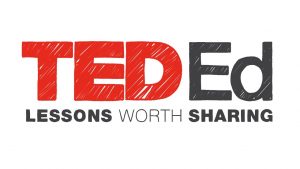 TED-Ed is TED’s youth and education initiative. TED-Ed’s mission is to spark and celebrate the ideas of teachers and students around the world. Everything we do supports learning — from producing a growing library of original animated videos , to providing an international platform for teachers to create their own interactive lessons, to helping curious students around the globe bring TED to their schools and gain presentation literacy skills, to celebrating innovative leadership within TED-Ed’s global network of over 650,000 teachers. TED-Ed has grown from an idea worth spreading into an award-winning education platform that serves millions of teachers and students around the world every week.
TED-Ed is TED’s youth and education initiative. TED-Ed’s mission is to spark and celebrate the ideas of teachers and students around the world. Everything we do supports learning — from producing a growing library of original animated videos , to providing an international platform for teachers to create their own interactive lessons, to helping curious students around the globe bring TED to their schools and gain presentation literacy skills, to celebrating innovative leadership within TED-Ed’s global network of over 650,000 teachers. TED-Ed has grown from an idea worth spreading into an award-winning education platform that serves millions of teachers and students around the world every week.
National Register Database and Research
From the National Register Database and Research website: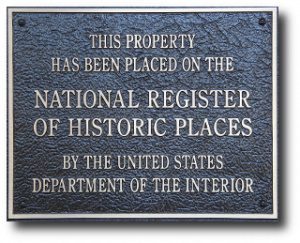
The National Register of Historic Places is the official list of the Nation’s historic places worthy of preservation. Authorized by the National Historic Preservation Act of 1966, the National Park Service’s National Register of Historic Places is part of a national program to coordinate and support public and private efforts to identify, evaluate, and protect America’s historic and archeological resources.
Entrepreneurship in Your Community: Creating Your Own Career
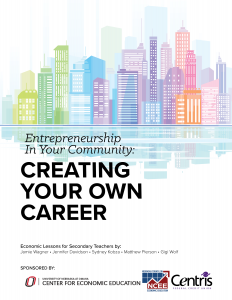 Created by UNO Center for Economic Education and social studies educator Matt Pierson of Bryan High School in Omaha, the Entrepreneurship Guide is targeted for middle and high school teachers to teach entrepreneurship. The guide can be used in its entirety for a semester-long course or it can be used to supplement resources that a teacher already uses. It is tied to the National Voluntary Standards in Economics and the National Financial Literacy standards. Additionally, each lesson is linked to the Nebraska Social Studies and BMIT standards throughout. It is free to use and download and has accompanying slides for teachers.
Created by UNO Center for Economic Education and social studies educator Matt Pierson of Bryan High School in Omaha, the Entrepreneurship Guide is targeted for middle and high school teachers to teach entrepreneurship. The guide can be used in its entirety for a semester-long course or it can be used to supplement resources that a teacher already uses. It is tied to the National Voluntary Standards in Economics and the National Financial Literacy standards. Additionally, each lesson is linked to the Nebraska Social Studies and BMIT standards throughout. It is free to use and download and has accompanying slides for teachers.
Effective entrepreneurship requires that students have a keen understanding of the ways in which individuals, businesses, governments, and societies make decisions to allocate human capital, physical capital, and natural resources among alternative uses. This is part of the economic reasoning process and involves the consideration of costs and benefits with the ultimate goal of making decisions that will enable individuals, businesses, and societies to be as well-off as possible. The study of entrepreneurship provides students with the concepts and tools necessary for an economic way of thinking and helps them understand the interaction of buyers and sellers in markets everywhere. Economic reasoning and skillful use of economic tools draw upon a strong base of knowledge about human capital, land, investments, money, income and production, taxation, all of which are essential to being a successful entrepreneur.
A More Perfect Union: Teaching the American Revolution and Beyond
From the National History Day website: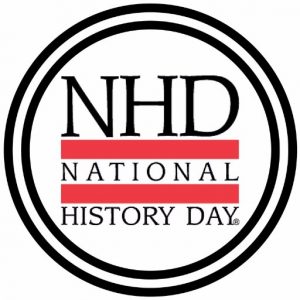
National History Day is partnering with the National Endowment for the Humanities to commemorate the semiquincentennial of the United States. Together, NEH and NHD will create classroom materials that highlight different perspectives on the American Revolution, early American republic, and the continued efforts to create a more perfect union throughout the nineteenth and twentieth centuries.
These classroom resources will help teachers engage students with unique primary sources and themes of democracy and citizenship throughout United States history.
April is Financial Literacy and National Poetry Month
Listed below are links to resources that will help you teach about financial literacy and using poetry in social studies.
Financial Literacy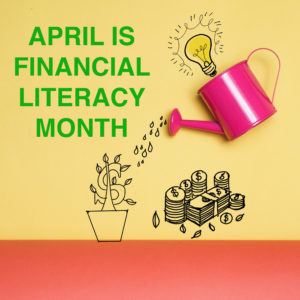
Poetry and Social Studies
Niobrara National Scenic River: Ever-Changing Currents Mini-Lesson
Poetry for Social Studies: Poems, Standards, and Strategies
March 2021 Newsletter
Nebraska Historical Markers

Example of a Nebraska History Marker.
Happy Nebraska Statehood Day! On March 1, 1867, Nebraska officially became the 37th state of this nation’s union.
From the History Nebraska website:
Our Explore Nebraska History app is the easiest way to find Nebraska Historical Markers in your area or access marker information from afar. You can download it on the App Store or Google Play. There is also a desktop version.
Women’s History Month Resources
It’s March and that also means that it is Women’s History Month. Women’s History Month had its origins as a national celebration in 1981 when Congress passed an act which authorized and requested the President to proclaim the week beginning March 7, 1982 as “Women’s History Week.” Throughout the next five years, Congress continued to pass joint
resolutions designating a week in March as “Women’s History Week.” In 1987 after being petitioned by the National Women’s History Project, Congress passed another additional legislation which designated the month of March 1987 as “Women’s History Month.” Below is a list of resources for Nebraska Educators to access and use lessons relating to Women’s History Month.

- WomensHistoryMonth.gov (For Teachers)
- Learning for Justice – “A More Complete Women’s History”
- UN Women – “Timeline: Women of the World Unite”
- Scholastic – Women’s History Month: A Collection of Teaching Resources
- Anti-Defamation League – Women’s History Month Resources
- PBS NewsHour Extra – Women’s History Month Resources
- National Women’s History Museum – Digital Resources
60 Seconds Civics
From 60 Seconds Civics website:
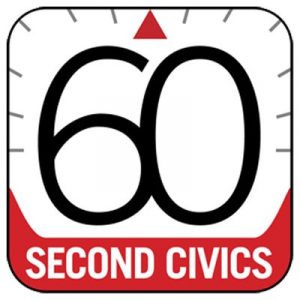 60-Second Civics is a daily podcast that provides a quick and convenient way for listeners to learn about our nation’s government, the Constitution, and our history. The podcast explores themes related to civics and government, the constitutional issues behind the headlines, and the people and ideas that formed our nation’s history and government.
60-Second Civics is a daily podcast that provides a quick and convenient way for listeners to learn about our nation’s government, the Constitution, and our history. The podcast explores themes related to civics and government, the constitutional issues behind the headlines, and the people and ideas that formed our nation’s history and government.
60-Second Civics is produced by the Center for Civic Education. The show’s content is primarily derived from the Center’s education for democracy curricula, including We the People: The Citizen and the Constitution, Foundations of Democracy, and Elements of Democracy.
Teaching About Food and Agriculture Using Web Mapping Tools and Spatial Data (Journal Article)
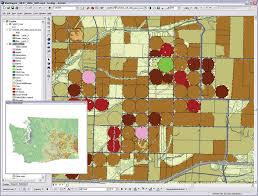
Example of what food and agricultural web mapping using spatial tools could look like.
From the article Abstract:
Food and agriculture as geographic subjects connect well with climate, weather, river systems, landforms, and the politics and resources inherent in irrigation or draining the land, biodiversity, agricultural methods, customs, cultural history and change, technological development, population and immigration, and other topics. Teaching and learning about food and agriculture in an effective, engaging manner is enriched through the use of web mapping tools and spatial data. These tools, enabled by the advent of cloud-based Geographic Information Systems (GIS) technology, bring problem solving, critical thinking, and spatial analysis to every classroom instructor and student.
OpenSocialStudies.org
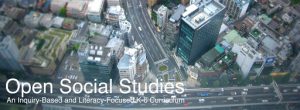 Open Social Studies (formerly called Understanding Our World), is an inquiry-based and literacy-focused K-6 social studies curriculum. It is free and open source.
Open Social Studies (formerly called Understanding Our World), is an inquiry-based and literacy-focused K-6 social studies curriculum. It is free and open source.
Starting in the early elementary grades, all children should receive regular instruction in the social studies, which includes history, civics, geography, and economics. However, there are real pressures on schools and teachers to increase the amount of instruction in other subject areas, which often comes at the expense of their social studies time.
This curriculum was built to help teachers in K-6 schools regularly enact powerful and authentic social studies in their classrooms that will also meet essential literacy goals (linking every lesson to the Common Core State Standards). In other words, it leverages the richness of social studies content to help students learn to read, write, and think critically while exploring the past and present world around them. Moreover, it aims to make every single lesson culturally relevant, connecting to the racial, ethnic, gender, class, language, and immigration experience of the increasingly diverse United States.
Making Inquiry Possible
From the Making Inquiry Possible website: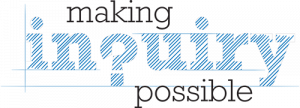
In two short introductory films, we lay the groundwork for inquiry-based instruction in social studies classrooms and outline the origins of the Making Inquiry Possible (MIP) project, preview the films that are featured on this site, and orient the viewer to the professional learning resources available to support educators in making inquiry possible in their own classrooms and districts.
In Part 1, Dr. Kathy Swan tackles the foundational question: Why inquiry? In Part 2, Dr. Kathy Swan answers the project question: What is the Making Inquiry Possible project?
Loper Business Invitational
We the People Teacher Summer Institute
Open Ended Social Studies
From the Open Ended Social Studies website:
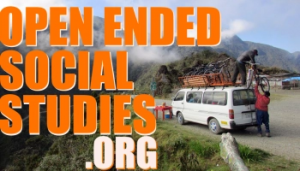 Lesson plans to foster a sense of wonder about the world and our place in it!
Lesson plans to foster a sense of wonder about the world and our place in it!
An Open Ended History is a free online history textbook adapted and expanded upon from open sources. Its chapters are designed to address most state standards, splitting the difference between overarching themes, concise summary, and the kinds of vivid, personal details that make history memorable to the average student. Please use and share freely – to supplement or replace what you have at hand.
NCSS Advocacy Toolkit
From the NCSS website: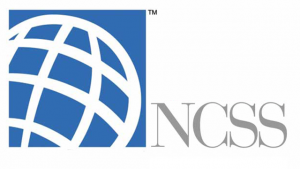
The NCSS Advocacy Toolkit is an educational resource and planning tool of the National Council for the Social Studies that has been created and developed for non-profit educational and research purposes with the objective of advocating for social studies education. The Toolkit can be freely used for these non-profit purposes.
The Toolkit includes links to materials that may be copyrighted, and the Toolkit makes fair use of these materials for educational purposes. Those who wish to use any of these materials for purposes that go beyond fair use should obtain permission from the copyright owner.
American Indians in Children’s Literature (AICL)
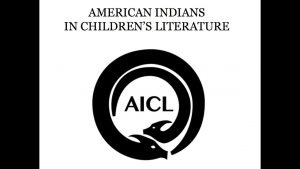
From the American Indians in Children’s Literature website:
A primary purpose of American Indians in Children’s Literature (AICL) is to help you know who Native people are. That knowledge can help you understand why Native people object to being misrepresented. Though we are certain that no author ever sets out to deliberately misrepresent Native people, it happens over and over again. Information is the only way to counter those misrepresentations. On American Indians in Children’s Literature, we publish analyses of children’s books, lesson plans, films, and other items related to the topic of American Indians and/or how this topic is taught in school.
2021 Economic Virtual Professional Development
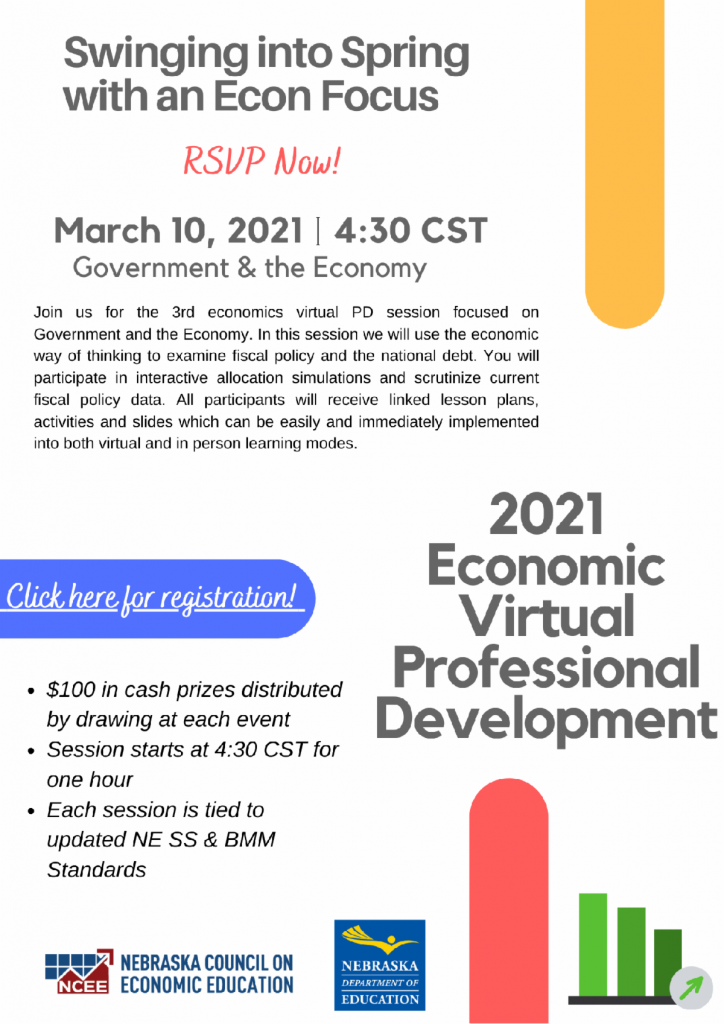
February 2021 Newsletter
Gilder Lehrman National History Teacher of the Year Award
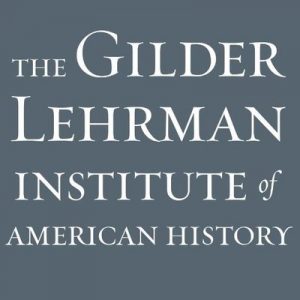
From the Gilder Lehrman website:
Nominations and applications for the Gilder Lehrman 2021 National History Teacher of the Year Award are now open. The 2021 award will honor exceptional elementary and secondary school teachers. Eligible generalist and specialist teachers in each of the 50 states, the District of Columbia, Department of Defense schools, and US Territories are encouraged to apply.
Any full-time educator of grades K–12 who teaches American history (including state and local history) is eligible for consideration. American history may be taught as an individual subject or as part of other subjects, such as social studies, reading, or language arts.
- The nominated teacher must have at least three years of classroom teaching experience.
- Nominees must be planning to teach for at least one year following the award year.
- Past state and national winners are not eligible.
- Self-nominations are not accepted.
Deadline for 2021 nominations: April 30, 2021
Deadline for 2021 nominees to submit supporting materials: May 30, 2021
Black History Month Resources
Happy Black History Month! If you are looking for resources and lesson plans to commemorate Black history in your classroom, check out the links below!
- The National Museum of African American History and Culture has a collection of resources
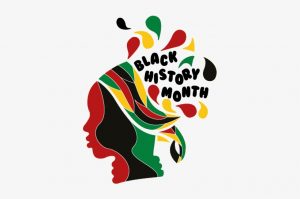 for Celebrating Black History Month.
for Celebrating Black History Month. - Time magazine published an article called “How Black Lives Matter Is Changing What Students Learn During Black History Month.”
- Facing History and Ourselves has a Black History Month Resource Collection.
- Share My Lesson has a robust collection of Black History Month lesson plans and resources.
- We Are Teachers printed an article titled “33 Black History Month activities for February and Beyond.”
- Scholastic provides 13 ways to celebrate Back History Month with ideas for 3rd-12th grade classrooms.
- Teaching Tolerance has several resources for Black History Month including this article: “Teaching the Complete History.”
We The Student Scholarship Contest
From the Bill of Rights Institute website:
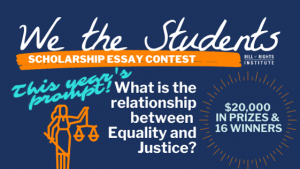
What better time is there than now to reflect on the meaning of equality and justice in our world today? Encourage your students to enter this year’s We the Students essay contest.
Essay Prompt: What is the relationship between Equality and Justice?
Answering this question requires considering each of these principles and analyzing the relationship between them. To truly explore this question in an essay that is between 500 -800 words, you’ll need to go beyond “dictionary definitions,” and express your understanding and reasoning about the connection between these two principles. This reasoning involves a combination of observation, experience, and some pretty “big ideas.” What does it take to understand them? To build toward and maintain them? To see them with regard to each other? Why is this relationship important?
We encourage you to bring emotion, creativity, specific examples, and well-researched facts into what you write. A good essay will demonstrate how equality and justice are not just abstract ideas but are part of the actions and choices of people every day. We genuinely want to know how you would answer the question – what is the relationship between Equality and Justice?
Deadline for entry is April 15, 2021 at 11:59 p.m. PT.
Native Indigenous Centered Education Program Virtual Storytelling

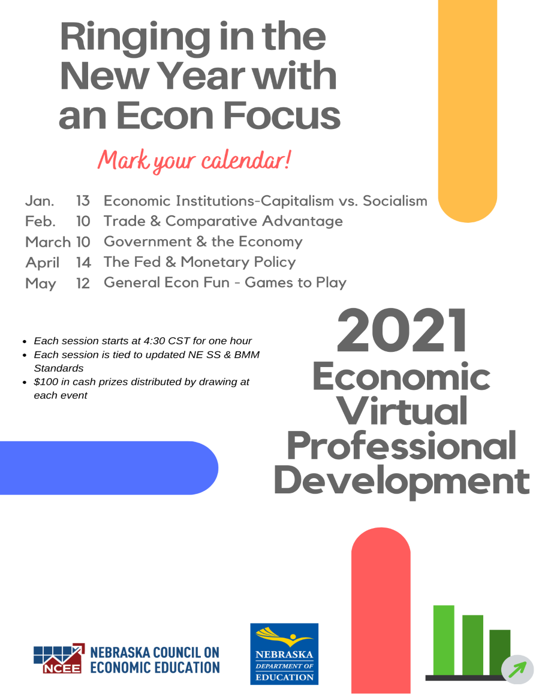
EVERFI and NEST
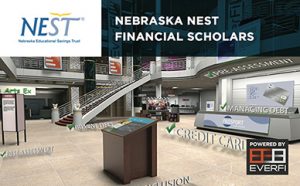 How are your teachers meeting the Nebraska Economic Standards? EVERFI and NEST are offering schools the opportunity to host a virtual workshop where EVERFI will present an economic lesson and will help your students get signed up to use Vault. With this being an updated course and key initiative for EVERFI, we’re offering a $10 Amazon Gift Card incentive for opening your classroom to us. Vault is for grades 4-6 and is offered at no-cost through the NEST sponsorship.
How are your teachers meeting the Nebraska Economic Standards? EVERFI and NEST are offering schools the opportunity to host a virtual workshop where EVERFI will present an economic lesson and will help your students get signed up to use Vault. With this being an updated course and key initiative for EVERFI, we’re offering a $10 Amazon Gift Card incentive for opening your classroom to us. Vault is for grades 4-6 and is offered at no-cost through the NEST sponsorship.
Bonus:
Four lucky teachers will receive a DonorsChoose gift card for their class. To be eligible you must use one of the five online lessons within Vault with students on or before March 15. Winners will be announced during Financial Literacy Month!
Contact Heather Miller, hmiller@everfi.com or Erica Hart, ehart@everfi.com for more information or to schedule your classroom virtual lesson.
Civics in Real Life
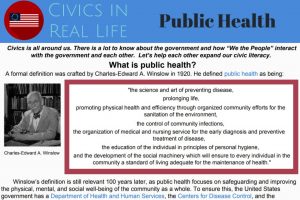
From Civics in Real Life’s website:
The Florida Joint Center for Citizenship, in partnership with Civics Renewal Network and Teaching for Democracy Alliance have created “Civics in Real Life”. Civics is all around us. There is a lot to know about the government and how “We the People” interact with the government and each other. Let’s help each other expand our civic literacy. Concise resources to explore civics concepts connected to current events. Click, Download, and Go—Updated weekly!
TheFire.Org
From TheFire.Org website:
 The Foundation for Individual Rights in Education’s mission is to defend and sustain the individual rights of students and faculty members at America’s colleges and universities. These rights include freedom of speech, freedom of association, due process, legal equality, religious liberty, and sanctity of conscience—the essential qualities of liberty. FIRE educates students, faculty, alumni, trustees, and the public about the threats to these rights on our campuses, and provides the means to preserve them.
The Foundation for Individual Rights in Education’s mission is to defend and sustain the individual rights of students and faculty members at America’s colleges and universities. These rights include freedom of speech, freedom of association, due process, legal equality, religious liberty, and sanctity of conscience—the essential qualities of liberty. FIRE educates students, faculty, alumni, trustees, and the public about the threats to these rights on our campuses, and provides the means to preserve them.
Reach the World
From the Reach the World website:
 All youth need a global network to help them activate their own global journeys through work and life. All schools need to prepare students for a world where global collaboration and cooperation is the norm. Combating the ignorance that breeds fear and intolerance begins with young people. Reach the World transforms the energy of travelers into a learning resource for K-12 classrooms. Our programs use the web, messaging and video conferencing to connect youth with travelers in one-on-one global, virtual exchanges. Our nationwide network of educators, travelers and volunteers are building a more thoughtful and welcoming society by sharing the eye-opening benefits of travel with the youth of today, who will be the decision-makers of tomorrow.
All youth need a global network to help them activate their own global journeys through work and life. All schools need to prepare students for a world where global collaboration and cooperation is the norm. Combating the ignorance that breeds fear and intolerance begins with young people. Reach the World transforms the energy of travelers into a learning resource for K-12 classrooms. Our programs use the web, messaging and video conferencing to connect youth with travelers in one-on-one global, virtual exchanges. Our nationwide network of educators, travelers and volunteers are building a more thoughtful and welcoming society by sharing the eye-opening benefits of travel with the youth of today, who will be the decision-makers of tomorrow.
Holocaust by Bullets in the Occupied Soviet Territories
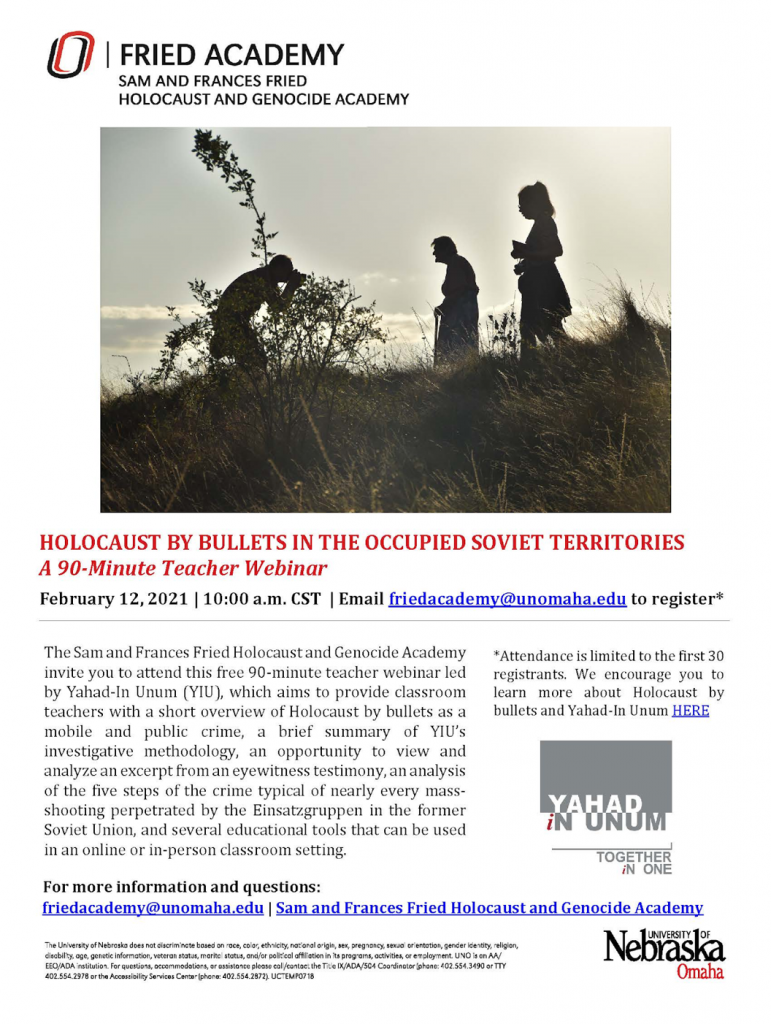
World Food Prize Nebraska Youth Institute
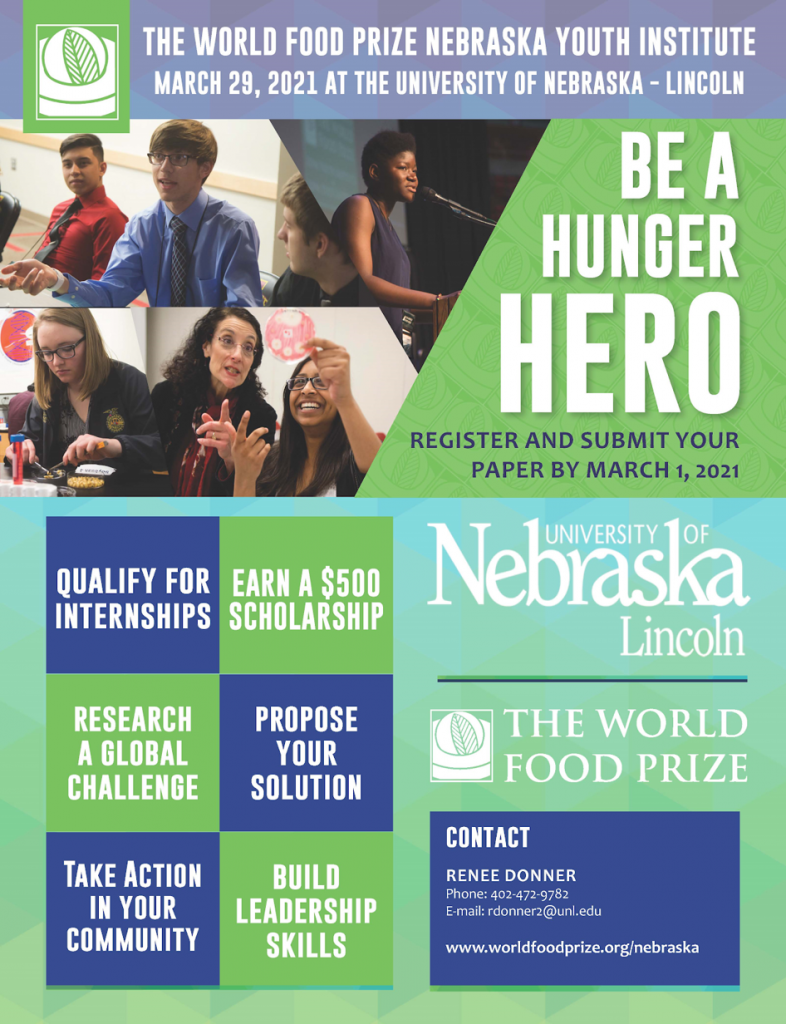
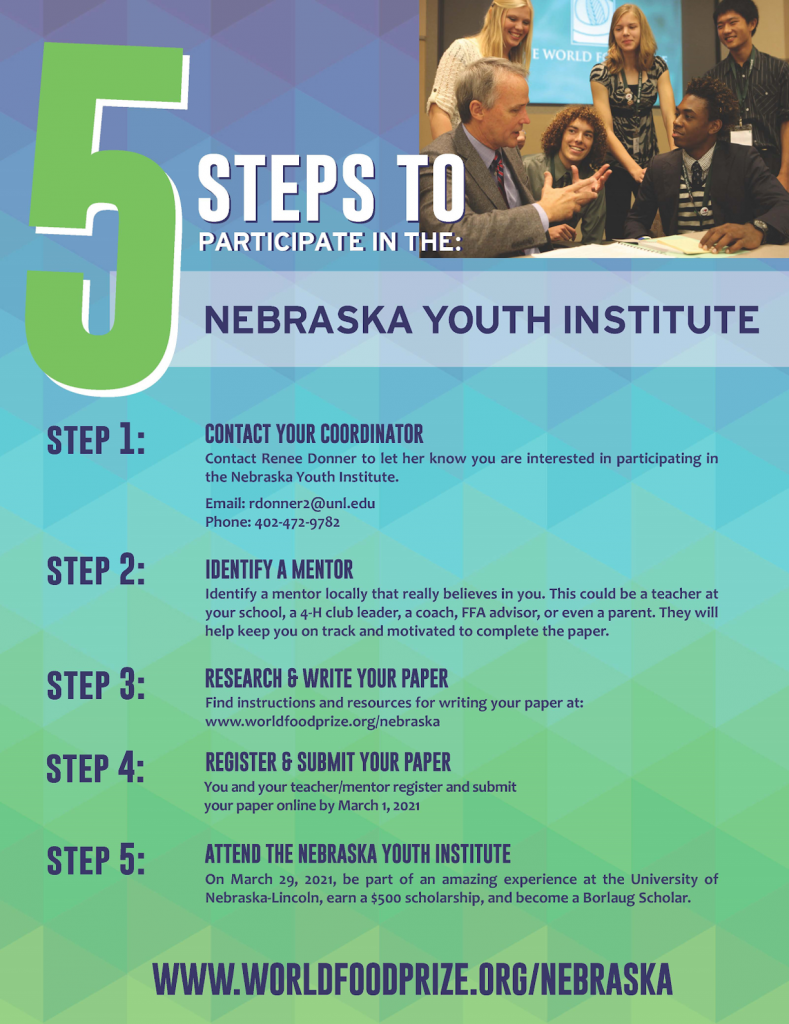
British History Online
From the British History Online website:
British History Online is a collection of nearly 1300 volumes of primary and secondary content relating to British and Irish history, and histories of empire and the British world. BHO also provides access to 40,000 images and 10,000 tiles of historic maps of the British Isles.
We are making all of our transcribed content free until 30 April. This is a contribution to the work of researchers, teachers and students while library and archive access is difficult or impossible.
American Alliance of Museums – Distance Learning Repository
From the American Alliance of Museums website: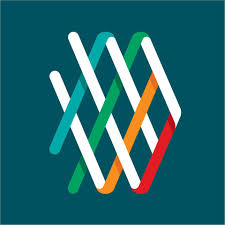
With children and learners out of school, learning hybrid and in other unexpected situations, museums across the continent have come together to share their distance learning with you. Use the pull-down filters to find the best programs and resources for your needs.
As of October 1, 2020, there are more than 1,000 resources or experiences listed in this repository, representing sites across the United States and in Canada, Argentina and Mexico, including eight languages and American Sign Language.
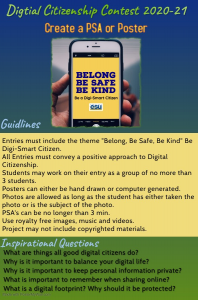
Digital Citizenship Contest
The Nebraska ESUs are excited to announce a Digital Citizenship Contest: Belong, Be Safe, Be Kind, Be a Digi Smart Citizen. Students have the option to create a poster or PSA (public service announcement) that showcases how to Belong, Be Safe, Be Kind, Be a Digi Smart Citizen. All entries must be original creations and must be compliant with the established guidelines. Deadline will be mid-March, 2021.
History of Valentine’s Day
From the History Channel website: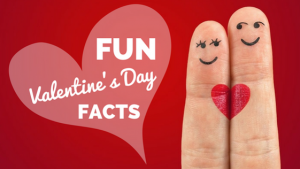
“Valentine’s Day occurs every February 14. Across the United States and in other places around the world, candy, flowers and gifts are exchanged between loved ones, all in the name of St. Valentine. But who is this mysterious saint and where did these traditions come from? Find out about the history of Valentine’s Day, from the ancient Roman ritual of Lupercalia that welcomed spring to the card-giving customs of Victorian England.” Select the link above to read and find out more!
Valentine’s Day Fun Facts! from the good people at Good Housekeeping. You see what I did there?!



